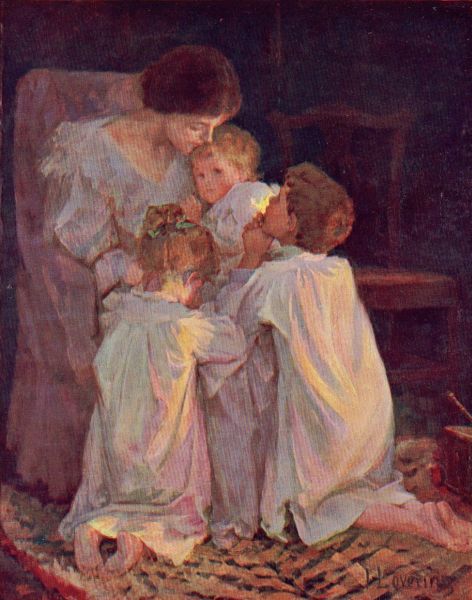
MOTHERHOOD.
After the Picture by Miss Ida Lovering.]

MOTHERHOOD.
After the Picture by Miss Ida Lovering.]

By the Author of "The Child Wives and Widows of India," Etc.
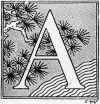
A garrison of snow-capped mountains; a valley smiling in Oriental luxuriance; the gorgeous, romantic loveliness described in "Lalla Rookh"—such are the general impressions of the land of Kashmir. Dirt, disease, and degradation summed up its prevailing characteristics in the eyes of an Englishman, who, in October, 1872, toiled wearily over the Pir Panjal, 11,900 feet above the level of the sea.
This was Dr. Elmslie's last journey. He hardly realised, as he dragged his weary limbs over rough but familiar paths, that one object for which he had struggled for years was practically accomplished. He sank from exhaustion on the way, and the day after his death Government granted permission for missionaries to spend the winter in the Valley of Kashmir. Still farther was he from knowing of another result of his labours. He had appealed to Englishwomen to bring the gifts of healing to suffering and secluded inmates of zenanas. Dr. Elmslie had found a direct way to the hearts of prejudiced heathen men. The sick came to him for healing, and learnt the meaning of his self-denying life.
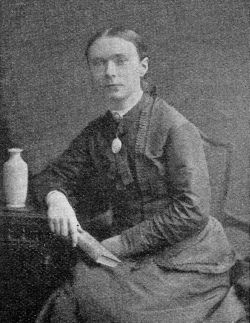
(Photo: Elliott and Fry.)
THE LATE DR. FANNY BUTLER.
(At the time she went to India.)
"Skin for skin, yea, all that a man hath will he give for his life," are ancient words of wisdom; but this rule has exceptions. To Hindu women, at least, caste is dearer than life. It would be as easy to restore the down to a bruised butterfly's wing as to give back self-respect, and with it all that makes life worth living, to a zenana lady who has been exposed to the gaze or touch of a man other than a near relation. Custom of the country debars a respectable woman from receiving ministry to body, soul, or mind, unless it comes from one of her own sex. Dr. Elmslie's appeal resulted in Miss Fanny Butler's offer of service to the Indian Female Normal School and Instruction Society. She was the first enrolled student of the London School of Medicine, which had just been[98] transferred from Edinburgh, and passed second out of one hundred and twenty-three candidates, one hundred and nineteen of whom were men, in the Preliminary Arts Examination. She went to India in October, 1880, the first fully qualified medical missionary to women.
Seventeen years after Dr. Elmslie's death Dr. Fanny Butler obtained another concession for Kashmir, the permission for missionaries to live within the city of Srinagar. She saw the foundations of a new hospital for women begun within the city, and fourteen days after she also laid down what, an hour before her death, she described as a "good long life," in the service of Kashmiri people. The age of thirty-nine, she said to the friends who surrounded her, and who felt that she of all others could not be spared, was "not so very young to die," and she sent an earnest plea to the Church of England Zenana Society, the division of the old society to which she belonged, to send someone quickly to take her place. The new hospital was the gift of Mrs. Bishop (Miss Isabella Bird) in memory of her husband. She had seen the dirty crowd of suffering women at the dispensary door overpower two men, and the earliest arrivals precipitated head foremost by the rush from behind, whilst numbers were turned away in misery and disappointment.
Hospitals and dispensaries have rapidly increased since the day of pioneers. Absolute necessity has forced medical work on many missionaries in the field. The most elementary knowledge of nursing and hygiene appears miraculous to women sunk in utter ignorance. A white woman too modest to give them remedies for every ailment is usually regarded as unkind. A neglected missionary dispensary is practically unknown.
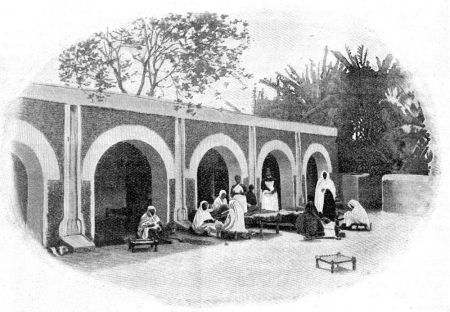
(Photo supplied by the Church of England Zenana Missionary Society.)
OUTSIDE THE VERANDAH OF THE WOMEN'S HOSPITAL AT TARN TARAN.
(Showing some of the patients placed out to spend the hot night in the open.)
At the time when the Countess Dufferin started her admirable scheme for providing medical aid for Indian women a[99] well-known Anglo-Indian surgeon stated publicly that, whatever other qualification was required in a candidate, two were absolutely necessary: she must be a lady in the highest sense of the word, and she must be a Christian, and he proceeded to give good reasons for what he said. The experience of every woman who has taken up this work would bear out his sentiments. Without courtesy and ready intuition of the feelings of others it would be hard to get an entrance into zenanas, and nothing but love and devotion to her Master would enable a woman to persevere in spending her life amongst sick heathen women, in spite of sights, scenes, and vexations beyond conception in England.
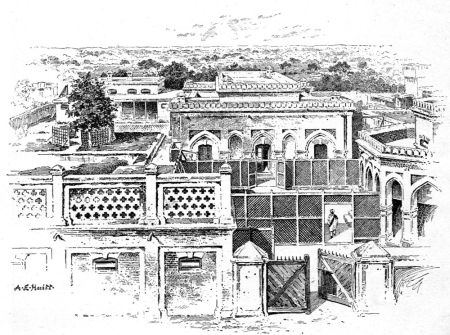
(From a Photograph.)
THE DUCHESS OF CONNAUGHT'S HOSPITAL, PESHAWUR.
The greatest difficulties are probably met in high-caste zenanas. There, in the midst of unhealthy surroundings, the friends and neighbours have grand opportunities of undoing any good that may have been accomplished. It is grievous to a medical missionary to find her fever patient dying from a douche of cold water, because the white woman has defiled her high caste by feeling her pulse. It is enough to make her give up a case in despair if, after she has explained that quiet is absolutely necessary, the friends and neighbours decide that the evil spirit supposed to be in possession must be driven out by the music of tom-toms. A Hindu man is said to "sin religiously," and a Hindu woman excels him in devotion to her creed. A fever patient in the Punjab refused to drink milk—the one thing of all others that her medical woman ordered her—because she said, if it were the last thing she swallowed, her soul would pass into the body of a cobra. One medical missionary found a woman, who was in a critical state, lying on a mat, whilst an old woman, supposed to be learned in sickness, stood on her body, or patrolled up and down like a sentinel, as far as the length would admit. This was kindly meant. Another found one suffering seriously from the effect of a linseed poultice. She had carefully explained the mysteries of making and applying it, but in her absence the patient's friends had spread dry linseed over her chest and poured boiling water over it.
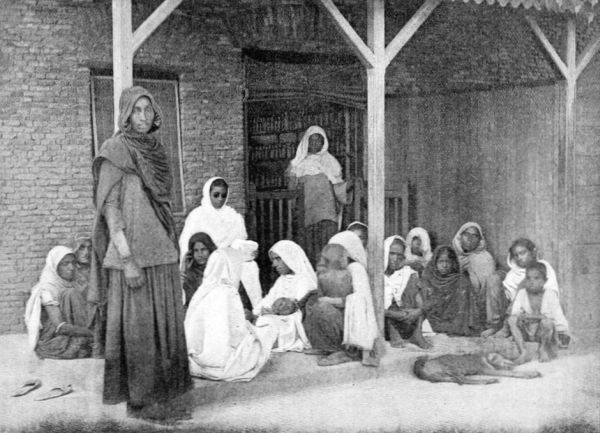
(Photo: Baness Bros.)
WAITING THEIR TURN.
(Patients outside the Tarn Taran Hospital Dispensary.)
Happily, all the women in India are
[101]
not secluded in zenanas. By far the
largest proportion live in the villages,
but their notions of propriety are very
strict. The hard-working field-women
will hide themselves on the suspicion
of a sahib being within reach. When
once they are satisfied that the visitor
belongs to their own sex and is harmless,
crowds beset the missionary encampments.
Many tales of suffering are
poured into sympathising ears.
"I am blind from crying for my only son" is not an infrequent complaint. Nothing can be done in this case.
"There is no god or goddess to love a Hindu woman. Whatever offerings we make her, the goddess of small-pox smites us, and then the men say the women have not offered enough, and are angry." This was the reply of a Punjabi woman, who spoke for her friends and neighbours.
One Bengali woman told a missionary of the death of a precious baby boy. There did not seem much the matter, but the hakim (a native quack) first gave him something burning to swallow, and then applied a red-hot iron to each side in turn; and the child only drew one or two breaths after this treatment. This also, one hopes, was kindly meant. The Hindus are by no means wanting in humanity, but ignorance is often as fatal as cruelty.
Many patients find an excuse for coming again and again to the dispensaries. There they hear of blessings in this world and the next which they say seem too good to be true. They see love shining in the earnest faces, and feel it in the touch of hands that will not shrink from dressing repulsive sores.
The majority of cases in dispensaries are ordinary fevers or skin diseases resulting from dirt, and other scourges that follow defiance of elementary rules of health.
Patients discharged as cured often return. "Tell me again that Name that I can say when I pray," one of them asked, to explain the reappearance of her shrivelled old face; "I forget so soon." And she went on her way repeating the Name that even some of the heathen realise must be exalted above all others.
"I know that your Jesus must reign over our land," a Punjabi woman said to a lady who had opened a dispensary at Tarn Taran, a sacred city of the Sikhs; "I know it, because your religion is full of love and ours has none at all."
The mission hospital at this city, with the name which literally means "The Place of Salvation," and the dispensary seen in the illustration, came mainly into being through the determination of the inhabitants. A suffering baby might claim a share in its existence. This infant's mother brought it to a missionary whose training as a nurse had made her a friend in sickness. The child's sight was hopelessly gone. The mother said that the hakim had told her alum was good for sore eyes, so she had put it under the lids.
"You have used it in such a way as to blind your baby," the missionary said; "and I could have told you what to do."
"How should I know?" the woman replied, using a common phrase to express helplessness or lethargy; but she told the story to her friends, and other mothers, whose babies' eyes were suffering, soon proved that the white woman had made no empty boast. Ophthalmia is terribly common in India, and its marvellous cures began to be famous.
One day a family party carried an invalid into the verandah of the Tarn Taran mission house. The missionary looked inside the doolie; she was not a doctor, and declined to undertake such a serious case, and told the men to take their invalid to the Amritsar Hospital. They were determined to take no such trouble. To show that she was equally determined to make them, she went inside the house and shut the doors and blinds. Who would hold out the longest? The result was a foregone conclusion. The Punjabis, armed with a greater disregard for a woman's life, gained the victory by the simple method of beating a retreat, leaving the helpless woman behind them. In common humanity she could not be left to die. In a few days her family returned to inquire, and were gratified to find her progressing towards recovery. The white woman's celebrity was now secured, and to her consternation and embarrassment she found her verandah full of patients, and, from overwork, was soon herself added to the number. The people of Tarn Taran afterwards gave the building for a Women's Mission Hospital, and a new one is now in the charge of a fully qualified lady doctor.
Hospitals are by far the most satisfactory[102] part of medical missions. In zenanas and dispensaries it is one thing to prescribe and give advice, and another for orders to be obeyed, especially if they are contrary to rules of caste or custom. It is well known that a Hindu soldier, who will follow his British officer into the fiercest mêlée, and, if necessary, die for him, if true to his own creed, will not receive a cup of water at his hands. When wounded his parched lips will close tightly, lest his caste should suffer. The same principle debars his womenfolk from accepting physic in a liquid form from Englishwomen. They may, however, take powders. Written directions are generally useless, and verbal ones often misunderstood. It is little wonder if dispensary patients make slow progress.
"Are you sure you took the medicine I gave you?" inquired a medical missionary of one who made no advance at all.
"Quite sure, Miss Sahiba."
"How did you take it?"
"I ate the paper and threw away the dust."
This mistake was not astonishing under the circumstances. One Mohammedan specific is to swallow a paper pellet with the name of God written in Arabic; another, for the mullah to write an Arabic inscription on a plate, and for the water that washes it off to be the dose.
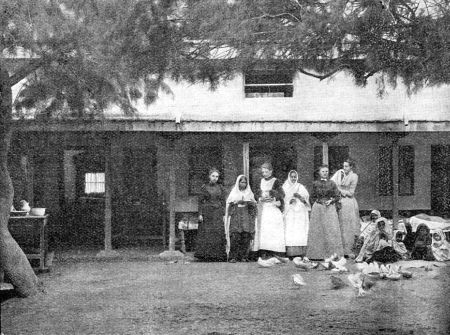
A GROUP OF WORKERS AT THE DUCHESS OF CONNAUGHT'S HOSPITAL.
(Dr. Wheeler stands at the left-hand side of group.)
It is well when superstition and misconception stop short at swallowing paper and inky water. A woman, seriously injured from an accident, was carried into the Duchess of Connaught Hospital, Peshawur. Her husband accompanied her, and saw the medical missionary in charge carefully attend to fractures and bruises. Rest and sleep and quiet were doing their work, and the man was left to watch. A sudden crash startled the ward. The husband had turned the bedstead over on its side, and flung his wife down. He fancied she was dying, and said it would imperil her soul if it departed whilst she lay on anything but the floor. He had the satisfaction of knowing that she died where he placed her. This was a case of[103] a Hindu "sinning religiously." It would be harder to forgive the frequent sacrifice of life to superstition, if there were no ennobling element underlying it of honest desire for some vague spiritual good.
The Duchess of Connaught Hospital is a permanent memorial of her Royal Highness's kind interest in the women of India. Whilst on the North-Western Frontier she went through the Dispensary and Nursing Home which represented the first effort to bring medical aid to the Afghan women, and allowed it to be called after her name. A new and much larger building, of which a drawing has been reproduced, has taken the place of the native quarters, where Mohammedan bigotry was by slow degrees overcome. For years the ladies of the Church of England Zenana Missionary Society, who had charge of this hospital, were the only Europeans living within the walls of Peshawur. Every night the great city gates closed them in, and separated them from other missionaries and from Government servants. They chose to be in the midst of their work, and though outbreaks of Mohammedan fanaticism repeatedly checked teaching in schools and zenanas, ministry to the sick continued, and never lost the friendly confidence of Peshawuris.
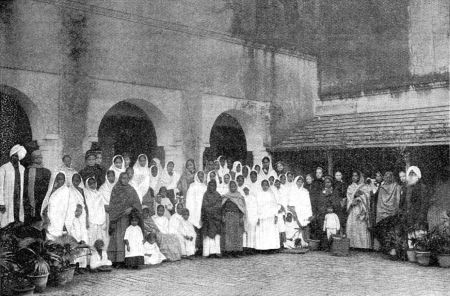
(Photo supplied by the Church of England Zenana Missionary Society.)
STAFF AND PATIENTS OF ST. CATHERINE'S HOSPITAL, AMRITSAR.
In its early and humbler days, the fame of this hospital reached far-away Khorassan. A lady of that country who was suffering terribly, caused herself to be carried the fifteen days' journey to Peshawur. Miss Mitcheson, who opened the first dispensary, and is now the head of the hospital, saw that her case was critical and required an operation of a far more serious kind than she had ever attempted, and begged her to allow the civil surgeon to see her.
"I would rather die," the patient answered. The combined forces of suffering, fear of death, and persuasion, were powerless to move her. The Englishwoman, of whose powers she had heard in her own country, might do what she liked with her, but no man should come near her. Happily Miss Mitcheson successfully accomplished what was necessary, and the Khorassan lady made a good recovery. When the time came for parting from her new friends, she promised to use in her[104] own country the knowledge she had gained in Peshawur. She kept her word, as more visitors from Khorassan testified, and they said she had not forgotten the benefits she had received in the mission hospital.
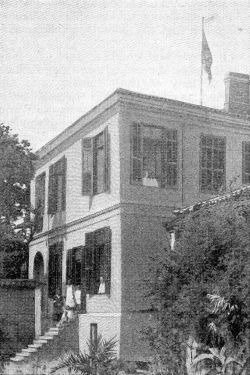
(Photo supplied by the Church Missionary Society.)
BACK VIEW OF NEW WOMEN'S HOSPITAL, HANGCHOW.
During Miss Mitcheson's absence in England Dr. Charlotte Wheeler, who with her fellow-workers, in the illustration on p. 102, stands in the verandah of the old building, superintended the medical work. On Miss Mitcheson's return, Miss Wheeler opened a medical mission amongst the women in Quetta. This work extended rapidly on and beyond the frontier, so that in November, 1896, when it was a year old, eight different languages were spoken on the same day in the dispensary waiting room.
Institutions for training Christian girls of India as doctors or nurses have come into existence as the number of candidates has increased and the necessity has arisen. The North India School of Medicine has been established at Ludhiana with this object. Many of the mission hospitals also have training classes. St. Catherine's Hospital, Amritsar, under the superintendence of Miss Hewlett, who has had nineteen years' experience, has provided very valuable assistant medical missionaries for stations in the Punjab and Bengal. At the last census a hundred Christian women—counting missionaries, assistants, patients, nurses and students—were within its walls. An illustration shows the inmates mustering before going to church.
One student in St. Catherine's Hospital, who had gained a scholarship, gave promise of a brilliant career. Before the time of study in which she delighted was over, the lady superintendent became suspicious of what this young girl described as broken chilblains on her fingers. A doctor was called in, and confirmed her impression that it was leprosy. An Eastern girl knows, what in Europe is only faintly imagined, of the horrors of this loathsome disease. One cry of anguish only escaped her when she was told the verdict. Then she rose above the trial, and resigned herself cheerfully to the will of God. She was prepared to start the next day for the Leper Settlement near Calcutta without meeting her friends or fellow-students for a word of farewell.
"What comforts me," she said to the Clerical Secretary of the Church of England Zenana Missionary Society, who was in Amritsar at the time, "is that I may go as a missionary rather than as a patient."
She went to that place of death and banishment, to live out the rest of her days in ministry for others. In her case the days lingered into years, and the disease took a severe form, but her devotion and courage never failed. When death came to her as a friend, and her work was done, the memory of the "superior girl," who had lived among the afflicted people as a missionary rather than a patient, remained. Perhaps her fellowship in suffering gave her the final qualification to be a missionary to lepers.
India is the land which above all others cries out for lady medical missionaries; but other Eastern countries have also a claim. Wherever Islam has planted its iron heel, women are jealously guarded in harems, and it is very unusual for a man to be allowed entrance on any pretext. In China, also, women of superior class are hidden within the high walls that[105] surround their houses. Those free to go out gain little but suffering from the barbarous attentions of native surgeons. In the East the knowledge which brings relief from pain is a power to overcome obstacles to Christianity that resist every other force.
The Church of England Zenana Missionary Society has sent out a qualified lady doctor to Foochow, and in 1894 the Church Missionary Society opened a hospital for women in Hangchow with one large and six smaller wards. One patient who was brought into this building—of which two views are given—suffering from diseased bones, has gone out to devote her recovered health and new knowledge to the service of God and her own countrywomen.
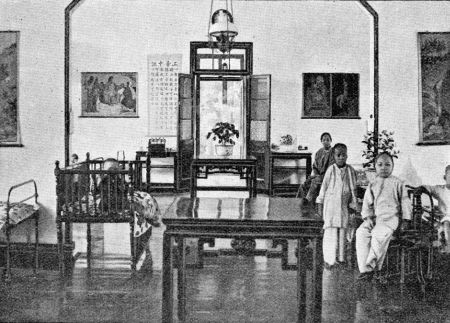
(Photo supplied by the Church Missionary Society.)
INTERIOR OF NEW WOMEN'S HOSPITAL, HANGCHOW
There is scarcely a mission hospital or dispensary that cannot tell of similar results of the double ministry to body and soul. Each year justifies the increased number of women with medical qualifications sent into the mission field. Some, like Mrs. Russell Watson, of the Baptist Mission at Chefu, are the wives of missionaries, others have been sent out by various missions, such as the Zenana Bible and Medical Mission, or by the women's branches (added during the close of the present century), to the more venerable societies.
Dr. Henry Martyn Clark, of Amritsar, once asked a friendly Hindu what department of foreign missions his people considered most dangerous.
"Why should I reveal our secrets to the enemy?" the Hindu responded. But he yielded to persuasion. "We do not very much fear your preaching," he said, "for we need not listen; nor your schools, for we need not send our children; nor your books, for we need not read them. But we do fear your women, for they are gaining our homes; and we very much fear your medical missions, for they are gaining our hearts. Hearts and homes gone, what shall we have left?"
What may be expected when medical and women's missions are combined? According to the friendly Hindu, the very citadels of idolatry and superstition might tremble at the advance of this double force to rescue the captives.
D. L. Woolmer.
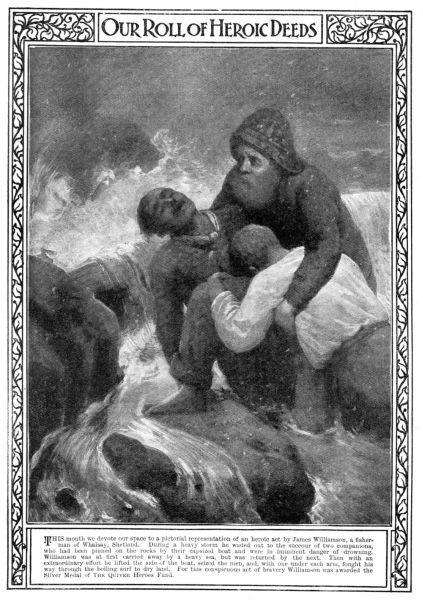
OUR ROLL OF HEROIC DEEDS
This month we devote our space to a pictorial representation of an heroic act by James Williamson, a fisherman of Whalsay, Shetland. During a heavy storm he waded out to the succour of two companions, who had been pinned on the rocks by their capsized boat and were in imminent danger of drowning. Williamson was at first carried away by a heavy sea, but was returned by the next. Then with an extraordinary effort he lifted the side of the boat, seized the men, and, with one under each arm, fought his way through the boiling surf to dry land. For this conspicuous act of bravery Williamson was awarded the Silver Medal of The Quiver Heroes Fund.
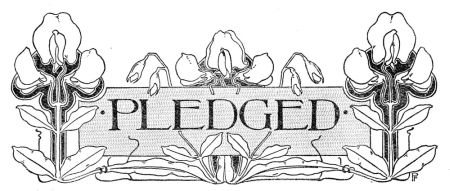
By Katharine Tynan, Author of "A Daughter of Erin," Etc.
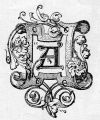
"And then, old fellow," went on Sir Anthony's letter to Jack Leslie, of the Blues, his particular chum, "I stood staring, with my eyes watering and a little scratch on my nose bleeding where the old rooster—for a rooster it was—struck me with his spurs as he flew. He might have knocked out my eye, the brute! The second missile (an invention they call a sun-bonnet, I believe, made of pink calico and horribly stiffened) lay crumpled at my feet. And there in front of me stood the culprit herself, looking half-ashamed and half-inclined to follow the example of the other sun-bonnet which had buried itself in a big chair at the end of the room, and made scarcely a pretence of stifling its peals of laughter. I felt no end of a ninny I can tell you, especially as the owner of the first sun-bonnet was by long chalks the most beautiful creature I'd ever seen.
"I'm no good at describing a girl's charms, but even at the first glance her beautiful violet eyes struck me. Blue eyes and black lashes and eyebrows—it is a thing happens over here sometimes, they tell me. Then, though she'd been rushing about after the ancient barnyard fowl who was to have graced the table in my honour, she had no more colour than a white rose; and yet she looked the picture of health and life—so different from fine ladies. This was Miss Pamela—Pam for short—as I discovered later. To finish her description, her charming head is covered with a mass of short black curls. She had a very shabby frock on, which didn't take a bit from her loveliness. I couldn't help wondering what the mater would have thought if she could have seen her. She would surely have called her 'a young woman,' with that superb contempt of hers.
"However, the breeding tells. Nothing could have been finer than the little air with which she pulled herself together, and said, as if it were an every-day thing to blind and maim your visitors:
"'You must be Sir Anthony Trevithick. I am so sorry. That wretched fowl flew in through the open window, and we've been three-quarters of an hour chasing him round. It was so unfortunate his flying out just at that moment, and still more unfortunate that I should have flung my bonnet after him. But you've no idea how he had aggravated us.'
"I assure you the mater couldn't have done it better, if one could conceivably imagine the mater under such circumstances.
"I could think of nothing to do but to pick up the bonnet and hand it to her, muttering some idiocy about it not mattering a bit. While this was going on the laughter in the chair was dying off in sobs of enjoyment.
"But before we could get any further Mr. Graydon himself made his appearance. I suppose something about my looks struck him—for a cucumber wasn't in it for coolness with Miss Pam—because he said, 'Why, bless me, Sir Anthony! what's the matter? What's the matter, Pam? Why, Sir Anthony, your nose is bleeding!'
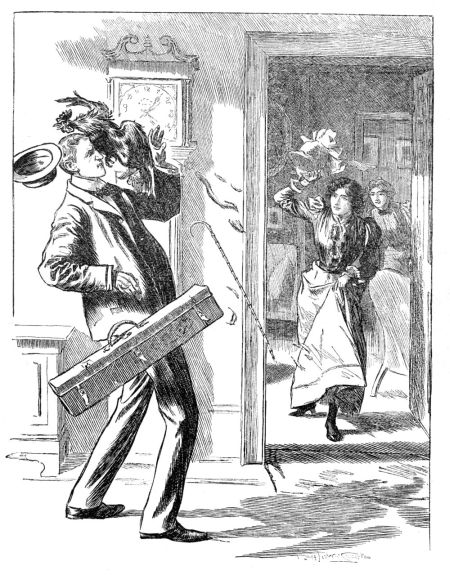
"The old rooster struck me with his spurs."—p. 107.
"'Why, so it is!' said Miss Pam, calmly. 'Sir Anthony was trying to catch the red cock, papa, with a view to his dinner, but he's escaped, I'm sorry to say, and the dinner with him. It will be days before he comes home after the alarm we've given him. I'm so sorry you're wounded, Sir Anthony. Can I get you a little sticking-plaster?'
"'I never know where I shall find the fowls in this house,' said Mr. Graydon, a little irascibly, I thought; 'but the drawing-room at least ought to be kept free from them. Why, Sylvia, what are you doing there, child? Come here, and speak to Sir Anthony.'
"I expected a small child to come out of the big chair in answer to the summons; but, lo and behold! out of the sun-bonnet there looked another satin-cheeked damsel, almost as beautiful as the first. She made her bow demurely, and, I assure you, there wasn't a feather out of her after her fits of laughter at my expense. She had rather an ecstatic look, and her eyes were a bit moist—that was all. I can tell you I never felt so small in my life as when I stood up before those impudent girls, for I could see that the pair of them were hugely delighted at the whole affair.
"'Get some tea for Sir Anthony, girls,' said the father, 'and see that he has hot water taken to his room; he's had a long journey. Sit down, my lad—that is, if there's a chair in the room without a dog on it. Here, Mark Antony, you lazy animal, come off that sofa.' This to the fattest bulldog I ever saw—with such a jowl. He's Miss Sylvia's, and an amiable dog, despite his looks.
"Then the eldest daughter came in—not a patch on the others for beauty, but a Madonna of a creature, with a beautiful voice and a rather sad expression. She was greatly concerned about my scratched nose. But all the time she was talking I noticed that she looked at her father steadily reproachful. At last he noticed it too, for he suddenly blurted out:
"'Why, bless my soul! Molly, I forgot all about it,' and then he stopped and laughed. Miss Pamela has told me since that they had instructed their father to keep me on the way as long as possible.
"You'll gather that it is a rather rummy place. It is. The windows in my bedroom are mended with brown paper, and there are holes in the floor you could put your foot through. Not that my father's son need mind little hardships. But I am amused to think of what the mater would say, with her notions of things.
"By the way, if you're in Brook Street any time, don't repeat what I've told you. The mater hated my coming here. She has some extraordinary prejudice against Graydon, though he scarcely seems to remember her. But as I've given up my desire for soldiering to please her, it's my turn now to please myself by reading for this Foreign Office grind with my father's old friend.
"A word more and I am done. You'll think me as long-winded as some of those old women at the clubs. But their ways here are too delicious. The establishment is managed by one old woman—Bridget, who seems mistress, maid, and man rolled, in one. Well, the morning after I came, when I rang for my shaving water there was no response. At last I heard a foot go by my door, and I looked out cautiously. It was Bridget, and to her I made my request. 'Why, bless the boy!' she said, staring at me, 'You haven't been pullin' that old bell that's never rung in the memory of man?' I assured her I had. 'Well, then,' she said, 'goodness help your little wit! An' so ye want shavin' water, do ye? Sure, I thought ye wor a bit of a boy, that never wanted shavin' at all, at all!' However, she brought me the water obligingly, in an extraordinary piece of kitchen crockery. 'I suppose you're used to valetin',' she said. ''Twas Misther Mick spoiled me entirely for other young gentlemen. He'd dart down for his shavin' water—aye, many a time before I had the kitchen fire lit.' Mr. Mick was apparently a former pupil; I often hear of him.
"There's any amount of sport here, but I won't tantalise you. I like Graydon better every day; he's a dear old boy, and though he's in the clouds half the time when he's supposed to be coaching me, I can see that he knows more than half the tutors in London put together. He's a delightful companion out of doors, a good sportsman, and as young as the youngest.
"It's a mystery his being buried here. But I've no time to try to unriddle it now, and you'll never get as far as this, I expect. Good-bye, old fellow—I'm extremely well satisfied with my present quarters, and pity you in Knightsbridge. I suppose town is getting empty."
When this enormous epistle was finished and sealed, the young gentleman put it in his pocket and went downstairs. His pace was hastened by the fact that he could hear the joyful yelping of dogs in the hall, from which he gathered that someone besides himself was bent on outdoor exercise. Indeed, as he reached the hall and caught his hat from one of the dusty antlers, he saw the two younger Miss Graydons setting out amid their leaping and yelping escorts. He hurried after and overtook them.
"May I come with you?" he asked eagerly. "I've a very important letter to post, and if you're going to the village you might perhaps point out the post-office. I'm such a duffer at finding out things for myself."
"But we're turning our backs on the village," said Miss Sylvia, "going in exactly the opposite direction."
"Oh, well, then, it doesn't matter; the letter can wait till another time."
"Though it is so important. Oh, but you must post it. We'll put you on the way for the village. You turn to the right and we to the left when we reach the gate; then you'll walk straight into the arms of the post-office."
Pamela, who had not yet spoken, turned her heavenly-coloured eyes on her sister, but without speaking. Something in the look made the young fellow's heart throb suddenly.
"Ah, Miss Sylvia," he said imploringly, "don't put difficulties in my way. I want to come for a walk, if you will have me, and the letter can wait. I'm not contemplative enough to enjoy a country walk alone; and it will be a pleasure to walk with you and your sister."
"And the dogs?"
"And the dogs. The joys of a country walk are doubled in the society of dogs."
"I hope you'll think so when you have the felicity of fishing them out of a bog-hole. They will chase every beast they see; and our neighbour, Jack Malone's black cow, Polly, always leads them such a dance, ending up deservedly in a bog-hole."
"I'll try to endure even that, Miss Sylvia."
"Then if Mark Antony gets a thorn in his paw, as he almost invariably does, you'll have to carry him home."
"He must weigh three stone, Miss Sylvia."
"About that, Sir Anthony."
"Then it is better I should carry him than you."
"Oh, if you're bent on it, Sir Anthony."
"If you're not bent against it, Miss Sylvia."
"Well, come along then, for this is the parting of the ways."
They had arrived at the gate by this time.
"Sylvia should have told you, Sir Anthony, that though we turn our backs on the village, yet we pass a wall letter-box, which the postman empties on his way to Lettergort."
It was Pamela speaking for the first time, and in this less hoydenish mood of hers she had a likeness to her gentle elder sister.
"I'm not surprised to hear it, Miss Pamela. I guessed Miss Sylvia was only piling up the difficulties to tease me. But I was not to be put off."
"You are really a most persistent person, Sir Anthony."
"I know when I want a thing and mean to get it, Miss Sylvia."
"Did you ever see anything more beautiful than the rose-light on that mountain, Sir Anthony?"
"I have seen more beautiful things, Miss Pamela."
He spoke with the utmost simplicity, but the girl blushed nevertheless, and was furious with herself for blushing.
"See how rosy the peak is," she went on in some confusion, "but the woods are purple at the base. If we were over there where the road winds round the hill-foot, we should hear nothing but the singing of little streams. They are chattering through the bracken everywhere, and spilling into the road, where they make little channels for themselves, clear as amber."
"They make your boots very wet and your skirt draggle-tailed," remarked Sylvia.
"I see chimneys rising above the wood," said Sir Anthony. "Is there a house there, then?"
"There is, but it is empty at present. It belongs to Lord Glengall, who is away just now. It has a queer story attached to it."
"Indeed?"
"Yes. Lord Glengall went to Australia as a boy, and was unheard of for years. His mother lived there, with one old servant, in the bitterest poverty. She was so proud no one dared to interfere, until, it having been noticed that the chimneys were smokeless for days, the house was entered by force, and mistress and maid were found dying of starvation side by side. The house was full of valuables—lace and plate, and all kinds of lovely things—but they were heirlooms, and the old lady would rather starve than sell them, and the old servant was quite of the same mind."
"What happened then?"
"They were taken off to the Rectory by old Mr. Rogers, who died last year. And in the nick of time Lord Glengall, whom everyone said was dead, turned up safe and sound to nurse his old mother. 'I kept the things together for you, my boy,' she said as soon as she recognised him.
"And the next thing she said," went on Sylvia, taking up the tale, "was, 'Where's that cat?' The faithfulness of animals, Sir Anthony! Old Tib, with whom they had shared all their short-commons, had, it seems, stolen the very last drop of milk that stood between them and starvation, and had then escaped through a window into the woods. 'I should like to give him a good hiding before I die.' That was the second speech of the indomitable old lady."
"What a chance for the novelist this country of yours presents!" said Sir Anthony.
"But that fortunately he never comes our way," replied Pamela.
"Your father promised me you would take me fishing one day." He spoke to Sylvia, but his eyes turned from her to Pamela.
"So we shall," said Sylvia readily.
"The river runs quite close to the house?"
"Yes, but if you want the pleasantest fishing, you must climb for it. Up there in the hills are little golden-brown trout-streams running through the valleys under the shadow of woods, and they are full of trout spoiling to be caught."
"You know the best places, Miss Sylvia."
"Don't let her guide you, Sir Anthony. I'll tell you a story about her. She was always tantalising Mick St. Leger, an old pupil of papa's, who is in India now, with stories of a wonderful pike which inhabited one of the big holes in the Moyle. Well, poor Mick used to sit and fish for hours, now and then catching a little fish by accident, for his heart wasn't in it for thinking of Sylvia's big pike. And Sylvia used to sit by watching him, apparently full of sympathy. One day he was fishing the big hole as usual, when he gave a long whistle. 'What is it, Mick?' Sylvia cried, running to him. 'It feels like a twenty-pounder,' said poor Mick, very red in the face. 'Oh, Mick, do let me[111] help!' cried Sylvia. And then, with an immense deal of carefulness, and poor Mick holding on like grim death, they reeled up an old tin can full of stones, in the handle of which Mick's line was caught."
"Mick would never have known," said Sylvia dispassionately, "if little Patsy Murray hadn't come running after me a week later, calling out, 'Where's that apple ye promised me for sinkin' me mother's ould can in the river?' Mick never believed in me as an honest angler afterwards."
"No wonder! But to think your father should have suggested you as my guide, Miss Sylvia!"
"Pam's just as bad, Sir Anthony. I generally do the things, but Pam encourages me."
Pamela again turned those eyes of heaven's own colour in mute reproach upon her sister.
"I'll have faith in you, Miss Pam," said Sir Anthony impulsively, "no matter what your sister says to the contrary."
And he meant his rash promise.
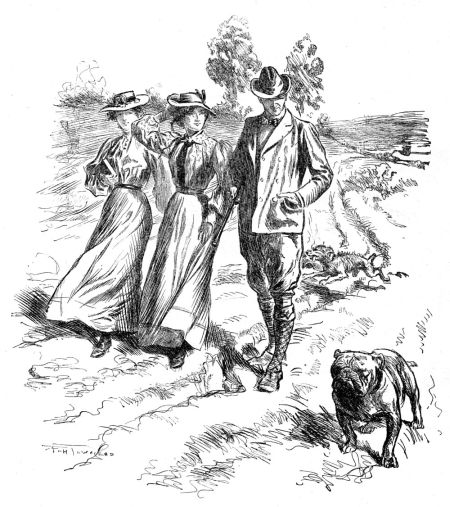
"The letter can wait till another time."—p. 109.
"My friends generally call me Tony," said a voice, the youthful growl of which was subdued to all possible softness.
"We have known each other such a little while," replied Pamela, looking down at the[112] ground, which had begun to cover itself in the flying gold of the autumn woods.
"As the calendar counts; but we—'we count time by heart-throbs'—doesn't somebody say that?"
A colour, like a pink rose-leaf, warmed in Pamela's clear cheek.
"We have become very good friends," she said, "seeing that it is only six—or is it seven?—weeks ago since we met."
"It is eight," said the youth. "I came in mid-July, and now it is mid-September. But it sometimes seems to me that I have always been here, and that my life elsewhere was but a dream."
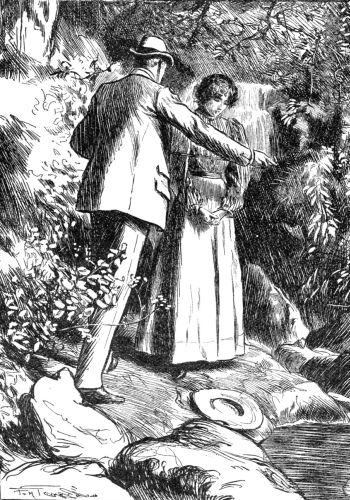
"Tell me what you wished for?"
"If that were so," she said demurely—and for a moment the violet eyes looked up at him under their shadow of night—"if that were so, then I might really call you by your name, Sir Anthony. But it is too soon."
"Then you will one day, Miss Pamela? How many days must go by first? You called that other man—St. Leger—by his name. It is 'Mick' with all of you."
"Ah," said Pamela, again with the bewildering glance; "but Mick was Mick, you see."
A sudden irrational anger kindled in the young man's eye, and his expression stiffened.
"Oh, I see," he said. "This paragon had special privileges which no one else may hope to share."
"He certainly had," said Pamela. "For no one else would endure them, poor dear!"
"Now, what do you mean by that?" he said doubtfully. "Do you mean the privilege of being called by his name?"
"No, but the privilege of my society and Sylvia's."
"He must have been jolly hard to please."
"He wasn't, then. He was as easily pleased as a child. I should like to have seen you in some of the situations in which Mick distinguished himself."
"I daresay I'd be very undistinguished. I make no pretence of being a paragon."
"It would be useless to, Sir Anthony."
"I don't dispute it, Miss Pamela. I suppose we'd better be making for home?"
He turned and walked sulkily along the forest path with the girl by his side. For a second there was silence; then Pamela broke it by saying softly:
"I often have thought that one reason why Molly fell in love with Mick was because she pitied him so much. He came to the wall in all our escapades. Of course, he was always in love with Molly, but I believe it was in protecting[113] him from us that she became so fond of him."
"He is your sister's lover, then?" incredulously.
"Why, of course he is. Whose did you suppose he was?"
"Yours, Miss Pamela."
"Mine! why, he'd never look at me when Molly was by. Besides, you don't know how horribly we ill-used the poor dear fellow."
"Miss Pam, I wish you'd ill-use me."
"You wouldn't like it at all, Sir Anthony."
"Yes, I should, Miss Pamela. So Mick is engaged to your sister. What an ass I have been!"
"Yes, poor dears, they are engaged, without the remotest prospect of ever being married that I can see. Mick's a subaltern in a line regiment, with just his pay—he got in through the Militia—and Molly, needless to say, hasn't a penny."
"He's a lucky fellow, all the same. And now, Miss Pamela, what have we been quarrelling about?"
"I'm sure I don't know, Sir Anthony. Have we been quarrelling?"
"I have."
"But I haven't. I did think you were a little cross about something. But here is the Wishing Well that I told you about."
They had come on a little glade of the forest, in the midst of which was a brier heavy with blackberries. The bush hooded a little space, and, looking underneath, one saw, as in a cup, a still depth of water over pebbles of gold and silver.
"You are to drink, Sir Anthony, without spilling a drop, and think on your wish at the same time."
"Drink from what, Miss Pamela?"
"Why, from your hands, of course."
"I couldn't; the water would all run away."
"No, it wouldn't. See how I manage it."
The girl scooped the water into her rosy palms and drank it slowly. Then she looked at him, and again the wave of rose flowed in her cheek.
"I never could manage it; I'm such a duffer at things. Miss Pamela, would you let me drink from your hands? Do!"
Without a word she stooped and lifted the water and held it to him. He drank from the rosy cup to the last drop. Then he suddenly caught the hands that had served him, and pressed them to his lips. For a moment they were yielded to him, and then the girl drew back. He thought she trembled a little, and the ardour in his gaze grew.
"I am sorry," he said, "but I couldn't help it. You are not angry, Miss Pamela?"
"I am going home, Sir Anthony," she said.
"Not till you tell me one thing——"
He barred her way, putting himself in front of her. "Tell me what you wished for."
Her eyes fell before his, and as she stood with her hands clasped, and her head bent, she was a different creature from the wild Pamela of a few short weeks ago. The sunlight through the thinned branches fell on her short curls, for her hat—which she had been swinging by a ribbon—had fallen to her feet.
"Look at me," he said; "I want to see what is in your eyes."
She lifted them obediently, and then let them fall again.
"Ah, that is enough," he said, with exultation in his voice. "You have answered me, Pam. That is enough just for the present. Some day I shall tell you what I wished for, and we shall see if our wishes come true. A double wish should have double force to induce its fulfilment. Isn't it so, Pam?"
She said nothing, and he looked at her with triumph shining in his eyes. Blent with it was the tenderness of a lover when he knows he is loved, and just a shade of shamefacedness as well.
"We must be wise, little beautiful Pamela," he said presently, in a low voice. "We must be wise and wait. I mustn't ask yet all I would ask, but I will one day—one good day, Pamela. You will trust me, won't you?"
"Yes," said Pamela, hardly knowing what she was asked.
"It will not be for long. Indeed, I could not endure it for long. Shall we be friends for a little while longer, Pamela darling?"
"Yes," said Pamela, forgetting to rebuke him.
"After to-day I will not call you darling till I have the right before all the world. After to-day. I meant to have held my tongue, but you bewildered me, Pamela. You are not angry with me?"
"No," came almost in a whisper.
"Lift up your eyes to me and say it. That is right. How beautiful your eyes are, Pamela! Say 'Tony,' now."
"Tony!"
"Dear Tony."
"Dear Tony!"
"How sweetly you say it! It is like silver in your voice. But, come now, we will go home. I have to be wise, you know. Ah, Pamela, Pamela! why did you bring me to the Wishing Well?"
"You wanted to go."
"Yes, I know; but it was an accident that we were alone, or it was Fate—yes, it was surely Fate that sent Miss Spencer's carriage for your sister at the last moment, so that we had to take our walk without her. Shall[114] we go now, and talk no more about love to-day?"
Pamela hesitated, and then said:
"Poor Sylvia! She has spent this lovely afternoon shut up with an old lady and a dog."
"She wouldn't mind the dog, I fancy, Pam."
"Nor the old lady. Sylvia is fond of Miss Spencer, strange as it may seem."
"Why is it strange, Pam? I can't help using the sweet little name."
He had taken her hand by this time, and they were walking like children down the aisle of golden trees.
"You haven't seen Miss Spencer. She is a little mad and a little grotesque to most people. But she is devoted to Sylvia, and Sylvia to her. She is not mad to Sylvia."
"How does it come that I haven't seen Miss Spencer?"
"She has been abroad. You'll see her one of these days, I expect. She was crossed in love in her youth, and it seems to have made her strange in ways. She's immensely wealthy, and gives a good deal in charity, but mostly among single women. She seems to think that those who have husbands and children don't need pity."
"She's quite safe for your sister to be with?"
"Oh, quite. She has all her senses, only that she's a trifle peculiar. She's a splendid business woman, everyone says."
"It is a curious friendship. I should never have supposed it of Miss Sylvia."
"No. One funny thing is that Miss Spencer's full of sentiment—wait till you hear her sing 'She wore a Wreath of Roses'—whereas Sylvia's quite without sentiment, and laughs at everything sentimental."
"I feel sorry for the poor old thing," said Sir Anthony, with a half-ashamed laugh, "because she was crossed in love. I shouldn't like to be crossed in love myself, Pamela."
"It was cruel," said Pamela simply. "The man made her love him, and then went away and never came back. She was poor then. She inherited Dovercourt quite unexpectedly."
"What a sweep he must have been!"
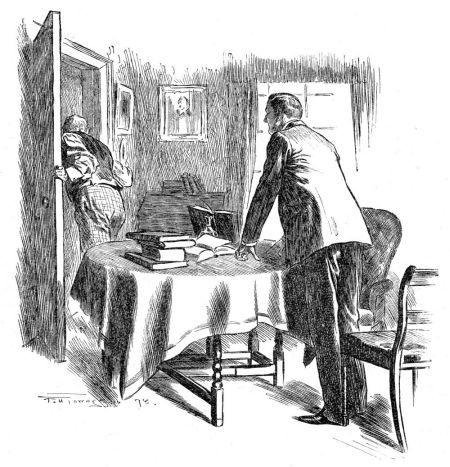
"Come along, Trevithick," he cried, rushing away.
"Poor Miss Spencer always thinks he will come back, though people say he married abroad and died there. I tell you all this so that you won't be the least bit in the world inclined to laugh when you see her. I daresay it's funny enough to see a pink silk coal-scuttle bonnet on top of a grey head; but then, you know, you don't feel like laughing."
"No, indeed, darling."
"Sylvia says it's made a man-hater of her. That's how she excuses herself for treating her admirers so outrageously."
"I'd have fallen in love with Sylvia myself, only for you, Pamela."
"It's lucky you didn't, Tony." The name came with soft hesitation.
"Why, Pam?"
"She'd have laughed in your face."
"I'd rather have your way, Pam."
"My way?"
"Though it made me behave worse than I intended. But never mind. A little time will unravel the tangled skein. Now we are nearly out of the wood. Ah, Pamela! kiss me once—I shall not ask you again till I have the full right."
Without a word the girl lifted her face to meet his kiss. To her it was the kiss of betrothal.
"I wish my friend, Glengall, were at home," said Mr. Graydon, leaning back in the chair by the study fire. "He'd give you a mount while you were waiting for Johnny Maher's little mare. The hounds meet at Lettergort to-day."
He looked wistfully through the bare trees on the lawn, as though he saw in imagination the scarlet horsemen pounding away after the streaming line of hounds.
His pupil thrust into a book a sketch of Pamela which he had been making absent-mindedly.
"Why don't you hunt, sir?" he asked, with sympathy.
"So I do, my lad, when I can. But I can't afford to keep a horse, and there aren't many mounts to be had here. Glengall is going to set up stables when he comes back, and I'll have the run of them, I suppose. He's a good fellow—one wouldn't mind being obliged to him."
"The mare'll be a good one when she's broken," said the young man.
"The best in the world for Irish fences, if she does look a bit roughish."
"You'll ride her for me, when I am away at Christmas, to get her mouth in?"
"Thank you, my lad; I should like to." Mr. Graydon's eye kindled with pleasure. "But I didn't know you were going. It seems a longish way to go home for Christmas."
"My mother would like to see me."
"To be sure, to be sure. I quite understand, and, of course, there are friends in London you naturally want to see."
"No one very particularly, sir."
"Ah, well! it will be a holiday from this dull place."
"No, I assure you, sir. It is partly because I have some—some business I want to settle. It is really true that there is no one I go to see whom I regard more than the friends I shall be leaving behind."
Sir Anthony blushed hotly over this avowal, but his unsuspicious host only saw in it the shamefacedness with which a man, and especially a young man, makes a display of his feelings.
"Now, that is kind of you," he said, looking at his pupil benignantly. "I am sure our Christmas will be dull without you. Do the girls know you are going? They won't like it, eh? And they will be disappointed that you will not be here for the Vandaleur affair."
"I am coming back for that, sir."
"I am glad. It is really the children's first outing. It is a dull enough affair for young people, but then they will wear their pretty frocks and see strange faces. We are such quiet people, Trevithick, that even Vandaleur's big dinner and reception, which comes off regularly whenever there is a general election in sight"—Mr. Graydon broke off to laugh and rub his hands—"is an event for us. But we are forgetting our Tacitus, my boy. Let us get back to the old fellow."
At that moment there was the sound of a horn, and, with the shout of a boy, Mr. Graydon was up.
"Come along, Trevithick," he cried, rushing away, hatless and coatless. "We shall get a glimpse of them. What a day for a scent! They are sure to find at Larry's Spinney."
His words came back to his pupil, who was getting under weigh more leisurely.
"Dear old boy!" he muttered to himself. "It's not surprising my father never forgot him. I wonder why the mater regards him with so deadly a hatred, though?"
At lunch Mr. Graydon announced that Sir Anthony was going home for Christmas. There was a shrill expostulation from Sylvia, and even a mild protest from Mary, but Pamela said nothing. Perhaps it was not news to Pamela.
"You will not be here for the skating," said Sylvia aggrievedly; "that is, if there's going[116] to be any. And I've promised them at the Rectory that you'd recite at their penny reading and give away the presents at the Christmas-tree, besides managing the magic lantern. And, oh!"—the magnitude of the misfortune coming full upon her—"you're not surely going to miss the Vandaleur dinner?"
"No, Miss Sylvia, I shall be here for it certainly. I wouldn't miss it for anything; but I object to your engagements for me with the Rectory people. I'd rather be shot than recite, and—the other things are beyond me," laughing.
"Never mind, then," said the young lady airily. "Lord Glengall will do just as well. I shall like to see him distributing the articles. Besides, he will please the people better than a 'baronite,' and be of the rale ould blood, too."
"Sylvia!" said her father, with a rebuke in his voice.
"Never mind, papa dear. Sir Anthony understands all about his being only a 'baronite.' Bridget told him the other day that if the master had his rights 'tisn't teaching a 'Sir' he'd be."
"So she did," said Sir Anthony.
Mr. Graydon laughed.
"Ah, well, my boy! you mustn't tell your mother what odd people you've found among the wild Irish—will you?"
"She wouldn't understand a bit, but I'll tell her what dear friends I have found and made at Carrickmoyle."
He blushed again, and Mr. Graydon thought how well his modesty became him.
"Ah, well!" he said, "I suppose we must make up our minds to spend Christmas without you. What are you going to do this afternoon?"
"I'm going to Maher's to see the mare, and put her through her paces. I'd like to have her stabled here as soon as possible. If she's ready, she can come at once."
"To be sure. There's stabling for twenty horses here, though the stalls are bare—worse luck! But we won't let Sheila starve. Shall we, girls? I'll go bail these children will make a fine pet of her, Trevithick."
"I shall be all the fonder of her, sir, though I'm well pleased with her at present."
"She's a sweet little bit of horseflesh," assented Mr. Graydon. "I think I shall come with you, if you don't object to my company. I've a bit of business with Johnny myself."
When they returned in time for the afternoon cup of tea, they found an old yellow barouche standing before the door.
"Ah, Miss Spencer is here," said Mr. Graydon. "She's rather an oddity, my boy, so prepare to meet one."
"I heard her story from Miss Pamela. It is very sad."
"When I was a boy of thirteen or fourteen I remember her a brilliantly lovely young woman. That was before that scoundrel came in her way."
When they entered the drawing-room Miss Spencer was sitting with her back to them, almost hidden in a deep armchair. The three girls were sitting or standing about her, all evidently much interested.
"Here is papa, and our guest with him, Miss Spencer," said Mary.
The little old woman came out of her chair with a sudden darting movement like that of a bird. Her gaze went from Mr. Graydon to the younger man.
"Oh!" she cried. "Whom did you say?"
She looked at the stranger for a moment with an agony of expectation in her yet bright eyes, while she fumbled nervously for the long-handled glasses at her side. When she had found them she peered at him through them; then dropped them, the expression of her face changing to indifference.
"I beg your pardon, sir," she said. "I am expecting a friend, and for a moment I thought you were he."
"How do you do, Miss Spencer?" broke in Mr. Graydon. "I see you have Stella under the barouche again. I'm glad she has recovered from her lameness."
"The foot has come all right, thank you," said Miss Spencer, assuming quite an ordinary manner. "You weren't hunting to-day?"
"No; I must wait till Glengall sets up his stables."
"Ah, Glengall is coming home soon?"
"He expects to reach Plymouth on the eighteenth. He will be at home for Christmas."
"There'll be nothing in order for him in that old barrack of his."
"He'll stay here while he's getting things straight. He is going to make a grand place of Glengall. He has plenty of money, and the heart to spend it, and the practical wit to direct it."
"What will he do with it then? He has neither chick nor child."
"There is always time, Miss Spencer."
The slightly mad, brooding look came back to the little wizened white face.
"Yes, of course, there is time," she said, dreamily. "I remember someone—who was it?—who knew Glengall when she was a young woman and he was a little boy. Glengall can't be old, of course, and any day people may return—mayn't they?"
"Why, to be sure they may. Glengall did, though he was twenty years out of the reach of civilisation."
"Oh, I wasn't thinking of Glengall. It was of someone much younger, someone about the age of that young gentleman there."
Trevithick stood in the background and watched her with honest eyes of wonder and pity. She was smoothing the pink silk of her gown, while her eyes watched the fire as if she saw something very happy in it. Her skin was waxen white, and her features sharpened, but the brilliant eyes kept their beauty, and her little old hands, covered with rings, were delicately shaped. Her hair was half-white through the original black, and very oddly her pink bonnet, with its wreath of roses inside, sat on the streaked hair and over the white face. She had thrown off a large sable cloak on to the back of her chair.
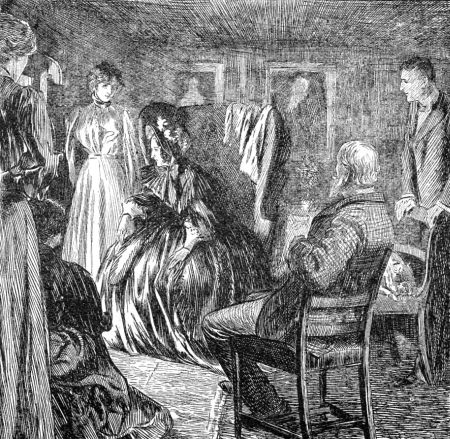
Trevithick watched her with wonder and pity.
Sylvia now broke in on Miss Spencer's half-mad mood. She touched one of the hands tenderly. Trevithick, as he noticed it, thought that it was the first time he had seen Sylvia's face really soft; and wonderfully the new expression completed the girl's beauty. So she will look, he thought, some day, when she is in love, like—like Pamela. But Pamela's serious face was hidden from him now with a fire-screen she held in her hand. He had noticed of late that she seldom looked at him, nor was he displeased. He knew the secret she was afraid to reveal.
"We are all going to the Vandaleur affair, Miss Spencer," Sylvia was saying. "It will be on the thirtieth. There are to be great doings—acres of marquees for the diners, and the winter garden lit by electricity, and I don't know what besides."
Miss Spencer came back to every-day life with a start.
"To the Vandaleur affair, child! Why, who is going to take you?"
"Papa, of course. He loves a little outing, though he won't admit it. He says he'd rather stay at home and have a quiet night's work at his book, and get some hot tea ready for us by the time we come home."
"Why shouldn't I take you?" said the old lady. "I'm hardly old enough for a chaperon, of course, still I've the carriage, and I'd enjoy the function. I haven't been at one since the time Tom Charteris was master of the hounds. How long ago is that?"
Mr. Graydon, to whom she spoke, answered her without looking at her.
"A goodish few years ago."
"It can't be," said the old lady; "not more than four or five at the outside. I wore white satin and pearls. That reminds me: what are you going to wear, minx?"
This to Sylvia, at the same time softly pulling her ear.
"We've got pattern-books of silk stuffs from Dublin. They're dirt-cheap; but the dressmaking will be the bother. However, I daresay we'll manage. Mrs. Collins' Nancy, who is a lady's-maid, is expected home for Christmas. She'll cut the frocks out, and we'll sew them ourselves. She'll know the fashions."
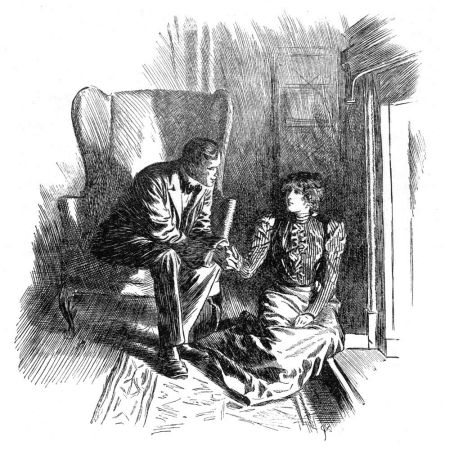
"I must go, to unravel a tangled skein."
"Stuff and nonsense, child! Your first public appearance, too."
"It's Pam's also. But you'll see we'll look very nice. I shouldn't be surprised if the prince fell in love with me."
"What prince? Oh, I see, Cinderella's. But Cinderella went magnificently to her evening party—not in cheap and nasty stuffs cobbled up anyhow."
"The prince wouldn't see that. He'd be disconsolate when I disappeared at twelve o'clock, and he'd send all over the country to find the fit of my glass slipper, and Molly and Pam would cry tears of rage because it wouldn't even fit on their toes."
"You're not ball-going, minx."
"It will be just as good. There'll be a beautiful dinner, and everyone in the county there, and afterwards there will be acres of beautiful things to see. It is a thousand pities Mr. Vandaleur is an absentee."
"If he wasn't, he wouldn't have to remind you of his existence now," said the old lady cynically. "But am I to be chaperon?"
"Well, I'll tell you what, Miss Spencer," said Mr. Graydon. "If you'd take charge of these children, I'd be greatly obliged to you. The fact is that I've to attend a sort of unofficial meeting of Vandaleur's supporters in the afternoon, and he has hospitably offered me a bed. So I thought I'd take my bag over and dress there after the meeting."
"And stay all night? I knew it," cried[119] Sylvia. "Papa pretended it was such a bother, and all the time he was longing to be in for every bit of it. Only he didn't know what to do with us."
Mr. Graydon laughed.
"Maybe you wouldn't like it yourself. I shall be button-holed by Musgrave and Frost and Clitheroe, and every man in the county who thinks he has a head for politics and wants a patient listener."
"And you will go at it hammer and tongs with the best of them, and forget you have daughters. I don't suppose you'll even remember at dinner-time to see whether anyone is asking us if we've an appetite."
"The young fellows will do that. Every boy in the county will be there, including the 300th from Dangan Barracks."
"I daresay," said Sylvia: "you're always ready to shift your responsibilities. Never mind, Miss Spencer; I daresay we shall be able to find someone who will look after us, if it's only a waiter."
"Oh, indeed, you'll find someone to befriend you, never fear. And so will Pam. And so shall I. But what about Molly?"
"Never mind me, Miss Spencer," said Mary. "It would never do to have you chaperoning three girls, and I shouldn't enjoy it a bit. I shall stay up and have tea for you after your cold drive."
"I don't know what girls are coming to," said Miss Spencer; "I shouldn't like to have to stay at home myself."
"We don't mind Molly," cried her sisters; "she really likes to stay at home and write her perpetual letters."
"I shouldn't mind having the three of you," went on Miss Spencer; "we'd pass for four sisters."
"We should never look as lovely as you in that white satin and pearls," said Sylvia, fondly.
"I was much admired," said Miss Spencer, complacently. "But now I must be going. I've letters to write before dinner: I don't want to lose my beauty-sleep sitting up to write them."
When Sir Anthony came into the drawing-room before dinner, he found only Pamela stretching her hands to the wood fire in the low grate.
The lover stooped down and kissed them.
"Have you been out?" he asked in a whisper.
"Only to the stables with Sylvia. Your Sheila has come. She is a dear thing."
"You like her, Pam?"
"Who could help it? She looks so wild and shy, and she is so gentle at the same time."
"Do you like her because she is mine, Pam? Do you, just a little because of that? Say you do, Pam."
"Just a little," whispered Pam.
"Why, if you like, she shall be yours, when—when everything has come right. I think she would carry a lady beautifully. What do you say, Pam? Would you like her, then?"
"Yes," said Pamela, with her eyes very bright.
"You didn't seem to mind my going away at Christmas, Pam. You were the only one who didn't protest."
"I know you wouldn't go if you could help it."
"Wise little woman. I must go, darling—to unravel a tangled skein. Afterwards it will be paradise, Pam. I will come back as soon—as soon as ever I can. I shall be in a fury of impatience till I come back."
"And I," said Pam, lifting her eyes to her lover, and flooding him with their light.
"Sweetheart! you were a coquette when I knew you first, Pam. Now you don't try me as many girls try their lovers."
"I have only love for you now. Ah! what should I do if you did not come back?"
"I will come back, 'though 'twere ten thousand mile.' I shall be here for your great function. Do you think I would have you go without me?"
"I shouldn't care for it without you."
"There will be other men there, Pamela, to see how beautiful you are. I must be there to guard my own."
"There is no need for that."
"I believe you, my love, you are as much mine as if you were my wife. And I am as much yours."
"Love can only mean that."
"Ah, my darling! how sweet you are! You wouldn't care for the admiration of other men, Pam?"
"Only for one."
"It is hard to be wise, Pam, when I am with you. You are too sweet. It is fortunate I am going."
"When you come back it will be different."
"Yes; you will have to make up to me for my prudence all these months. I have been good, Pam; I have never asked you for a kiss."
"Yes, you have been good."
"And you, you are a girl in ten thousand. You have never asked me what stood between us—a shadowy barrier, Pam, but even that must go before I claim you, my queen. When I come back, Pam! Ah, when I come back!"
"Here is Molly," said Pam, in a low voice, as her sister entered the room.
END OF CHAPTER SIX.

By the Rev. A. R. Buckland, M.A., Morning Preacher at the Foundling Hospital.
December is a month of great names. On December 21st, 1117, according to some authorities, there was born, in a house that stood on the site of the Mercers' Chapel in Cheapside, Thomas à Becket. Whether men side with Church or State, and are for or against Becket, they will hardly deny him the right to be remembered as an outstanding figure in our history. On the last day of the month died another great Englishman; like Becket, an Oxford man, and a potent factor in the religious development of our nation. On December 31st there passed away at Lutterworth John Wycliffe. His bones, thirteen years after burial, were dragged from their resting-place and cast into the River Swift. Thomas Fuller turns that shameful act of ecclesiastical malice to good use. "Thus," he says, "this brook did convey his ashes into the Avon, the Avon into the Severn, the Severn into the narrow sea, and this into the wide ocean. And so the ashes of Wycliffe are the emblem of his doctrine, which is now dispersed all the world over." On the 13th of the month, many generations later, there came into the world Arthur Penrhyn Stanley, an ecclesiastic of still another type. No modern dean ever identified himself with his cathedral as Stanley did with Westminster Abbey. Its national character was always present to his mind. His simple piety, his good works, his sympathy with Nonconformists, all helped to make the Dean himself rather a national possession than merely an ecclesiastic. He died in 1881.

JOHN WYCLIFFE.
(From the Portrait at King's College.)
We have had the Church, let us come to the State. It is a rich month that claims the birth both of William Ewart Gladstone (December 29th) and of his great rival, Benjamin Disraeli, Earl of Beaconsfield (December 20th). They began their careers under very different auspices. Eton and Oxford prepared the one for immediate entry, under favouring circumstances, into Parliamentary life. The other was educated privately, designed for the law, and first caught the public eye as an author when he burst upon the world with the novel, "Vivian Grey." Mr. Gladstone survived his rival seventeen years.
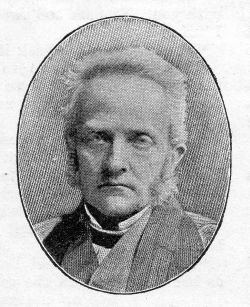
DEAN STANLEY.
(Photo: The London Stereoscopic Co.)
There died on December 14th one whom the British nation can only number amongst its own worthies by adoption. The death of the Prince Consort in the prime of life, and just when his very considerable powers and great devotion were beginning to be understood by those who at first regarded him with doubt because he was a foreigner, plunged our Queen into sorrow which long darkened the[121] life of the Court and was felt by the whole nation. The pure, unblemished life of the Prince Consort, his sincere desire to advance the welfare of the people, his ready promotion of the arts and sciences, as well as his tender devotion to the Queen, have long been understood and valued by the nation which he served.
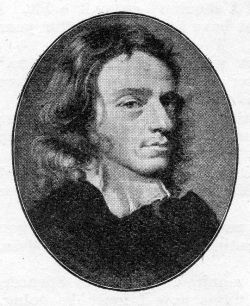
JOHN MILTON.
(From the Miniature by Samuel Cooper.)
To come to other fields: there was born in London on December 9th, 1608, John Milton. Educated at Cambridge, he early gave free play to the powers which in their issue have made his name familiar wherever the English language is spoken. Few remember him as a writer of polemical treatises on affairs of the State and the Church, or even as Latin Secretary to Cromwell; but he was an old man and blind when he gave the world "Paradise Lost."
On the 12th there died Robert Browning, a poet who spoke to his age as few men have ever done, and spoke of God and the soul, of the here and the hereafter, with a clearness of faith which was as distinct as the robust manliness of his character.
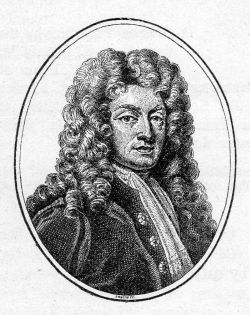
SIR CHRISTOPHER WREN
(From the Portrait by Sir Godfrey Kneller.)
December 28th is given as the date upon which Westminster Abbey was consecrated in 1065; and on December 2nd that other minster, St. Paul's Cathedral, was opened in 1697. Legend says that the same King Sebert who founded the original St. Paul's also founded the Abbey at Westminster, whilst another story invokes the aid of King Offa. There is, however, clear testimony to the establishment of a Benedictine abbey at Westminster in the time of Edgar; that is antiquity respectable enough to satisfy most of us. A cathedral on this site is mentioned by the Venerable Bede as early as 604; but the actual fabric of St. Paul's has, according to Mr. Loftie, undergone greater vicissitudes than that of any other cathedral in England. The present St. Paul's was begun in 1675 and finished in 1710. Its cost was £736,752. Sir Christopher Wren, its architect, received for his services £200 a year. What were then called "the new ball and cross" on the cathedral were completed in this same month in 1821.
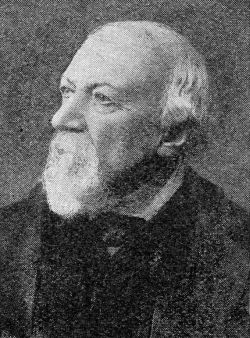
ROBERT BROWNING.
(Photo: Cameron and Smith, Mortimer Street, W.)
An old calendar assures me that on the 15th of this month, in the year 1802, "societies for abolishing the common method of sweeping chimneys" were instituted.
On the 20th of this month, in the year 1814, Samuel Marsden landed in New Zealand—a missionary anniversary worth recalling.
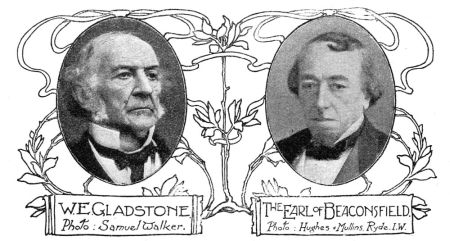
W. E. GLADSTONE THE EARL of BEACONSFIELD.
Photo: Samuel Walker. Photo: Hughes-Mullins, Ryde. I.W.
TWO EMINENT STATESMEN BORN IN DECEMBER.
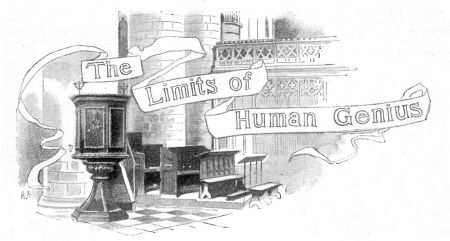
Pulpit at Gloucester Cathedral.
A Sermon Preached by the Very Rev. H. Donald M. Spence, D.D., Dean of Gloucester, at the Opening Service of the September (1898) Meeting of the Three-Choirs Festival in Gloucester Cathedral.
"As for Wisdom, what she is, and how she came up, I will tell you, and will not hide mysteries from you, but will seek her out from the beginning of her nativity, and bring the knowledge of her into Light, and will not pass over Truth."
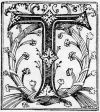
The surroundings of a custodian of a mediæval cathedral, beautiful though they are, at the same time are unutterably pathetic. They tell him, do the pages of the old solemn Book of Stone he is never weary of turning over and of pondering upon, that the genius of man has its limits, which it may never pass; that the story of human progress to higher and ever higher levels is often a delusive one; that in past ages his forefathers were perhaps as noble and chivalrous—aye, nobler, more chivalrous than the men of his own generation—that their imagination was more brilliant and their hands more cunning; that if in some respects progress is visible, in others the movement is retrograde.
Again, a great mediæval cathedral like our own glorious Gloucester, inimitable in its fadeless beauty and matchless strength, surely deals a very heavy blow to human pride, and it teaches humility to the most competent and ablest of our number, for it is a conception belonging to a past age. A great gathering, however, like the present, numbering some six or seven thousand persons, is for varied reasons an inspiring one and bids us be trustful—even hopeful.
Dwell we a brief while first on our surroundings. Of all works devised by human ingenuity and carried on by human skill, the triumphs of architecture are among the most enduring, afford the most genuine and purest delight to the greater number of men and women, are confessedly the most attractive, perhaps the most instructive, as they are among the most enduring of human creations. The glories of Luxor and Karnak, which for several thousand years have been mirrored in the grey-green Nile; the white and gleaming shrines of Athens the bright and happy, the mighty ruins of Eternal Rome, are splendid instances.
But perhaps the conspicuous examples of this architecture, the most loved of human arts and crafts, are, after all, the mediæval cathedrals. The first object of interest for the modern traveller in search of health or rest is a cathedral. All sorts and conditions of men find delight in its contemplation. The delight, of course, is varied, but the strange and witching beauty appeals to them all. This appeal to the higher and devotional side of our nature speaks to every soul, to the unlearned as to the learned, to the mill-hand as to the scholar. The wanderer from the New World beyond the seas at once seeks them out, conscious that in them he will find[123] a beauty and a joy such as he will never see or feel outside their charmed walls.
I have said that to the custodian of such a cathedral the surroundings are, if not sad, at least pathetic, for these magnificent and loved creations of human genius belong to a somewhat remote past, and, as far as these exquisite buildings are concerned, save for purposes of necessary repair—repair simply to arrest the ravages of time—for nearly four hundred years the clink of trowel and pickaxe has been hushed.
It is scarcely an exaggerated statement which speaks of architecture, in its noblest sense, as a lost art. Very significant are the words of one of the greatest of modern architects, who, after dwelling on the decadence of his loved art, tells us how "It is a somewhat saddening reflection—but there is no escaping from the conclusion—that the art which created the glorious abbeys and minsters, the beautiful parish churches so plentifully dotted over our country—abbeys, minsters, and churches which the churchmen of the second half of the nineteenth century so reverently and wisely restore and seek to copy stone by stone, arch by arch, window by window, down to the smallest bit of ornament—is a lost art! Men have come sorrowfully to see that mediæval architecture is the last link—perhaps the most beautiful as well as the last link—of that long chain of architectural styles, 'commencing in far-back ages in Egypt and passing on in continuous course through Assyria, Persia, Greece, Rome, and Byzantium, and thence taken up by the infant nations of modern Europe, and by them prolonged through successive ages of continuous progress till it terminated in the beautiful thirteenth-and fourteenth-century Gothic, and has never since produced a link of its own.... Alas! it is the last link of that mighty chain which had stretched unbroken through nearly four thousand years—the glorious termination of the history of original and genuine architecture.'" Well may men love it and seek to preserve the examples they possess of it, and aim at copying it as well as they can. These remarkable and melancholy words above quoted were deliberately spoken by Sir Gilbert Scott, R.A., LL.D., in his first lecture on Mediæval Architecture delivered at the Royal Academy some years ago.
So much for my note of sadness. Now let me strike a different chord.
Such a gathering as the present, I repeat, is an inspiring one, for it tells me that if one great art dies, He who loves us and has redeemed us at so great a price, gives His children something in its place. Now it is strange that amidst all the gorgeous and striking ceremonial of the mediæval services, with their wealth of colour and ornament, with all their touching and elaborate symbolism, music, as it is now understood, was unknown and comparatively neglected. In the noblest cathedral of the Middle Ages, in the stateliest Benedictine or Cistercian abbey, while the eye was filled with sights of solemnity and beauty, each sight containing its special and peculiar teaching, the ear was comparatively uncared for. Strangely monotonous and even harsh would chaunt and psalm and hymn, as rendered in the mighty abbeys of Westminster, Durham, or Gloucester in the days of the great Plantagenets, of the White Rose or Red Rose kings, sound to the musically trained ears of the worshippers of the second half of the nineteenth century. Indeed, music as a great science was unknown in pre-Reformation times. The most complete anthem-book may be searched through by the curious scholar, but scarcely a musical composer of any note will be found in these collections of a date earlier than the reign of Queen Elizabeth. It would seem as though, when architecture ceased in the sixteenth century to be a living craft, a new art was discovered and worked at by men.
A new art! I say these words, strange to some, with emphasis. One who has indeed a right to speak of music[1] thus voices my assertion. While telling us that certain grand forms of music loom out of the darkness of the earlier centuries of our era, the famous musician to whom I refer adds that little of what we understand of music existed before the later years of the fifteenth century. It was no mere renaissance, for that which had never been born could not be born again.
[1] Professor Hullah, in his "Lectures on the History of Modern Music," delivered at the Royal Institution of Great Britain, published 1884. See, too, Professor Hullah's Royal Institution Lecture on the Transition Period of Musical History (1876).
In case some should think that too strong expressions are here used, it may be well to quote some of Professor Hullah's own words, which he used in the above-mentioned lecture at the Royal[124] Institution:—"Music is a new art.... What we now call music ... what answers to our definition of music, has come into being only within comparatively few years; almost within the memory of men living." "I should say that in the scholastic music there was no art, and in the popular music no science; whence it is that the former has ceased to please, and the latter has for the most part perished utterly."
It was a new art which charmed and delighted men as they listened to the magic of the sounds evoked by the majesty of the compositions of Palestrina, or by the sweetness of the music of Marenzio. It is true, as I said, that certain grand forms of music loom out of the darkness of the remote past—shadowy forms—and the rare composers and writers of the music of the past are, as far as music is concerned, but the shadow of names now. I allude, as famous examples of these shadows of names, to names such as Gregory and Isidore, Hucbald and the eleventh-century maestro, Guido Aretino.
With extraordinary rapidity developed the new craft. To give here some familiar landmarks—
Henry VIII. was reigning before Josquin Deprès, whom all musicians revere as one of the earliest, certainly the most renowned, of the pioneers of modern music, became generally known in Europe. Josquin Deprès was born somewhere about the year 1466, dying about 1515, some ten or fifteen years before Palestrina was born. Luther said of him, "Other musicians do what they can with notes; Josquin does what he likes with them." The Abbate Baini alludes to him as "the idol of Europe"; and again writes, "Nothing is beautiful unless it be the work of Josquin."
The famous Roman School of music only dates from 1540. The oratorio, even in its more simple forms, made its appearance some seventy years later.
Not until the last years of our Queen Elizabeth were the names of Palestrina and Marenzio, those great early composers, conspicuous, and the Queen so loved of Englishmen had long fallen asleep before Carissimi, the earliest master of the sacred cantata in its many forms, gave his mighty impulse to the new-born art; while the works of his world-famed pupil Scarlatti, and of our own English Purcell, belong to the art-records of the days of William and Mary and Queen Anne. See how the whole of the marvellous story of music—as we understand music—belongs to quite recent days!
All through the eighteenth century, when the Georges reigned, architecture slept its well-nigh dreamless sleep. But the new art of music grew with each succeeding year, while the men whose names will never die lived and wrote.
It was this eighteenth century which saw a Beethoven, a Handel, a Bach, a Haydn, and a Mozart. As masters of the new-born craft none can be conceived greater.
The century now closing boasts, however, a long line of true followers and worthy disciples of those great ones, men whose names are household words in every European city.
But my brief record, necessarily dry and bald, of a momentous change in the teaching of the world would be incomplete without one word on the glorious instrument—the voice, so to speak—of these masters of a new art, the organ. The first organ known in Western Europe traditionally was sent to Pepin in France by the Emperor of Constantinople in 759, but Aldhelm, Bishop of Sherborne, in his poem on Virginity, some half a century earlier, apparently describes what appears to have been the organ. Elphege, Abbot of Winchester in the tenth century, is said to have caused a very large organ to be constructed; but, with this solitary exception, all the mediæval organs seem to have been small and comparatively unimportant instruments. The oldest organ-cases preserved do not date back further than the last years of the fifteenth century, and these by the side of modern organs are insignificant in size. Viollet le Duc, in his great work, gives us a picture of the Perpignan organ, one of the earliest (early in the sixteenth century). From this date the size rapidly increased.
In the "Rites of Durham," where a great mediæval church is described at the period of the Dissolution (1530-40), there were three organs in use in the abbey church, the principal one being only used at "principall Feasts," the pipes being "very faire and partly gilded." "Only two organs in England," says the "Rites," "of the same makinge, one in Yorke and another in Paules."
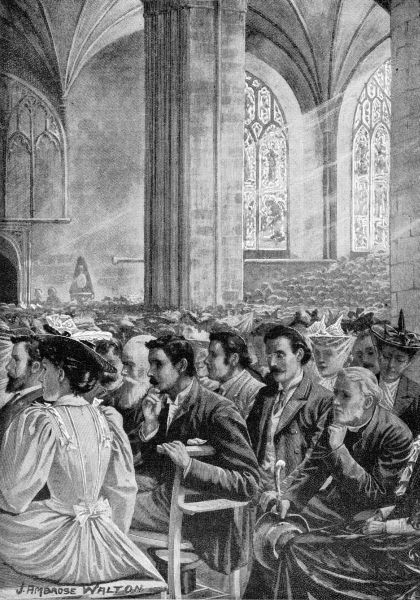
LISTENERS AT THE THREE-CHOIR FESTIVAL.
The most magnificent organ-case in
[126]
Europe is the one in St. Janskirk at Bois
le Duc, and, like the vast majority of the
great organ-cases, is Renaissance in style.
Viollet le Duc sums up the question in the
following sentence:—
"It does not appear that great organs were in use before the fifteenth century, and it was only towards the close of the fifteenth and beginning of the sixteenth centuries that the idea of building organs of dimensions hitherto unknown was first conceived."
The organ, as we now know it, was born among us at the same date when architecture died. Like the music of the Middle Ages, in the days when these vast and peerless buildings arose, it is true the organ was not unknown; but, like mediæval music, it was a small, poor thing compared with the stupendous instrument we know and love. There was no great organ before the last years of the fifteenth century, when the Tudors reigned. The sixteenth and seventeenth centuries witnessed its development, and acknowledged its surpassing grandeur, and recognised its fitness as one of the chief handmaids of the new great art.
Now the secret of the men who built this lordly abbey is lost; never again will such a triumph of, alas! a dead art arise to charm and to delight, to instruct and inspire the children of men. But we may still preserve and reverently use this rare and noble legacy of a vanished age as a shrine and a peerless teaching-home—a prayer-home, in which are taught the great evangelical truths by which Christian men live and breathe and have their being, the saving knowledge of the work of the Precious Blood, the glad Redemption-story, the story loved of men; the story which never ages, never palls, but which, like dew, descends on each succeeding generation of believers, and gives them new stores of faith and hope and love. This—these things—we try to do, and not without success, for as God's bright glory-cloud once brooded over the sacred desert-tent and the holy Jerusalem Temple, so now upon our beloved and ancient cathedral, with its almost countless services of praise and prayer and teaching, God's blessing surely rests.
"It sleeps," does our cathedral, as one has lately said in words beautiful as true—"it sleeps with its splendid dreams upon its lifted face." But it has, too, its many wakeful working hours. Not the least memorable of these will strike this week, when the charmed strains of Handel and Haydn, Mozart, Mendelssohn, and Beethoven, and of the great Englishmen, Gibbons and Boyce and Walmisley and Wesley, and last, but not least, of Hubert Parry, peal through these fretted vaults, "lingering and wandering on" among these wondrous chambers of inspired imagery; while the almost prophetic words of that truest English song-man Wordsworth become history:—
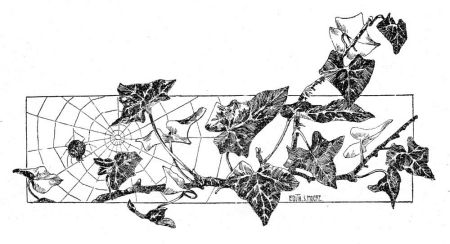


T girl was little, slender, insignificant—only her love made her heroic. The man was big, broad, one to be noticed in a crowd, and his love made him as helpless as a little child.
They stood opposite each other in the poor, shabby little room. His eyes devoured her face wildly, incredulously, but her eyes were fixed on a great hole in the faded carpet.
Her mind was chaotic, for with his eager words of love rang others, bewildering her. Side by side with his passionate outpouring of his love for her, his longing to have her for his own, to live for her and work for her, were other words—words of ambition and great aspirations, words of intending travel into far-away countries, of hardships and discomforts to be borne for the sake of the book that was to be written—the book that was to bring fame and satisfaction to the writer of it.
And these words rang with a deep note of earnestness and strength, and overpowered those eager, present tones that were pleading to her so wildly.
"I called you Kathleen Mavourneen last night, you remember, and you smiled and blushed!" he protested, roughly. "Why did you do it? Kathleen, you do love me, you do! Why don't you speak to me? I tell you, I have seen it in your eyes. Why do you deny it now?"
She shook her head, and her heart cried in agony, "How long? How long?"
"Won't you try, then?" with a humbleness that was not natural to him. "Oh, Kitty, little Kitty, I cannot live without you!"
He held out his arms to her despairingly.
"I have a singing lesson to give at one o'clock," she said.
His arms fell to his sides. The sun streamed in on to the pretty, pale, downbent face of the girl, and on to the white, haggard face of the man who stood opposite.
There were no shadows in the little room—it was all glare and shabbiness.
"I will go," he said, and then his eyes caught fire; "but you are a flirt! Do you hear, a paltry, heartless flirt! You have led me on—played with me. You have made your eyes soft, your lips sweet, to amuse yourself at my expense! How do you do it?" with a little cynical laugh. "It's really clever—of its kind—you know——"
He moved towards the door.
"I beg your pardon," he said icily. "I should not have spoken so to a woman. Good-bye."
"You will begin your travels now?" she said.
He laughed.
"Why keep up the pretence?" he said; "it's rather late now to pretend any interest in my life."
She was silent.
At the door he paused.
He was a proud man, and he had an iron will.
But his love made him helpless and weak as a little child.
"Kathleen," he breathed, "you are sure?"
A moment she stood still and rigid as a statue.
"Little one, I love you so——" His voice was soft and caressing; but her love made her heroic. She raised her head. "I am sure," she said steadily.
The girl sat in a corner of the warm, gorgeous drawing-room, and wished vaguely that people would not nod and stare at her so energetically. She was used to it now, and tired of it.
She had never liked it, but fame brings notoriety in its train, and notoriety brings nods and whispers and stares.
She was dressed beautifully. She had always liked pretty things, and now she could have as many as she wanted.
The man stood over in a doorway and watched her with cynical eyes.
He had not seen her for five years, and as he stood there another man lounged up and spoke to him.
"Looking at la belle Philomèle?" he said; "she's quite the rage, you know. Ever heard her sing? You're only just back from the wilds, aren't you? Oh, well, of course you'll go to St. James's Hall to-morrow? She's going to sing, you know. Her voice is splendid. I never go to hear her myself—makes me feel I'm a miserable sinner somehow—does, 'pon my word. I've heard her twice, and then I dropped it. Don't like feeling small, you know."
He lounged away again, and the man with the cynical eyes still watched her.
Her head was turned away from him—only a soft, fair cheek and little ear nestling in a soft mass of hair, a white throat, and a lot of pale chiffon and silk, could he see. And suddenly the cheek and even neck were flooded with a red blush, and then they looked whiter than before. He wondered, and smiled bitterly as he did so.
And the girl's eyes remained fixed, eager, fascinated, on the long looking-glass before her.
But she was not looking at herself.
Afterwards he sought her.
"You were wise," he said mockingly, and her eyes grew dark with pain.
He took the seat beside her and played with the costly fan he had picked up.
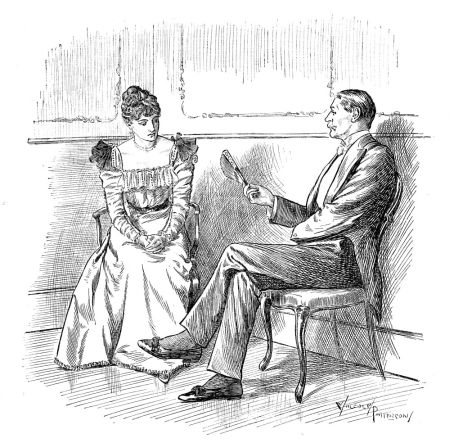
"You were wise," he said, mockingly.
"I must congratulate you," he said indifferently. "This"—with a comprehensive wave towards her dress and the diamonds at her throat—"is better than the old days."
"Yes."
"But perhaps you have forgotten so long as—what is it?—ten—no, five years ago?"
"No."
He furled and unfurled the fan in silence, and wondered who had given her the Parma violets in her hair.
"Your—book?" she said timidly.
He stared at her blankly.
She reddened slowly.
"You—you—were going to—to travel, and write about it—strange places——" she faltered.
"Oh, ah! yes, I believe I was—five years ago."
Her face was white again now.
"You have travelled?" she ventured at last.
"Oh, yes! I've done nothing else for five years. I've shot tigers, bears—I've lived with Chinamen and negroes—chummed with cannibals once—oh!"—with a laugh—"I've had a fine time!"
Her eyes were wistful.
Her hostess brought up a man to be introduced, and when she turned again, the chair was empty.
She did not see him again for two weeks.
There was an added pathos in the beautiful voice.
La belle Philomèle brought tears to many thousands of eyes, but her own were dry and restless. It was dawning on her that she had made a mistake—five years ago.
"Seen Hugh Hawksleigh?" she heard one man say to another. "Never been so disappointed in a chap in my life. Years ago he promised great things. Those articles of his on 'Foreign Ways and Doings' made quite a sensation, you know. And there was some talk of wild travels and a book that was going to be the book of the day. The travels are all right, but where's the book?"
"The usual thing—a woman," drawled the other. "Didn't you know? Some pretty coquette—the usual game—but the cost was heavier than usual—to him. It knocked it out of him, you know. I never saw a fellow so hard hit. That was five years ago, and he's never written a line since. Poor fellow!"
The knowledge that she had made a mistake five years ago was growing plainer to her.
At the end of the fortnight she met him and asked him to come and see her.
He smiled, and did not come.
Her eyes grew too big for the small, sad face.
She met him again, and asked him why he had not come.
He looked down into the sweet, true eyes, and his love weakened his will again.
He promised he would come. He came, and stayed five minutes. He looked at her sternly as he greeted her.
"Why do you want me?" he said, and watched the colour come and go in her cheeks with pitiless eyes.
"We—used—to be—friends," she whispered.
He laughed.
"Never! I never felt friendship for you," he said, "nor you for me. You forget. Five years is a long time, but I have a retentive memory. I forget nothing."
"Nor I," she murmured.
"No? Then why do you ask me to come and see you?"
She did not answer.
He looked round the pretty shaded room.
He laughed again.
"There is a difference," he said, "in you too."
She looked up quickly.
"I am the same," she said, knowing her own heart.
"Are you?" His eyes grew stormy. "Listen," he said, in a low, tense voice: "I am five years wiser than I was—then. I will not be a tool again. You have ruined my life—doesn't that content you? I would have staked my life on your goodness and purity—once. I dare not believe in any woman since you, with your angel's eyes, are false. I was full of ambition and hope once; you killed both. I tried to write—after. I could not. I shall never do anything now—never be anything. I despise myself, and it's not a nice feeling to live with. It makes men desperate. I love you still. Do you understand? I have loved you all the time, and I loathe myself for it." His voice changed. "You may triumph," he said, "but now you understand—I will not come again."
She stretched out her arms after him, but he was gone. And she knew now quite clearly that she had made a mistake five years ago.
For three weeks and a half she did not see him.
Then she saw him when he thought he was alone.
She studied his face with eyes that ached at what they saw. Then she went forward and touched him gently on his arm.
"Well?" he said.
"Will you come," she said in a low voice, "to see me——"
"Thanks, no."
His eyes rested bitterly on her rich gown.
It came across him again how wise she had been. Tied to him, she could not have been as she was now.
"I have something I must say to you," she said tremulously; "will you come—just this once?"
He looked down into the soft eyes with the beautiful light in them.
"I would rather not," he said gently.
The weariness in his eyes brought a sob to her throat.
"Ah, do!" she entreated; "I will never ask you again."
He looked at her with searching incredulity.
Then he turned away.
Just so had she looked five years ago.
She laid a small, despairing hand on his.
The iciness of it went to his heart.
"I will come," he said gently, and went away.
When he came, he wondered at the agitation in her small white face.
Her eyes were burning.
He waited silently.
She twisted her hands restlessly together, and he saw that she was trembling.
He drew a chair forward.
"Won't you sit down?" he said.
She sat down in a nest of softest cushions.
"I—I——" she began, and put up her hand to her throat, "I want to—to—to explain."
His face darkened.
She got up restlessly and faced him.
He thought of that time when they had faced each other before—in the shabby, glaring little room—and his face hardened.
"When you——" she began; "I thought it was for you—I had heard you say——"
"Are you going back five years?" he asked.
"Yes."
"Then would you mind not?" he said. "There can be no good in it, and to me at least it is not a pleasant subject."
"I must!" she burst out. "Oh! cannot you help me? It is so hard!"
She held out her hands pathetically.
A deep colour came into his tanned face, and he stood still, looking at her strangely.
"I think I will go," he said; "there is no use in prolonging this."
"Do you—love—me still?" she cried suddenly.
He turned on her in a white passion of anger.
"Not content yet?" he breathed. "What are you made of? Do you want me to show you all my degradation? Why? Oh, Kitty, Kitty, be merciful! Be true to those eyes of yours——"
He stopped abruptly and moved over to the door.
"Hugh, I love you!"
It was the veriest whisper, but it stayed his steps, and brought a great light leaping to his eyes.
The light died down.
"It is too late!" he said, and turned away.
"Hugh, listen—I loved you always—five years ago. It was for your sake——"
He turned again.
"Kitty?" he said uncertainly.
She went on bravely, always heroic through her love.
"I was poor—insignificant; you were ambitious—clever. I had heard your longings after greatness. Hugh, how could you travel into those wild countries with me? I knew you would give it up, and how could I bear that? To be a drag, a hindrance to you! And in the coming years I thought you would regret—— Hugh, you were poor, too, though not so poor as I. I did it for you—it nearly killed me, Hugh. I was ill after, but it was for you!"
Her voice died away into silence.
He stood very still, and his face was white and bloodless.
But in his eyes there was a great reverence.
"Forgive me!" he said.
She smiled softly.
"Oh, yes," she said.
The cynicism had gone from his face, and the hardness and bitterness too.
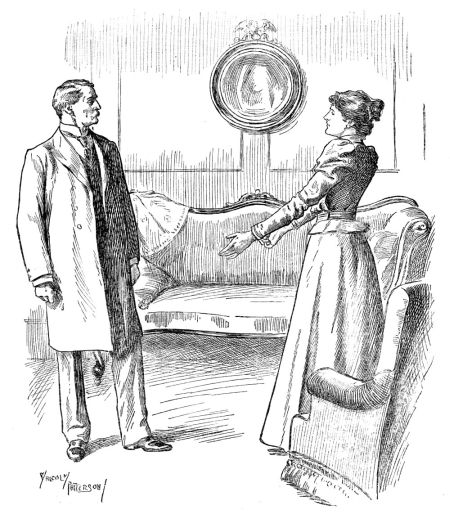
"Oh, cannot you help me? It is so hard!"
She looked at him wistfully. He turned away from her eyes and hid his face in his hands.
"It was a mistake," he said, slowly, dully.
"Yes."
Still she waited.
He looked up, and she strove to read his face in vain.
Sad it was, and set, and yet there was a light there too.
He took her hands gently in his.
"Kathleen," he said earnestly, "God knows what I think of you. I can work now. Good-bye, dear."
She raised her eyes to his—mystified and anxious.
He answered them, very gently, but with a firmness there was no gainsaying.
"You are famous," he said; "when I have made a name I will come to you. Will you wait, Kitty?"
"For ever, Hugh," she answered, understanding him so well that that was all she said.
He bent and kissed her hands.
She knelt at the side of his bed, heedless of the presence of the nurse at the other end of the room, and her tears[132] wetted his hand. The right hand and arm were swathed in bandages.
He smiled sadly as he looked at her.
"I am a failure," he said.
"Ah, no, no! All England is ringing with your name. Hugh"—she raised a face all alight with a proud joy—"you are famous now!"
A little flush rose to his white face.
"Pshaw!" he said, "rescuing a woman and a few children from being burnt to death. Anyone would have done it."
"Ah, no, Hugh! Brave men shrank from that awful sea and burning ship!"
He was silent, looking at his bandaged hand.
"I must learn to write with my left hand," he said.
She bent nearer.
"Let me write for you," she whispered; "let me finish your book, Hugh, while you dictate it to me. I do not sing now in public, you know."
"Yes, I know."
He drew her closer to him and rested his cheek against her soft hair.
"I said I would not come to you till I had made a name," he said. "I am a wreck now! I shall be a wreck for a long while——"
"Ah, dear, but you are famous!" she interposed lovingly.
He sighed.
"I cannot do without you any longer, Kitty. I am beaten at last. Will you take a wreck?"
"I will take you, Hugh, a famous——"
"A famous wreck," he finished with a smile.
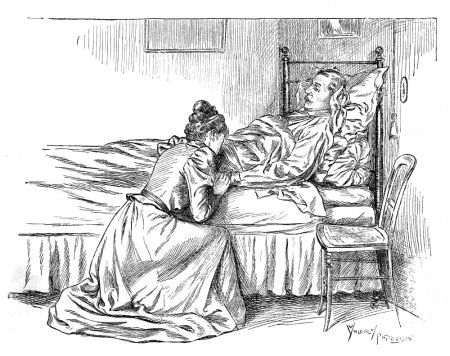
"Let me write for you," she whispered.
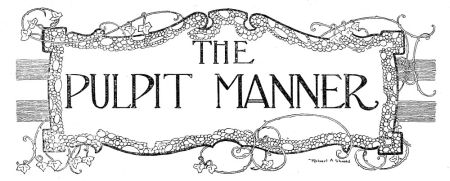
By F. M. Holmes.
First let us look at Dr. Joseph Parker. His sermons are constantly attended by ministers of all denominations, including clergymen of the Church of England; and no stronger testimony, we take it, could be given to a man's extraordinary preaching power than that year after year he continually attracts other preachers.
Dr. Parker, it is almost needless to explain, is the eminent Congregational minister of the City Temple in London, and he occupies the unique position of having maintained for thirty years a noonday service every Thursday in addition to his usual Sunday services. To this Thursday service come persons from the ends of the earth, and ministers and laymen of various religious persuasions. On one occasion the sittings of a conference belonging to one of the minor Methodist bodies seemed seriously imperilled because so many of the delegates desired to go and hear Dr. Parker.
What is the secret of his widely attractive power? The answer comes in a word—he is intensely dramatic. We do not mean theatrical. He chooses a clear message to deliver, and that message—that paramount thought—is driven home to his hearers in a manner that forces itself upon every mind, no matter how reluctant. He uses short, pithy sentences, and heightens and emphasises their effect by suitable modulations of voice, by deliberate or rapid utterance as the words may require, and by vigorous and appropriate gesture. He speaks only the very pith and point of what he has to say, and then says it in the clearest and most suitably effective manner that he can possibly command. It is the thing itself we hear, rather than talk or argument all round and about it.
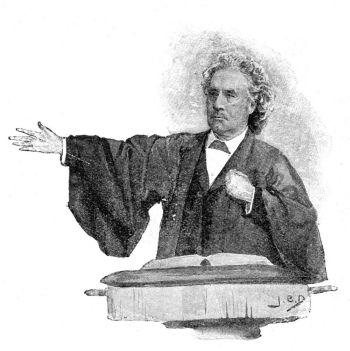
DR. PARKER.
Thus, on one occasion, his theme was found in the text, "Jesus in the midst."[134] "Where is the midst?" he asked in a clear and striking, sonorous voice that commanded attention at once. These were his opening words, and after a pause he proceeded in the same manner and in similar short, striking sentences to point to different ideas of "the midst," and to declare that Christ was, or should be, in the midst of the literature, science, philosophy, and business of the day. Unless ministers preached Christ, said he, they had better be silent.
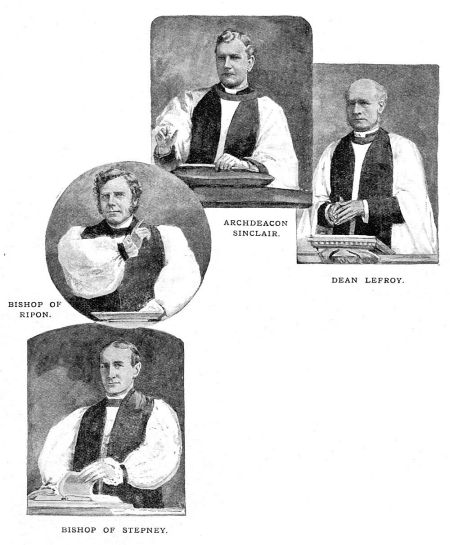
BISHOP OF RIPON. ARCHDEACON SINCLAIR.
DEAN LEFROY.
BISHOP OF STEPNEY.
There is nothing new in this, you will say. No doubt Dr. Parker would tell you that he does not wish to preach anything new; but no one can watch him critically without concluding that he constantly studies not only what he shall say, but how he shall say it in the most striking and effective manner.
As a dramatic preacher, we might also instance the Rev. J. H. Jowett, who has succeeded the late Dr. Dale at Carr's Lane Congregational Church, Birmingham. To his Oxford scholarship Mr. Jowett has united an assiduous cultivation of a fine voice and vigorous yet graceful and suitable gesture, which render him a most striking and fascinating preacher.
But turning now to other styles, if Dr. Parker is one of the most dramatic, Dr. Boyd Carpenter, the learned Bishop of Ripon, is one of the most eloquent of preachers. He is also one of the most rapid. He seems so fully charged with his subject that the words pour from his lips like a torrent; his body turns first to one side and then to the other, and anon leans forward in front, as though propelled by the energy of the thought within. His hand is often held up before him with the index finger pointing, as though to lead his audience on to the next thought, and to prevent their interest or attention from flagging. But, rapid and fluent as he is, it must not be thought that he is superficial; on the contrary, there is every evidence that the discourse is well thought out, and[135] based on a solid framework of reason, while the language is eloquent and rhetorical. And it is, as it were, to mark the network of logical deduction within the words that the index finger is brought so fully into play. We judge that his voice is naturally somewhat thin and poor, but by careful use and perhaps assiduous cultivation, and by the most beautifully clear articulation, Dr. Boyd Carpenter can make himself heard in St. Paul's with what appears to be perfect ease. There is no straining of the voice and no shouting; but in a quiet though forcible manner he sends his voice round the huge building. Further, it has been pointed out to me that he will not commence his discourse until the congregation have settled themselves down into absolute quietness, and all the rustling of dresses, and coughing, and fidgeting are stilled. Under these circumstances his voice would, of course, carry far better in a large church.
Somewhat similar in manner is Canon Barker, of Marylebone, who, in the energetic expression of the thought with which he seems surcharged, bends forward sometimes so deeply towards the congregation as to give, the impression that he is about to dive out of the pulpit. But his style is that of the special pleader, the advocate and the debater; it is as though he desires to argue out everything to its logical conclusion, rather than to sway or move his audience by eloquence and emotional appeals.
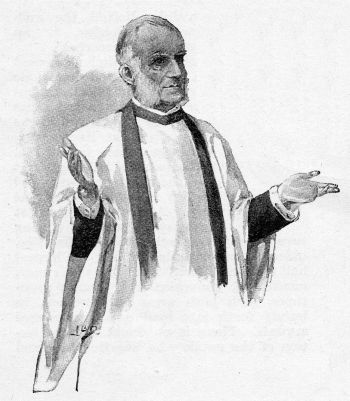
PREBENDARY WEBB-PEPLOE.
Dean Lefroy of Norwich is also a debater; perhaps, a more keen debater than Canon Barker, and he is also a rhetorician. He delights to preach a strongly evangelical "Gospel" sermon, and to embellish it with rhetoric and declaim it with passionate earnestness. It is evident he thoroughly believes in his theme, he seeks to impress it on his audience by vigorous, earnest, passionate utterance, in which his energetic gestures are often of the most decided character. A curious characteristic of his preaching has been related to me by a friend. "You cannot listen to Lefroy for five minutes," said he, "without violently taking sides either for or against him. You are either intensely in favour of him or find yourself becoming almost vehemently opposed"—a testimony, we take it that the Dean[136] is a decided, downright, assertive and aggressive preacher rather than persuasive and emotional. He has instituted a Nave service at Norwich Cathedral, at which he often preaches himself, and attracts enormous congregations.
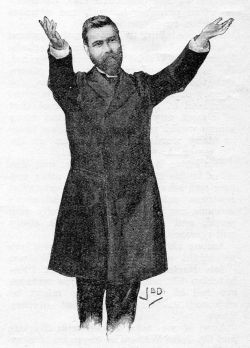
JOHN MCNEIL.
Still continuing to glance at those whom we may call rapid and fluent preachers, Prebendary Webb-Peploe comes to mind. He is not so energetic as some others, but the rapidity of his utterance, the fluency of his expression, and his great command of language, would rival that of almost any speaker. He and many others would probably utter three times as many words in a given time as Dr. Parker or Archdeacon Sinclair.
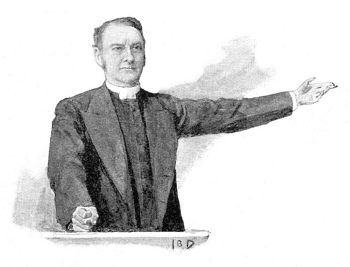
IAN MACLAREN
(Dr. John Watson.)
The latter is slow, deliberate, and dignified in his utterances, rarely using gesture and affecting a grave and somewhat sonorous voice; but the Archdeacon's sermons are always most carefully prepared, and indicate considerable study and research.
Among the grave and sedate preachers we might also place Dr. John Watson ("Ian Maclaren"), of Sefton Park Presbyterian Church, Liverpool; his sermons are full of thought, and, as might be expected, exhibit an excellent literary finish.
Now, if we take Archdeacon Sinclair and Dr. John Watson as examples of more deliberate and sedate preachers, we may regard the Rev. John McNeil, the well-known Presbyterian minister, as an instance of the colloquial preacher.
Not that his voice is low-pitched, as used in conversation. Mr. McNeil has done what few preachers could physically undertake: he has preached twice a day for a fortnight in the Albert Hall at Kensington, the largest hall in London, and capable of holding about ten thousand persons; and he has repeatedly filled the huge Agricultural Hall at Islington, numbers being turned away from lack of room. His voice, indeed, seems capable of filling the largest hall without effort. But his style is easy, unaffected, conversational, though sometimes, with both arms outstretched, he bursts forth into loud and impassioned appeals. There is no doubt a large section of the public who like this easy and colloquial style, especially if it come quite naturally to the speaker.
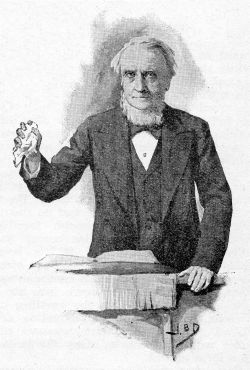
DR. MCLAREN.
And now another celebrated figure rises on the scene, the eminent Baptist minister,[137] Dr. McLaren of Manchester. Refined, scholarly, brimming over with knowledge, and a master of beautiful illustration, there is no doubt that he takes rank as one of the very greatest preachers of the day. Like other great speakers, he has evidently studied the art of preaching.
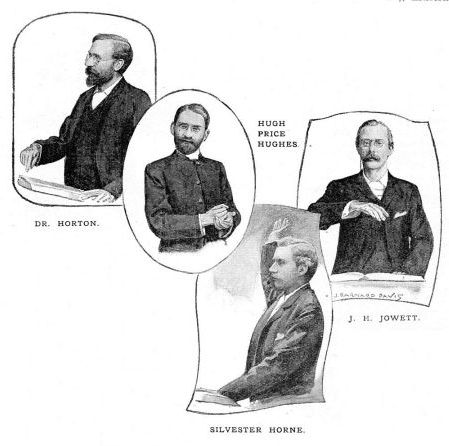
DR. HORTON. HUGH PRICE HUGHES. J. R. JOWETT. SILVESTER HORNE.
At a meeting at the Holborn Restaurant to celebrate his ministerial jubilee in April, 1896, he said he had determined, at the outset of his career, to concentrate his mind on the work of the ministry and not fritter away his energies over many minor engagements. He had always endeavoured to make his ministry one of Gospel exposition; he had preached Christ because he believed that men needed redemption, and he had preached without doubts and hesitations. It was Thomas Binney who had taught him how to preach.
Undoubtedly Dr. McLaren has succeeded in his aim as an expositor of the Scriptures, for that is regarded as one of his chief characteristics. A favourite gesture of Dr. McLaren's—at all events in his earlier days—was to squeeze up a handkerchief, no doubt quite unconsciously, in his right hand by the nervous energy he was putting forth in his discourse, and then suddenly his hand would dart out to mark some emphatic passage as though he were about to throw the handkerchief at the congregation; but needless to add the handkerchief was never thrown.
Like Dr. McLaren, Dr. Whyte, of Free St. George's, Edinburgh, has a great command of beautiful and striking illustrations. "He is the most wonderful preacher in Scotland," declared an enthusiastic Scot to me on one occasion. "Mr. Gladstone used often to hear him, and Lord Rosebery does now." Dr. Whyte makes great use of the imagination in his discourses and employs frequent gestures, but graceful, emphatic and always to suit the action to the word and the word to the action. "One illustration," said a gentleman, "I remember some time ago. Dr. Whyte was preaching about tribulation, and he showed that the word came from tribulum, which is a Latin name for a roller or sledge for thrashing out corn, and in the same way tribulation sifted men as wheat." How like a platitude this may sound when summarised down to a line; but the point is that the idea of the beneficial purpose of tribulation had been so firmly fixed in the hearer's mind that he remembered it, and perchance in some dark hour it[138] had been to him a "cup of strength in some great agony." Is not that, after all, one of the great aims and one of the great tests of good speaking—to fix some idea, some truth firmly in the hearer's mind so that it is never forgotten?
As a robust, manly preacher few, if any, we suspect, can surpass Dean Hole of Rochester. He has a tall, commanding presence—he is over six feet high—a bright, animated countenance, and a most genial manner. When some years ago he held the living of Caunton, Notts, he used to journey periodically to Liverpool, where his midday addresses to commercial men were most successful and exercised great influence. He does not employ much gesture, but his fine voice, sparkling eye and manly, straightforward utterances, based on reason and logic, always command deep attention.
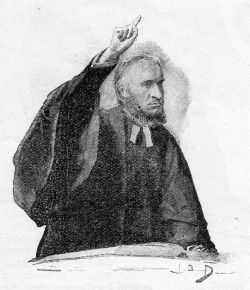
DR. WHYTE.
His appeal is rather to reason than to the emotions, and by way of contrast we may glance at Canon Wilberforce, who is fluent and fervent, and affords one of the best examples of the emotional preacher. It would seem as though he set himself to arouse and stir up all the feelings of his congregation and lead them into what he conceives to be the right channel. Often choosing most unusual texts, he can yet make direct and pointed appeals from the pulpit, touching the greatest hopes and deepest trusts of human nature, and yet can employ as illustrations the greatest events and the newest discoveries of the day. He uses but little gesture, in this respect being somewhat different from the eminent Wesleyan, the Rev. Hugh Price Hughes, who might also be classed as an emotional—we had almost said passionate—preacher. In fluency and fervour he is probably surpassed by none. Possessed of a remarkably clear, vibrating, and penetrating voice, which seems as though it could thrill through any building, however large, there is no chance of anyone dozing when he is in the pulpit. When pleading some cause or denouncing some wrong, his feelings seem to get the better of him, and he slashes away with his voice in a perfect hurricane of verbal blows.
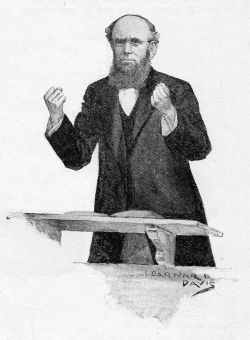
DR. CLIFFORD.
Quite as emotional and quite as fluent is Dr. Clifford of Westbourne Park Baptist Church. His command of language is extraordinary, and with a mind less clear and well-regulated this great fluency might prove a snare; but his discourses[139] are always remarkably well-arranged, his "points" are clear, and his meanings driven home with remarkable emphasis. His congregations are immense, and his hearers are devoted to him. His gestures often follow his words, and one—probably quite unconscious—is, it must be confessed, not graceful, even if forcible: it is a drawing back of his arms, and then shooting them out both together as if appealing to the people. His voice is exceptionally clear, penetrating, and resonant; and in all very popular preachers much is due to the voice.
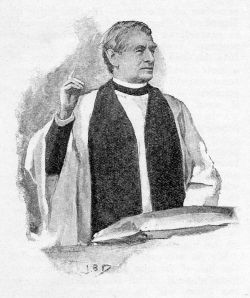
DEAN HOLE.
The Bishop of Stepney, who may be described as bearing all the characteristics of the highly cultured Oxford man, has in addition a deeply sympathetic musical voice. He does not use much gesture, but such as he does employ is well suited to the words, while his illustrations are often drawn from his social and religious work in the East End. He used frequently to preach in Victoria Park, where he has readily acknowledged his best supporters were Nonconformists.
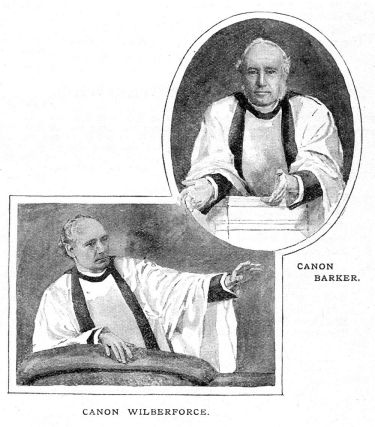
CANON BARKER.
CANON WILBERFORCE.
Another eminent preacher whom we may also describe as exhibiting all the characteristics of Oxford culture is Dr. Horton of Lyndhurst Road Congregational Church, Hampstead. Possessed, like the Bishop of Stepney, of a remarkably sympathetic voice, he modulates and varies it to suit the subject and the words, and his gesture, never redundant, has lately been reduced almost to extinction. At the sermon which he preached before the Congregational Union at its autumnal assembly at Birmingham in 1897, his style was almost severely quiet, but the effect of his thrilling voice and sometimes awesome whispered tones, his polished literary language, and his intense earnestness—as he declared that the ideal Christian must be in constant touch with God, and yet in constant touch with men—was very great, and[140] appealed both to reason and emotion. Indeed, both of these find their place in his sermons. Dr. Horton has mastered the art of always being interesting, no matter what his theme; and it would seem as though in his discourses he makes an effort to really interest and to reach all sorts and conditions of men.
Another Congregational minister who exhibits much of the Oxford manner is the Rev. Silvester Horne, of Kensington; but, in addition, he seems possessed of a fiery zeal and fervent enthusiasm that will, it is feared, wear him out physically before his day is fully spent, unless he carefully husbands his nervous energy. Already, although a young man, he has had to take rest for a whole year because of ill-health. That inner fire, that mental energy, that disciplined enthusiasm, which light up his face so brilliantly and animate his suitable and graceful gesture, are far too precious a possession to be quenched too quickly; but there are few or none of the younger preachers of the day who have promise of a more brilliant future.
And now a word in conclusion for one who is perhaps the greatest philosophical preacher of the time—Dr. Fairbairn of Mansfield College at Oxford. His memory is marvellous, his power of choice and accurate verbal expression is wonderful; he can speak for hours without a note, and though sometimes a sentence should appear involved and complicated, it will finish admirably, and, if read in a verbatim report afterwards, will have all the finish of a literary production wrought out in the quiet of the study. He uses but little gesture, an occasional opening out of hands and arms, as though to present and lay before the audience the thought which he is uttering, seems nearly all. In fact, it would appear that he is so absorbed in the abstract thought, the argument, the philosophy he is working out before you, that he thinks nothing of the manner in which he utters it.
We do not pretend to have exhausted the list of famous preachers, or even to have glanced at all the different types; but these will be sufficient to indicate the variety that prevails, and to show that there is an art of preaching which, like other arts, needs to be assiduously cultivated, and well repays those who intelligently do so.
A pathetic incident occurred some years ago in connection with one of our
wars abroad. A youth who had been wounded, and who died in the field
hospital, clutched in his last hours an old worn copy of the Bible, on the flyleaf
of which were inscribed these touching lines:—
TO MY BOY.
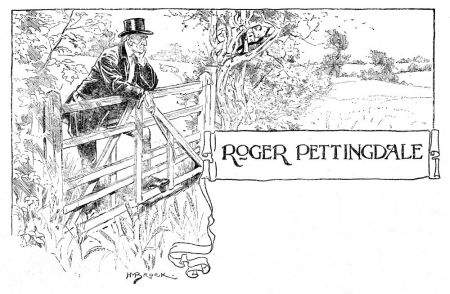
By H. A. Davies.
Across the fields from the church—through the clover meadow first, into the broad wheat-field next, and thence over the pasture lands, all yellow with the glint of buttercups—you will come to the Pettingdale farm. A thrill and a song and an aching went through my blood all together when I looked on the block of buildings the other day. How sweet-and-bitter is remembrance; how musical to the heart, and yet how sad with yearning! For the sight of that rugged old chimney standing square and grim and familiar upon the grey roof of the house; the red-tiled barns clustering behind, plain and prosperous; the sweep of the waving corn-fields towards the setting sun; caused my heart to surge with swift memories, long since buried and forgotten beneath the stress of life. How peaceful were the old days amidst these very fields! When the heart is young, ah! then's the time for music; and what echoes of far-off melodies—songs of old summers past and gone—does the scene awaken! There's the orchard where I spent such rare hours. Here are the hedges where we went a-nutting. Yonder is the oak-tree which we used to climb, Frank Pettingdale and I. It is still the same sturdy tree, keeping gnarled and knotted guard over the same creaking gateway, just as in the old days!
Wherever my eyes fell there were thorns and roses for the heart all in one moment. It was in the old upland field that Clara Pettingdale and I as children used to wander, hand in hand, amongst the buttercups. She has long slept, poor Clara, in that corner of the churchyard where lie generations of Pettingdales past and gone—a long line of sturdy yeomen.
The full light of the sun falls upon the courtyard of the farmhouse. It has a broad frontage, long and low and quaint, with irregular gables and overhanging eaves and deep, mullioned windows. The house runs queerly on two sides of the courtyard, one wing being at right angles to the other. It is beautifully clean and prim, with its whitewashed walls, its freshly painted woodwork, and its geraniums growing in green boxes on every window-sill. On the third side of the yard run the granary and the cider-house; while the fourth, save for an ivy-covered wall, which gives way to the entrance gates in one corner, is open to the gentle vista of countryside which stretches away before the house. What a pleasant old courtyard it is—so cool in the summer that the panting dogs love to throw themselves upon its stones; so[142] sheltered in winter that the blustering nor'-easters touch it not; so prosperous-looking always, with its well-kept flags laid from end to end, as level and smooth as a billiard-table, and as spotless as the floor of the farm kitchen. How the polished milk-cans glisten and blink upon the wall! How the white sills of the old-fashioned windows gleam in the sunlight! The whole place seems to breathe of scouring and buckets, and scrubbing brushes and vigorous arms. Every morning the yard is washed down by the house-boy (it used to be Elijah in my day, but he is now a bearded man, and labours outside, and a young Ezra is the present knight of the bucket); every morning the cans are scoured and the tubs are scrubbed, and the step before the door is free-stoned, and the flowers are watered, and the house seems to smile a glistening, watery smile, as though it had just lifted its head from its morning dip to bid you the time of day. There was ever a charm to me about Pettingdale and its paved courtyard. I mind me well what a brave and romantic sound to my young ears was that of the horse's hoofs ringing and clamping upon the stones as he was brought up to the door on market days with the high yellow dogcart behind him; or the clatter of the wheels across the yard as Roger Pettingdale drove out through the broad gateway, a fine old figure with his white hair, and his aquiline nose, and his broad, well-set shoulders.
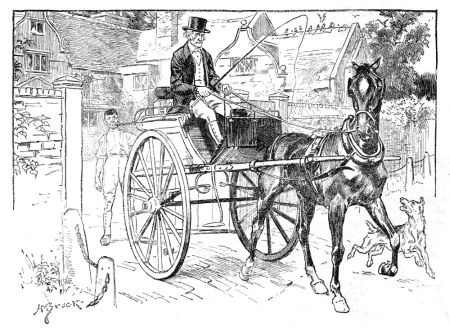
His hair went snow-white early in life.
He is still outwardly the same. One could hardly detect a single point of change in him, save that his face is more furrowed and his eyes deeper set. His hair went snow-white early in life. Generations of Pettingdales have been subject to the same peculiarity. Thus it is that the long step from forty to sixty-five has wrought little difference in Roger Pettingdale. His body is as erect, his step as firm, his voice as sonorous as ever. He was ever a well-known figure at all the county markets and agricultural meetings, and it might be twenty-five years agone for all the change that one can[143] see in him. Among other men he was always noticeable, with his tall figure, his white hair, his clean-shaven, well-cut face, and that wide-rimmed silk hat which he always affected. As he moved amongst the crowd I have heard men say, "Who is that?" and others answer, "Don't you know him? Why, surely everybody knows him? He's Roger Pettingdale."
He is elected on all the local bodies. Thus he is a guardian of the poor, a member of the School Board, vice-chairman of the County Council, and the people's churchwarden at the parish church. There is no man amongst all those he meets in these capacities whose words are listened to with more respect. That solid weight, that hallmark of sound judgment which always attends upon sheer common-sense, is apparent in every opinion he utters. He forms his judgments first, and speaks afterwards. While other men are impulsively throwing themselves into useless controversy on this or that vexed question, Roger Pettingdale is silently weighing the pros and cons of the matter in his own mind; and when he speaks there is usually nothing more to be said. He chops no logic; he simply argues with the sledge-hammer of common-sense, backed up by the blunt, uncompromising sincerity of an honest and fair-dealing mind. His tolerance, his breadth of vision, his power of seeing the other side of the question, his scorn of all shams and pretences, have made his name a password for integrity and sound judgment. "You will always get a fair hearing from Roger Pettingdale," people say. "Does Roger Pettingdale think so? Oh, then, there must be something in it."
In his home life, in the control of his farm, in his own daily affairs, there is the same straightforwardness, the same sincerity, the same well-balanced judgment and acumen. "There never was a year, as I remember, when we didn't have plenty of hay to begin conditioning on," said one of his labourers the other day. "Now, at the next farm they've never got enough." That is only a small instance of the perfection of method which marks every department of the prosperous farm.
At home he is essentially a plain man, this sturdy farmer. There is no nonsense about him, although he can claim blood with one of the oldest families in the county. Yet he has a proper pride, in a manly, direct kind of way, as you shall see. He has had four children, two boys and two girls, in giving birth to the youngest of whom his wife died. James, the eldest, is his right hand in the farm management, and will some day be head of the family, as the Pettingdales have succeeded, son to father, for generations out of mind. Mary, the second, you shall hear more of anon. Frank, the third, my old playmate, early in life took the fancy that he would like to be a soldier. Roger Pettingdale has ever been a wise and a tolerant father, studying well the nature of each of his children. He unerringly knew Frank's proud and stubborn character.
"You want to be a soldier?" he said. "Well, I could have wished it otherwise, Frank. It would have been a pleasure to me to see you settle down on the farm. But we will not argue the point. Let it stand for twelve months, and then talk to me about it."
Twelve months did not change Frank's resolve. When he mentioned it again, a drawn look passed over Roger Pettingdale's face for a moment—a look of keen pain—for he loved his children. Then he drew himself up to his full height.
"You are still of the same mind, Frank! Then I have nothing more to say. I am not going to attempt to dictate to you what your calling should be. You have to live your own life, and as you make your bed you must lie on it. Remember that, my lad. If you decide to go as a soldier, you shall go in a proper fashion, lad. You shall have your commission. No son of mine shall enter the ranks."
And have his commission Frank did. I looked at the tablet in the old church the other day with a surging heart. It is a brass tablet, the lettering of which has been recently renovated.
TO THE MEMORY OF
LIEUTENANT FRANK PETTINGDALE,
WHO FELL IN ACTION IN THE
BATTLE OF TEL-EL-KEBIR.
That was all. There was no vainglorious recounting of the brave deed in the[144] performance of which Frank was cut down. He fell "in action." That was all. It was Roger Pettingdale all over—simple and direct and manly. And were not the laconic words far more eloquent than all the ornate elegiacs that poets might have written, just as Roger Pettingdale's silent grief when the news reached him was far more eloquent than all the passionate outbursts of frenzied sorrow that one could conceive?
The fourth child, Clara, as I have already said, sleeps in the churchyard. She died when she was a fair-haired girl of ten—as bright and promising a maiden as one could wish to see. But she was ever fragile, like her mother, and suddenly she faded away, leaving a great gap in the home life at the Pettingdale farm.
As to Mary, the second child, she was nineteen years of age, and newly returned from school, when Edward Leigh, the son of old Squire Leigh, of the Hall, came home from his travels round the world. These two, who had only distantly known each other as children, met for the first time after many years—she a sweet-looking, fresh-coloured girl, in the first blush of womanhood; and he a manly, well-set young fellow with a pleasant, sincere face and straightforward blue eyes. It was the old story! Twang goes the bow of the roguish little archer, and to some heart or another the world all at once becomes rose-colour. The old story! They saw each other on a Sunday morning across the church. She, sitting in the Pettingdale pew, mentally noted that there was a young man at the Squire's side who could be no other than his newly returned son; and he, from his corner underneath the dingy, ponderous coat-of-arms of the Leigh family, looked upon her in her simple dress of white. The sun, striking through the window to her right, glinted upon her brown hair, which always curled so prettily about her forehead. He thought, as he looked, that she was the sweetest, daintiest maiden he had ever seen, and he fell in love with her.
He made no secret of his passion. Beating about the bush was entirely foreign to Edward Leigh. The choleric old Squire went off into a fit of apoplectic rage when he heard how things stood. The veins swelled in his forehead, and that pugnacious under-lip of his stood out and drew itself over the upper lip and the teeth with a tight grip. But Edward had all the old Leigh blood in him. "I love her, father," he said quietly, looking the Squire straight in the face, and the old man's heart sank within him as he met the steady glance of those blue eyes. Fits of passion, threats, fiery denunciations—they were all of no avail. Edward was never once other than respectful. He would stand with shoulders squared and head uplifted, bearing the storm in perfect calm and silence, and then would look his father in the face and say—"Father, I love her"; and the Squire would clench his fist and march to and fro, furiously stamping his feet upon the floor.
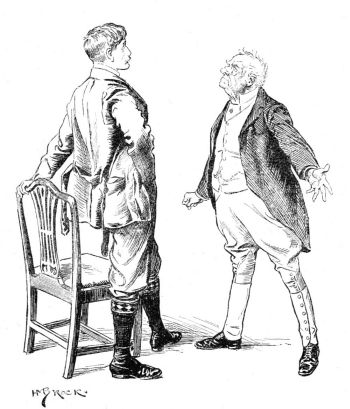
"Father, I love her."
In one culminating fit of choleric rage the Squire rode over to the farm. He found Roger Pettingdale in the corn-field, looking at the growing wheat.
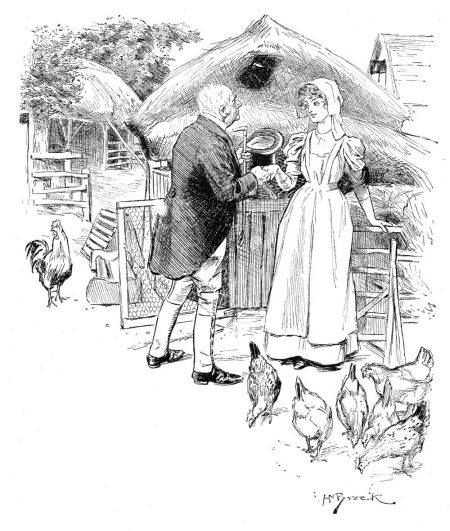
"Forgive me!"
"Look here, Pettingdale," he burst forth fiercely. "This nonsense must be stopped. Are you an idiot, that you cannot see what is going on, or are you in the scheme to entrap my——"
Roger Pettingdale turned round upon him.
"I beg your pardon, Squire Leigh?" he said quietly, as one who had not heard aright.
"Tut! Nonsense!" retorted the Squire. "Don't 'beg-your-pardon' me! You know full well what I mean. Are you blind? I say it must be stopped! You know full well that that precious son of mine has gone stark mad over that chit of a girl of yours!"
"And what of that, Squire Leigh?" replied Roger Pettingdale, drawing himself to his full height and looking at the Squire from underneath his heavy eyebrows. "If that precious son of yours has gone stark mad over my daughter, what of that?"
"Why, this," thundered the Squire: "that it must be stopped!"
"Very well, why don't you stop it?" replied Roger Pettingdale.
The retort, perfectly cool and natural, laid bare all the Squire's impotence at one stroke, and drove him well-nigh to frenzy. His eyes shot fire, and those veins in his forehead swelled as though they would burst.
"It is not my daughter who is coming to the Hall after your son," Roger Pettingdale went on. "It is your son who is coming here after my daughter. You seem to forget that point. You say it must be stopped. And I repeat—Why don't you stop it?"
"It is as I thought," shouted the enraged Squire. "You are all in it—all of[146] you. All in the scheme to entrap him! A pretty plot, don't you call it, for a man who poses as a Christian?"
In a blind access of fury he took a step forward and raised his riding-whip. And then his shaking arm fell to his side, for Roger Pettingdale had laid a hand upon his shoulder, and was confronting him with grave, kindly, pitying eyes.
"You are in anger, Squire Leigh," he said, with simple dignity, "else I should take your words as an insult. Be sure that the Pettingdales have not fallen so low, nor their womenkind either, that they need to trap the son of Squire Leigh. But I tell you this, as man to man: if your son truly loves my daughter, and if she loves him in return, I will put no bar before my child's happiness; no, not for you, nor for all the Leighs in the world. We come of as good a stock as you, Squire! Remember that! More money and more land maybe you have—but not more pride of family. I care naught for your money or your land. Thank God! I have prospered beyond all expectation. And I tell you again, straight to your face, if your son comes to me and asks for my daughter's hand, and I find it is for her happiness, I shall say 'Yes.'"
"I shall disinherit him!" burst forth the Squire; "he shall not have a penny—not a brass farthing!"
"I shall tell him," continued Roger Pettingdale, "that if he would win my daughter, he must first make a position for himself in the world, independently of aught you can do for or against him; and that shall be the test of his sincerity."
Then he turned away, and the Squire, his face livid with passion, marched off, savagely cutting at the wheat-ears with his riding-whip. And when he mounted his horse at the corner of the field, he dug his spurs so viciously into her that she bounded and reared, and almost threw him.
Well, the long and short of it was that Edward Leigh was not found wanting in the test which was imposed upon him.
"You are quite right, sir," he said to Roger Pettingdale; "the condition is a reasonable one. I ask for nothing more than the chance of proving that I am in earnest."
He went to London, studied under his father's old college friend, John Wetherell, the well-known Queen's Counsel, and in five years was making fair headway in the courts as a barrister. And the strange part of it was that the choleric old Squire—who has a good heart underneath his rough exterior—seeing his son's name in the papers from time to time, felt his paternal pride rising within him despite his stubborn resentment. Perhaps, too, he felt lonely in his old age. At all events, he went over to the farm one day, and asked to see Mary.
"I shall fight against it no longer, my dear," he said, holding out his hand. "The lad has proved his grit, and the woman who can call forth such steady love in a man is more than worthy of being mistress of the Hall. I am an old man, and have no time left for bitternesses. Forgive me, and you will find me as staunch in friendship as you have found me frank in enmity."
Mary is now Mary Leigh, of Leigh Hall, and a sweeter, gentler, more winsome mistress you could not find in the whole land. You may often see the old Squire leaning upon her shoulder—a bent, white-haired figure—as they walk in the grounds.
Among all the seasons of the year, I think there is none that Roger Pettingdale loves so well as the time of harvest. You may see him standing at the gateway, looking in meditation down the long shimmer and sheen of the golden wheat-field as the wind ripples over it.
"I love to gaze at fields white with corn," he said to me once. "They seem to breathe rich promises of that full fruition to which our own lives shall come if we live them well and uprightly."
At the last harvest thanksgiving service in the village church I was present for the sake of old times, and from my place behind Roger Pettingdale I saw him lost in meditation, with eyes fixed upon the chancel window. And when he stood up to sing he was still rapt in thought; but suddenly he joined in the sweet old hymn so lustily and with such a full heart that it did me good to hear him.
By the Ven. Archdeacon Diggle, M.A.
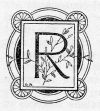
Reading aloud is more commonly regarded as an accomplishment than an art. In truth, it is both. It is an art in that it cannot be left to its own guidance, but requires both an acquaintance with rules and familiarity with their practice to bring it to perfection. It is an accomplishment in that it is a means of completing our equipment for happy social life. Good reading yields not only profit but pleasure to others. It is one means of throwing brightness into home-life to gather the children together and read really well to them. And what a sweet delight it is in the ward of a hospital, or among the inmates of a workhouse, or by the bedside of some dearly loved invalid, to be able, by reading in soft, gentle, refreshing tones, to charm away the monotony and the weariness, perhaps for awhile to relieve even the pain, of the lonely and the suffering! We might shed sunshine into the darkness of many a life if, instead of spending our leisure hours in ennui on ourselves, we devoted them to reading aloud to others.
Reading aloud is good for ourselves both physically and morally. It is good morally, for if we never read anything unfit for reading aloud we shall not be likely to read anything morally deteriorating. And physically, reading aloud is a benignant exercise. It widens the chest, opens the lungs, strengthens the throat, and does good to all the breathing organs. It is a mistake to suppose that using the voice weakens it. Abuse or misuse of the vocal organs, as of any other organs, injures them; but by proper use and exercise they are strengthened and improved. Speakers and preachers have bad throats not because they use their throat too much, but because they use it badly. They force and torment it, instead of training it to natural action and giving it free, full play. And who shall blame them? At school they were taught to spell and mind their stops; but how to breathe and manage the voice when reading, they probably were not taught a single rule. In many instances teachers themselves are wholly ignorant of the art and therefore incapable of teaching it. And so it comes to pass that, unless either outward circumstance or innate common-sense turn our attention in later life to the management of the vocal organs, we never learn to read aloud without weariness and with pleasure. It is mainly through lack of early training that, of all useful and delightful accomplishments, the art of reading aloud is one of the least practised and most rare.
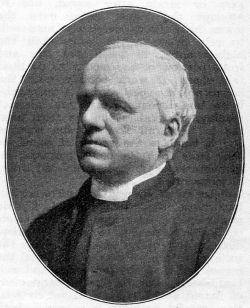
(Photo: Russell and Sons, Baker Street, W.)
ARCHDEACON DIGGLE.
Yet it is an art which, in some degree, may be acquired by the majority of people; very many could, by a little training and perseverance, even excel in it. Of course, the art admits of many degrees of excellence. But without reaching the splendid summits of the art, attainable only by the highly gifted few, ordinary persons may learn to[148] read sufficiently well to gratify both themselves and others, if they will take pains to learn and practise a few simple rules.
The first requirement is to master the physics of the art: to learn to breathe in through the nostrils and out through the mouth, never to speak on an inflowing breath, quickly to fill the lungs and slowly to empty them, never to gasp or strain after sound, not to attempt the higher notes until the lower have been completely mastered, to rely more on the lower than the higher notes, to teach the lips and front portion of the mouth to do their fair share of work equally with the larynx and the vocal cords. A moustache is an impediment to easy and distinct reading. It hinders the air from passing in free, full flow up the nostrils, and it troubles the waves of sound as they issue from the mouth; causing indistinctness, more or less flat and thick, in enunciation.
Clearness of enunciation ranks next in importance after easy, natural, flexible production of voice, and largely depends on it, for there can be no clear, crisp, distinct enunciation of words, unless the tools by which words are made, viz. the organs of voice, are kept sharp and well burnished. Moreover, for the attainment of limpid and finely articulated enunciation careful training is required both in the melody and modulation of sounds.
Precision and beauty of enunciation are much assisted by habitual practice of the graduated series of all the tones from the keynote to its octave. Do not sing when you are reading, but, in order to read well, first learn to sing; otherwise your reading will be flat and monotonous, without light and shade, instead of being fresh, richly modulated, and melodious.
The next requirement of good reading is to learn the relative value of the letters, and the right handling of the syllables, of which words are composed.
This study is both interesting and attractive, for, as Plato observes, letters themselves have a clear significance. The letter r is expressive of motion, the letters d and t of binding and rest, the letter l of smoothness, n of inwardness, the letter e of length and the letter o of roundness.[2] Letters run in families, and each family has its own characteristic significance of sound. Some letters belong to the lips, others to the throat, others employ the whole mouth. Vowels and final consonants are the letters which demand most care and support in good reading. For the most part, vowels should be rich and full, and the final consonant well sustained.
[2] Cf. Jowett's Plato, I. 311.
If letters in themselves are expressive and significant, collocations of letters in syllables and words are clearly more significant still. "By various degrees of strength or weakness, emphasis or pitch, length or shortness, they become the natural expressions both of the stronger and the finer parts of human feeling and thought." To read well, therefore, it is necessary to give intelligent and ready heed to the relative weight of words, to notice whether consonants are massed together to increase their density, or vowels are freely interspersed to leaven and make them light. True enunciation largely depends on a careful study of the natural formation of words and a right appreciation of the proportionate value of their several syllables.
Reading, however, is frequently spoiled by pedantry and exaggerated minuteness. In seeking to avoid slovenliness readers often fall into foppery. Good reading goes at an easy pace, it is neither too fast nor too slow; it neither counts the letters nor omits them, neither jumbles syllables together nor anatomises words. The good reader reads so that intelligent listeners can spell his words, but he does not read as if spelling them himself. He avoids the extremes both of negligence and nicety, and constantly remembers that whatever is overdone is badly done. Avoid ostentation. No rule in reading is more fundamental than this.
Near akin to ostentation is the taint of false and histrionic emphasis. Colourless reading, bad though it be, is better than tawdry reading. Especially in all reading of a religious or sacred character should affectation and dramatic artifices be reverently avoided.
To read the Bible in church as if playing a part on the stage is as inappropriate and irreligious as to read like one in haste to catch a train.
Each kind of subject demands its own proper style in reading. Prose should[149] not be read like poetry; nor all kinds either of prose or poetry alike. As in writing, each species should be dressed in language from its own wardrobe; so in reading, each several kind should receive its own appropriate tone, and travel at its own appropriate speed. To read everything alike is to read nothing—or at most only one thing—well.
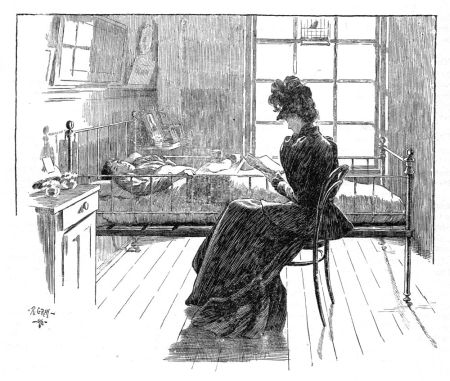
Charming away the monotony and the weariness.
Great authors are by no means invariably good readers, even of their own productions. Lord Tennyson read some of his own glorious poems beautifully; but others he read either droningly or with too much singsong. Dickens read his own works with wonderful power and realisation. Wordsworth read his own verse admirably; but we are told that neither Coleridge nor Southey could read verse well: "They read as if crying or wailing lugubriously."
Reading, therefore, is an art which doubtless requires, for the attainment of excellence, some degree of histrionic gifts—imagination, imitation, fervour, and passion.
Similarly with oratory and authorship. Both these arts are distinct from that of reading; as each of these again is distinct from the other.
It is curious, indeed, how few among great authors are great orators; or, among great orators, great authors. The gifts which tell in writing—condensation, terseness, finish—are not the gifts which tell most in speaking. In speaking, the essentials are clearness of enunciation, sympathy with the audience, copiousness of illustration, directness of statement, uninvolved reasoning. The merits which impart value to a book—wealth of fact, niceness in balancing opposing[150] considerations, delicacy of assertion, depth and sweep of argument—may easily become ineffective in the delivery of a speech. Hence, therefore, whereas a good speaker is occasionally a good writer, owing to his rare combination of different orders of talent, it more frequently happens that the one set of talents is given to one man to enrich them in seclusion, and the other to another man to use them with publicity.
In like manner with reading; it is an art by itself. It is natural to suppose that no one could possibly read an author's works so well as the author's self, because no one can understand them so intimately as their own creator. Yet experience proves this to be not the case; and for a reason which at first sight is not wholly apparent. It is just because they are his own that, as a rule, he cannot read them well. He may have a richly cultivated voice, clear enunciation, a varied power of modulation; he may even be able to read the works of others well, yet be a failure in reading what he himself has written. Why is this? Partly, perhaps, it is due to an unavoidable self-consciousness in reading his own works; and self-consciousness is the ruin of good reading. "Forget thyself" is a necessary condition of good reading. Partly, perhaps, it is due to over-absorption in the memory of sensations and sentiments which overpowered him when he wrote in the solitude of his chamber, but which are somewhat unnatural and overstrained for exhibition before a concourse of auditors. But probably the principal reason is that one of the greatest charms of good reading arises from the co-operation of two spirits toward one end—the spirit of the author and the spirit of the reader. The reader of another's works seeks actively to express the spirit of his author, yet unintentionally he is expressing his own spirit also. The author enters into him and he throws himself into the author; his reading, therefore, is the union, the marriage, the interpenetration and expression of two spirits—the author's and his own. However interesting, therefore, and delightful it may be to hear an author read his own works, yet is there always lacking the dash and force and suggestiveness produced when a great author is interpreted by a great reader. The author merely reproduces his original meaning in what he wrote; the reader, through the agency of his own independent personality, idealises and diversifies that meaning.
Idealisation is one of the most beautiful effects of the fine art of reading. The most ordinary poem or piece of prose, when idealised by an accomplished artist in reading, grows lovely and sweet. And one way of learning to read well ourselves is to sit at the feet of some of these great masters of reading. Until we have heard a great reader read it is next to impossible to conceive what a fine and noble art true reading is. On the other hand, we can never become good readers by merely listening to others, any more than we can become good musicians by hearing others play.
In the art of reading, others may be our models; none but ourselves can be our makers. Listening to others may show us how the thing can best be done, but without doing the thing ourselves the thing can never be truly learned by us. Sometimes, indeed, listening to others has an effect quite the opposite of a model for imitation. "Pausanias tells us of an ancient player on the harp who was wont to make his scholars go to hear one who played badly that they might learn to hate his discords and false measures." In like manner, one way of learning to read well is to hear others read badly.
The art of reading aloud culminates in the expression of the spiritual through the medium of the physical. As sculpture aspires to express its ideals in stone, and painting in colour, and music in sound, so reading embodies its ideals in uttered words. A well-trained voice, clearness of enunciation, rhythm and flexibility of articulation—these are the physical framework of the art of reading aloud. Without first acquiring these the reader is as impotent as the painter without colour or the sculptor without stone. But the physics of reading are nothing more than its material framework. Unless the reader is inspired with ideals, reading will never rise to the dignity and glory of an art with him. He may be as a house-painter with his brush, or a mason with his stone—an industrious and useful artificer, but not an artist in his work.

By J. A. Reid.
The subject of church architecture is ever a fascinating one. Millions of money and an immense amount of time and labour have been spent in erecting places of worship, some of which are magnificent structures capable of seating several thousands. On the other hand, small, humble edifices sometimes suffice to meet the requirements of the worshippers; and it is with these that we here propose to deal.
Which of the midget churches is the smallest it is somewhat difficult to say; but it is believed that the smallest church in England is the truly miniature church of Lullington, in Sussex. It is a primitive and quaint building, constructed of flint with stone quoins, with a roof of red tiles. It can boast of a little weather-boarded turret at its west end; but its bell does not toll now, and the birds of the air have long since found the turret a convenient nesting-place. The church is but sixteen feet square. The pulpit is a pew, with panelled sides and door, and the furniture is of the plainest. Five, narrow, diamond-paned windows throw a scanty light upon the interior, in which there is accommodation for thirty persons—quite sufficient for the population of the village.
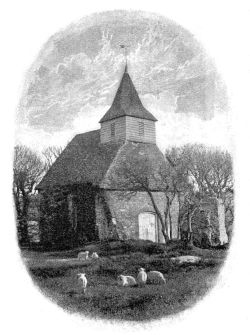
(Photo: H. J. Unwin, Hailsham.)
LULLINGTON CHURCH.
(Sixteen feet square.)
A somewhat larger edifice is the very interesting church of Wythburn, in Cumberland, the dimensions of which are—nave (length), thirty-nine feet; height of walls, ten feet; and width, fifteen feet. This was the original church, erected about one hundred and sixty years ago, and is of the simplest description. The roof is constructed of old ships' timber, and the windows are square holes with wooden frames. The chancel is eighteen feet long by fifteen feet by ten feet. The beautiful little east window is by Henry Holiday, and was put in to the memory of the late vicar. What a magnificent site for a church! The poets have thus expressed themselves with regard to this humble but beautifully situated church:—
Canon H. D. Rawnsley wrote:
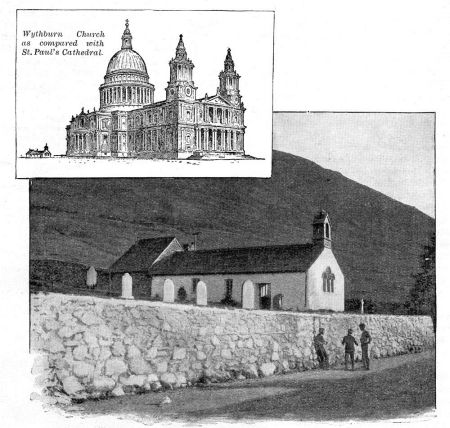
Wythburn Church as compared with St. Paul's Cathedral.
(Photo: T. Dumble, Keswick.)
WYTHBURN CHURCH.
(Thirteen yards long, five yards wide.)
Wordsworth, too, said:
And H. Coleridge:
We have given two instances of very small churches: let us now refer to a midget chapel. At Crawshawbooth, a village near Burnley, there is an extremely interesting diminutive place of worship known as the Friends' Meeting-House, an old-fashioned building covered with ivy, and environed by a well-cared-for burial ground. It contains half a dozen oak benches, on which the worshippers sit. Though these benches are sufficient to provide seating accommodation for about sixty, the attendance is rarely more than six. John Bright once worshipped here, walking from Rochdale, a distance of twelve miles. This quaint little place is naturally regarded with much interest by visitors.
It is interesting to point out that there is another Quaker meeting-house in the hamlet of Jordans, in Buckinghamshire, which is, if anything, smaller than that already referred to. It has been called the Shrine of Quakerism, for early in June every year[153] a gathering of Quakers takes place. Here lie the remains of William Penn, one of the greatest of Quakers. At a cottage in the vicinity Milton wrote his "Paradise Lost."
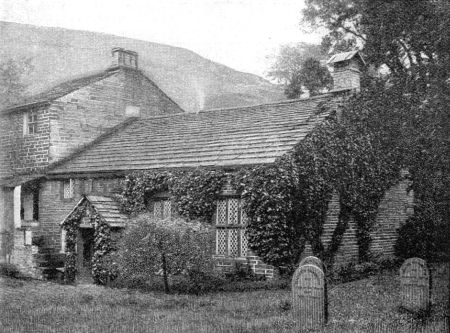
(Photo: R. W. Lord, Little Lever, near Bolton.)
FRIENDS' MEETING-HOUSE, CRAWSHAWBOOTH.
(Containing six oak benches to accommodate sixty worshippers.)
To revert to churches, Kilpeck Church is well worth referring to as being a lovely little place of worship. The nave is thirty-six feet by twenty, and the chancel seventeen by sixteen feet ten inches, the total length being sixty-eight feet and the average breadth about sixteen feet. It is built upon a Saxon foundation, and Saxon remains are still to be seen—notably, a "holy-water" stoup that must be one thousand or eleven hundred years old. It is not possible to do justice to this beautiful church in a few words, but the accompanying photograph will give an idea of the quaintness and beauty of the structure. The sculpture is remarkably interesting.
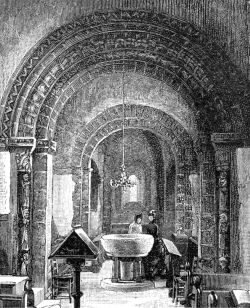
(Photo: Poulton and Sons, Lee.)
KILPECK CHURCH.
(Nave thirty-six feet by twenty.)
An article on midget places of worship would be incomplete without a reference to the little lath-and-plaster church of Essex, consisting of nave, chancel, and a small turret. Hazeleigh Church, as it is named, stands in the near vicinity of Hazeleigh Hall—once the home of the Essex family of the Alleynes, one of whom founded the College of God's Gift[154] at Dulwich. This little church has thus been described by the Rev. H. R. Wadmore, sometime curate:—
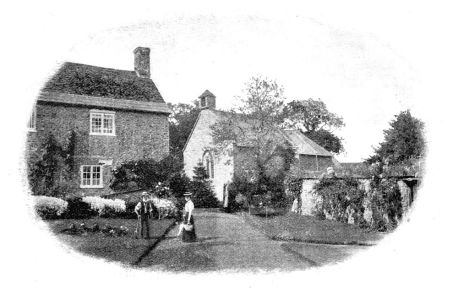
(Photo: R. D. Barrett.)
CHILCOMBE CHURCH.
(Twelve yards long.)
This little church of Hazeleigh, owing to its simple character, differs but slightly from the roadside cottages. It has been styled "the meanest church in Essex," owing to its unpretentious character.
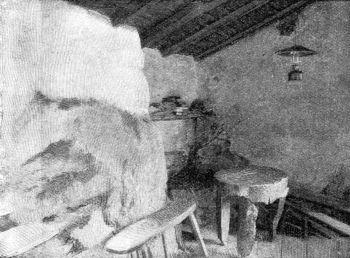
(Photo: Cassell and Co., Ltd.)
THE CAVE CHURCH AT LEDAIG, NEAR OBAN.
(The most primitive church in the kingdom.)
A pleasing little church is that of Chilcombe, near Bridport, Dorsetshire. Chilcombe is mentioned in the Doomsday Book, and at one time was the property of the Knight Hospitallers of St. John. The existing church dates from the thirteenth century. It[155] is in the Roman style, and possesses a good Norman font. The length of the nave is twenty-two by fourteen feet, the chancel being thirteen by eleven feet. The owner of the parish and the patron of the living is Admiral the Hon. M. H. Nelson.
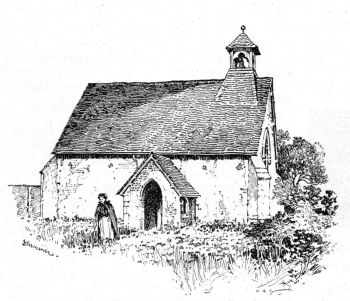
GROVE CHURCH, NEAR LEIGHTON BUZZARD.
(Capable of seating fifty people.)
Another remarkably small church is that of St. Peter, on the Castle Rise, at Cambridge, its dimensions being twenty-five by sixteen feet. It is of Norman architecture.
England by no means possesses all the diminutive churches and chapels, and a very quaint and interesting church is that of Ledaig, near Oban. It is unsectarian, and its congregation numbers, on the average, twenty-five. It was founded by John Campbell, who was more familiarly known as "The Bard of Benderlock." He converted a natural cavern in the cliffs of Ledaig into a place of worship. A portion of a trunk of a tree, on which Robert Bruce is said to have rested, serves as a table and reading-desk. Trunks of trees around the sides of the cavern serve as seats for the worshippers. Mr. Campbell officiated as minister for many years to a band of faithful Highland worshippers in this curious church. Mr. Campbell was a remarkable personality. He was postmaster of Ledaig, and he also gained a considerable reputation as a poet. He was a much respected man, and his memory is dear to many.
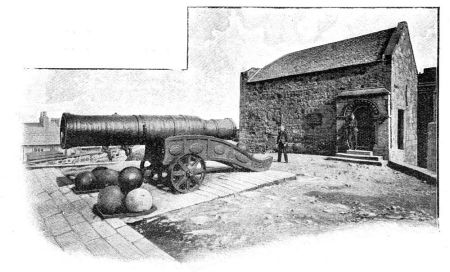
(Photo: A. A. Inglis, Edinburgh.)
ST. MARGARET'S CHAPEL, EDINBURGH CASTLE.
(For some time used as a powder magazine.)
I would like to refer to a very interesting midget church at Grove, near Leighton Buzzard, which I had the pleasure of visiting recently. It is the smallest in the county, and is a gable-roofed, barn-like fabric, with a door[156] on the north side. In 1883 the little church was restored throughout, the fine old-fashioned square pews being replaced by open wooden seats, and it is now capable of seating about fifty people. Formerly the edifice contained a "three-decker"—clerk's desk, reading-desk, and pulpit combined. The churchyard contains many graves, but only one tombstone (eighteenth century). The dimensions of the church are—length, twenty-nine and a half feet; width, eighteen feet; height, about forty feet; in all probability, the church was formerly larger than at present. Grove is generally considered to be one of the smallest parishes in England, and one could hardly conceive of a smaller. It consists practically of a farmhouse and a lock-keeper's cottage.
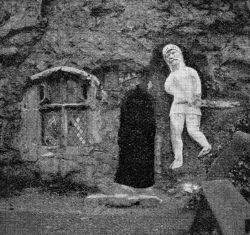
ST. ROBERT'S CHAPEL, KNARESBOROUGH.
(Showing figure of a Knight Templar cut in the rock.)
(Photo: G. E. Arnold, Knaresborough.)
We must not forget that at the top of Edinburgh Castle is the historical diminutive chapel of St. Margaret's, which was the private chapel of the pious Margaret, Queen of Malcolm III., during her residence in the castle. Until very recently it had been quite lost sight of, having been converted into a powder magazine and fallen into disrepair. In 1853, however, it was "discovered" and put into an efficient state of repair. It is considered to be the oldest and smallest chapel in Scotland, its dimensions being sixteen feet six inches by ten feet sixteen inches. The semicircular chancel is separated from the nave by a well-carved double-round arch, decorated with Norman zigzag mouldings. It is too small to be made available for divine service for the troops quartered[157] in the castle, and the only use that it is now put to is for occasional baptisms and morning Communion.
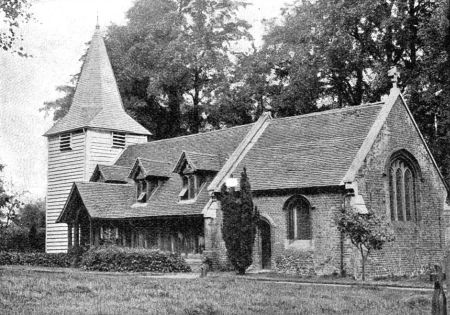
(Photo: Cassell and Co., Ltd.)
SMALL CHURCH AT ST. ANDREW, GREENSTED, NEAR ONGAR.
(Believed to include the only remaining portion of a Saxon wooden church.)
There are several very small places of worship which are now, alas! in ruins. At Iona, for instance, on the west coast of Scotland, are the remains of an extremely small chapel, known as St. Oran's Chapel. It is very near Iona Cathedral. It is constructed of red granite, and its external measurements are sixty feet by twenty-two feet. It is now roofless, and is very old. This little chapel is believed to have been built by Queen Margaret in 1080. Its architecture is Romanesque, and it has one low entrance. This humble edifice is interesting inasmuch as within its walls is the tomb of Sir Walter Scott's "Lord of the Isles," the friend of Bruce.
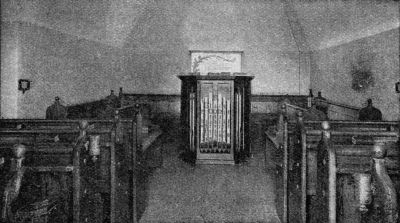
(Photo: Cassell and Co., Ltd.)
DIMINUTIVE CHAPEL AT POINT IN VIEW, NEAR EXMOUTH.
(Containing an organ made by the pastor.)
There is another tiny barn-like edifice at Greenloaning, near Dunblane. The little church is situated adjacent to a farmhouse, and seems to have been erected for the benefit of the farm-workers. It is remarkably small. The scenery in the vicinity is magnificent, and the church is regarded with much interest by tourists.
St. Anthony's Chapel is another small building also in ruins. It is interesting owing to its historic surroundings, being in the near vicinity of Holyrood Palace. It comprises a hermitage, sixteen feet long, twelve feet wide, and eight feet high, and a Gothic chapel forty-three feet long, eighteen feet broad, and eighteen feet high.
One of the most remarkable of these little churches is that at Knaresborough, in Yorkshire, which is a very queer little chapel elegantly hewn out of the solid rock, the roof being beautifully ribbed and groined in the Gothic style. At the back of the altar is a large niche, where an image used to stand, and on one side of it is a place for the "holy-water" basin. There are also figures of three heads—designed, it is believed, for an emblematical allusion to the order of the monks at the once neighbouring priory. Possibly they were cut by some of the monks. The order was known as Sanctæ Trinitatis. A few yards away there is another head. It has been surmised that this is a representation of St. John the Baptist, to whom the chapel is supposed to be dedicated. There is a cavity in the floor, in which some ancient relic was rested. The chapel is ten feet six inches long, nine feet wide, and seven and a half feet high. Near the entrance is the following inscription:—
The chapel is known as St. Robert's Chapel. St. Robert, the hermit who[158] used it for devotions, was born about 1160, and was the son of Sir Toke Flouris, who was mayor of the city of York. In his youth he was noted for his piety, and he entered the Cistercian Abbey of Newminster in Northumberland. He was only there eighteen weeks, however, removing to York, and then to Knaresborough, where he retired from the world to live a life of contemplation in this restful spot. He died in the September of 1218. On one side of the entrance to the chapel, under the ivy, is the figure of a Knight Templar, cut in the rock, in the act of drawing his sword to defend the place from the violence of intruders. This is a queer and remarkable building, and, though not now used as a place of worship, the reference here made to it may prove interesting.
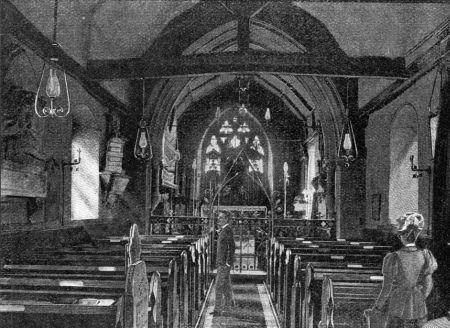
(Photo: Cassell and Co., Ltd.)
INTERIOR VIEW OF PERIVALE CHURCH.
The cathedral of St. Asaph, in Flintshire, might be mentioned in this category as being the smallest cathedral in the country. It is in the shape of a simple cross in plan, consisting of a choir transept, nave, with five bays with aisles, and a central tower forty feet square and one hundred feet high. The choir was built in 1867-68 from the designs of the late Sir Gilbert Scott, R.A., and is of Early English architecture.
Passing references might also be made to the diminutive church of Warlingham, in Surrey, which runs the midget church of Wotton in that county very close; and to Grosmont Church, Monmouth, erected by Eleanor of Provence, a quaint little structure with an octagonal tower. There used to be a church known as St. Mildred in the Poultry, which was removed to Lincolnshire. It formerly occupied a position in the eastern end of Cheapside, and in 1872 it was taken to pieces and re-erected at Louth. It is generally considered to be the smallest church designed by Wren.
At St. Andrew, Greensted, near Ongar, there is a very small church, and it is a curiosity, inasmuch as it is believed to be a relic of the only church of Saxon origin built of wood remaining.
There is a small chapel at Point in View, near Exmouth. It is Congregational, and it provides seating accommodation for eighty persons, and forms one side of a block, the other three sides being taken up by four little almshouses, each consisting of two rooms occupied by four elderly maiden ladies. Over the chapel door is this motto:—
The chapel contains a diminutive organ made by the pastor. In the vicinity there is a peculiar round house, the property of the Reichel family. It was a member of this family who founded the chapel and almshouses.
The little church of St. Nicholas at Hulcote should be mentioned. It is near Woburn, the seat of the Duke of Bedford. It is rather difficult to find, at any rate when the foliage is on the trees, so surrounded is it by them. It was built about the year 1610 by Richard Chernocke. Its measurements are: length, from the tower to the chancel step, thirty-nine and a half feet; chancel, eight and a half feet from step to east; width, sixteen feet three inches. There are carved oaken panels to many of the seats, and on the north wall, inside the chancel rails, are some valuable old monuments in memory of the Chernocke family. It is now between fifteen and twenty years since the church was used for divine service, but it is still used for funerals.
There is a little church, near London, known as Perivale. Although so near to the great metropolis, it is situated in a peculiarly lonely district. It lies in the valley of the Brent amid expansive meadows and hay farms. In 1871 there were only seven houses and thirty-three inhabitants in the parish. The midget church is situated at the end of a field near a low, semi-Gothic half-timber parsonage and a farmhouse. Although somewhat desolate, the spot is a restful one, and the hill and spire of Harrow in the distance make the scene pleasing to the eye. The little church is in the Early Perpendicular style, and consists of a nave, a narrow chancel, a rough wooden tower with short, pyramidal spire at the west, and porch on the south-west. The interior presents a well-kept appearance. The church was restored in 1875. In the windows is some late fifteenth-century glass containing figures of St. John the Baptist and St. Matthew, in fairly good condition, and of Mary and Joseph, which are not so well preserved.
The prettily situated ivy-clad church of St. Lawrence, Ventnor, Isle of Wight, is another edifice which might well be described as a midget church, although some years ago it was found necessary to enlarge it. The church originally was thirty feet eight and a half inches long, it is now forty feet eight and a half inches; and its breadth was formerly eleven feet, whereas it is now twenty feet. The height to the eaves is about six feet. The architecture is Old English, but not at all striking. The church dates back to about the year 1190.
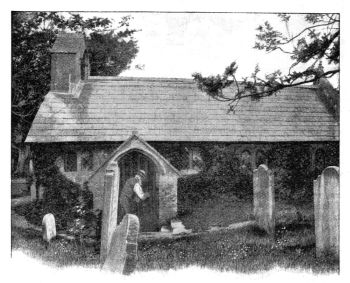
(Photo: F. N. Broderick Hyde.)
THE OLD CHURCH AT ST. LAWRENCE.
We have now exhausted our space, but not our subject. There are other examples of diminutive churches throughout the country, but we have made a selection of the more interesting ones. However small the church, the worshippers have this assurance from the Founder of the Christian religion: "Where two or three are gathered together in My name, there am I in the midst of them"; and with that quotation this little article may fittingly be concluded.
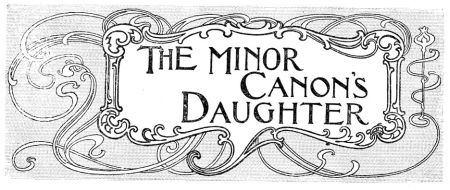
By E. S. Curry, Author of "One of the Greatest," "Closely Veiled," Etc.
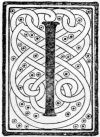
I n the Canons' Court, between Mr. Bethune's and the Deanery, lived Mr. Warde. He was a pleasant man, well off, artistic, musical—and happy in a life of little work, which left him leisure for his artistic pursuits. He had a rosy, kind face and plump figure; the Bethune children, Marjorie included, went to him before anyone else in times of need. He had often shielded them from offended law.
It was he who set on foot the literary and drawing guilds, arranged concerts, and was the universal handy man for games and social festivities to all the county round Norham. He was about thirty-five, and had a chivalric devotion to Mrs. Bethune and her children, since, as a young man, he had first come to Norham.
Marjorie was so accustomed to this that she did not see what was manifest to other eyes, on her return from school in Munich. She took all his kindness as a matter of course, having no more relation to herself individually than the Bishop's or the Dean's. Since her return, he had been sedulously pursuing his courtship in every way that occurred to him.
This gentleman was standing beside her under the lime-tree at the top of the garden, where Marjorie could superintend the pursuits of her two youngest brothers. They were now busily engaged underground. For a whole week every minute of David's and Sandy's leisure had been spent in digging a deep hole in the corner of the garden devoted to their use. Thence, with infinite patience, passages had been scooped, and the mound of earth thrown up against the wall had come in useful as a toboggan ground.
The little boys had received strict orders that morning that all the earth in the passages of the "cave," which, in a frenzy of labour, the two schoolboys had burrowed out before breakfast, was to be removed before their return in the afternoon. As it got deeper, steps had been conveyed from the house for the descent of the hole. The utility of division of labour had been impressed upon the children. Orme was to fill the baskets; Ross, being surer of his equilibrium, was to carry them up and empty them. If the work was not done, and done properly, the babies would have to play elsewhere; no longer would their presence be tolerated by their elders.
Marjorie was enjoying a new book, whose alluring cover was fit index to its contents. Now and then, between the pages, dark eyes looked at her in a strange and wonderful fashion. When this occurred, she would lift her own, and gaze dreamily over the currant bushes, her breath coming quickly, the colour fluctuating in her cheeks. Upon one such moment Mr. Warde had intruded.
"I thought I would come in and talk to[161] you about your sonnet, Marjorie," he said, looking about for a seat. There was nothing handy except a cleft log—used by the boys as a block for chopping sticks. On this uncomfortable seat Mr. Warde poised himself.
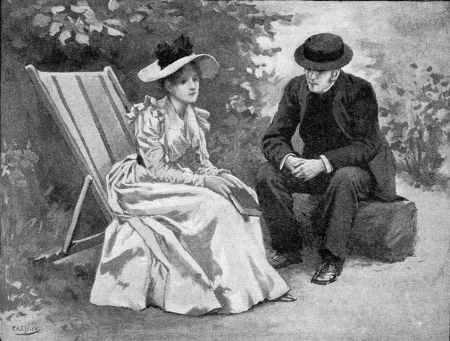
The man, looking at her, thought he might take hope.
"But that wouldn't be fair, would it?" asked Marjorie.
"Oh! we judged the poems yesterday. I didn't propose to alter anything. Mrs. Adeane's is the best, and Lady Esther's next. But—your usual imagination was wanting this time," he said gently.
"I thought it was bad—it seemed so prosaic," Marjorie said humbly. "You see, father's advice always is, not to let imagination go further than it knows."
"Have you never imagined, never thought about love?" he asked softly.
"Often, lately," frankly. "I thought it was a very silly subject to choose."
"Not silly, Marjorie. The loveliest poetry has been written about it, as it is the loveliest subject. Why 'lately'?" he asked.
"To get ideas. They don't come, if you don't think—not to me, at least."
"That way of putting it is new," he said, considering. "Well, Marjorie, I want you to think of it, to imagine all you can of what it means—the new brightness, the new beauty it gives to life; how it transforms all things, even the commonest, so that——" He paused. Marjorie was looking at him in wonder.
Was it something in his glance that brought irresistibly back to her remembrance that look in Mr. Pelham's dark eyes, of which more than once that afternoon she had been thinking? She coloured brightly, and her beautiful eyes grew soft.
"Ah! I see you know what I mean," Mr. Warde said gently.
"Oh! I don't," said Marjorie confusedly. But the man, looking at her, thought he might take hope. He went on:
"It is expressed in all beautiful music, as well as in the best literature and art. It appeals to everyone, because it is natural to all, and answers to something in the heart of every one of us. So you see, Marjorie, knowing you and your gift of imagination, I am disappointed at this bald little verse."
"Father says it is dangerous imagining on nothing," Marjorie replied, plucking up her spirit. "First get facts, absolutely accurate. Then build on them."
"Well, Marjorie, don't you realise that[162] the facts are all about you, that I——Whatever's the matter?"
A yell broke across the summer air, and Marjorie, springing up, bent over the edge of the crater-like hole. At the bottom lay Orme, his basket beside him, its contents upon him. In a second Marjorie had descended underground, and Mr. Warde was left gazing into space.
When she emerged, Orme was in her arms, muddy tears bedewing his cherubic cheeks. "Fall'd," he announced, in a self-pitying tone, to the visitor.
Marjorie reseated herself, her little brother's head upon her breast. As she comforted him, the man observing her grew more in love than ever. Marjorie, soft and gentle, unconsciously rehearsing Madonna attitudes, gave him a thrill of delight. Presently the boy, his conscience uneasy over neglected work, slipped from her knee, and, with muttered remarks on "er, nasty ground," descended again into its bosom.
He had learnt the imprudence of engaging in another man's labour. Resenting the meaner part of filling the baskets for the more stolid and surefooted Ross to ascend and empty, he had been promptly punished for his ambition. His little soul was now sore with the injustice of things.
"Er, nasty steps slipped poor Orme," he said to Ross, watching his careful ascent.
"You not big anuff," Ross answered importantly. "Go and fill er basket. Do what David bidded you."
Meanwhile Mr. Warde had glanced at his watch. Soon, all too soon, this semi-solitude in which he had been fortunate enough to find Marjorie would be invaded by the schoolboys. He was no nearer the end for which he had come, and he could not again drag in Marjorie's little verse for criticism. She glanced at him, as she drew the alluring book towards her, and said, not too politely:
"If you are going to stay, I'll just fetch my work," rising as she spoke.
"No, Marjorie, don't go. There's something I specially wished to say, to talk to you about," he said, becoming a little confused under her unconscious gaze. Could he, after all, disturb this serenity by the suggestion of love and marriage? He felt somehow that the time was not ripe—that they would seem incongruous to her in connection with himself. And yet, if he did not speak, and be quick about it, another man might step in.
"I have had a letter to-day," he said, "offering me a college living."
"Have you?" said Marjorie in a not altogether flattering manner, and looking at him rather as though she were much surprised. She stood poised, ready to fetch the threatened work; her attitude altogether an unflattering one to a lover who has just made an important communication.
"You won't go, shall you?" she went on, her glance going past him to the wall which divided the gardens. Over the top big clusters of the roses in which Mr. Warde delighted nodded gaily, whilst further on the square face of his house was gay with bloom, amid which the two lines of windows stared a little baldly. The blind in each was arranged symmetrically, and in spite of its prim tidiness, even its outside showed that no loved woman ruled within. From her neighbour's house Marjorie's eyes jumped to her own home.
Here there was no symmetry, but its character as a home stood out plain. The nursery windows, distinguished by their guarding bars, were wide open, and the blinds drawn to the top, whilst in the three open windows of her mother's room adjoining the curtains flopped lazily, and the blinds had been adjusted to the sun. Somehow the sight and the difference brought a feeling into Marjorie's heart which had not yet stirred it in connection with Mr. Warde. Hitherto he had not seemed to her to need pity. But now, when he went back into his house—away from her and the homely garden, where vegetables, and currant bushes, and the untidy quarter of the boys, were of more account than flowers, where little feet pattered, and boys' voices were never silent—what would he go back to? The blank windows lit up empty rooms, where no foot but his own stirred. He would find no companionship but that of his music and his books. Marjorie never guessed of the visions that peopled his fireside.
"Shall you go?" she asked, looking at him—then speaking out suddenly the pity her thoughts had called up: "Won't it be very lonely?"
"Very. Sit down please, Marjorie, and listen to me."
Then, as she complied: "When first I came here, ten years ago, your father and mother were very kind to me, and I grew so attached to them and theirs, that I wanted nothing more. I felt no need of the ties other men have or make, because I had—you." Then his tone grew tender. "Do you remember how you used to come round and climb into my study window for your lessons, when the boys began to go to school? You were a bit forsaken then, Marjorie. And then, when you were good—as you weren't always—how a little pony accompanied me on my rides, and then when the pony and the child who rode it had each grown bigger, one day they both[163] disappeared. The child went to school, to come back, nearly grown up, with music oozing out of her fingers' ends. Well, Marjorie" (he had risen, and his face was paling, his self-control vanishing, as he stood looking down on her), "I have waited a long time for that little girl—who has yet seemed always mine—I want her for my wife. Will you go with me, dear, if I go?"
Marjorie gazed blankly into his face. "I? Of course, it is me," she said slowly. "I don't know—I didn't think—how can I leave—everybody?" her voice faltered.
She rose suddenly, putting aside the hand that would have stayed her. There is nothing so cruel as a young thing who has no notion of her power and of the devotion she has stirred.
"I didn't think," she said, cuttingly, "that you wanted payment. I thought—I thought——" And then, not trusting her voice further, she sprang away from his detaining hand, and fled.
"Dear Marjorie,—You gave me no answer yesterday, and I am afraid I took you by surprise, and perhaps shocked you. A girl is a tender thing, I know. Will you send me just a little line of hope and forgiveness? I love you—how dearly you cannot guess—and I want you to be my wife. But I will press nothing against your will, and I have written 'No' to the offer of that living. I think you will like to stay near home. Whatever you decide, whether you say 'Yes' or 'No,' believe always that my love is too great to change, and that I am ever your attached friend,—W. St. J. Warde."
Marjorie was reading this letter with an expression which certainly did not augur well for its writer. She had been seeing to household matters for her mother, and had sat down with an armful of boys' clothes to mend, when the note had been handed to her.
"I do not know what to say to him, mother. I wish—oh, I do so wish he hadn't done it."
"He is a good man, Margie," her mother said simply. "A man, I think, to make you happy."
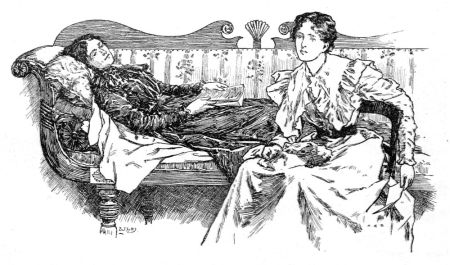
"He is a good man, Margie."
"Happy, mother? I am happy now. What should I do next door? I should always be running in to see you. And how could you get on without me?"
"We shall manage. And next door with Mr. Warde would be so much nicer than a long way off with someone else. It would scarcely be losing you."
"Do you want me to go, mother?" asked Marjorie, struck by her mother's tone.
"Not in one sense, dear; but you will go. It is natural for girls to marry. You will marry, I hope; it is the happiest life, with a good man you can look up to."
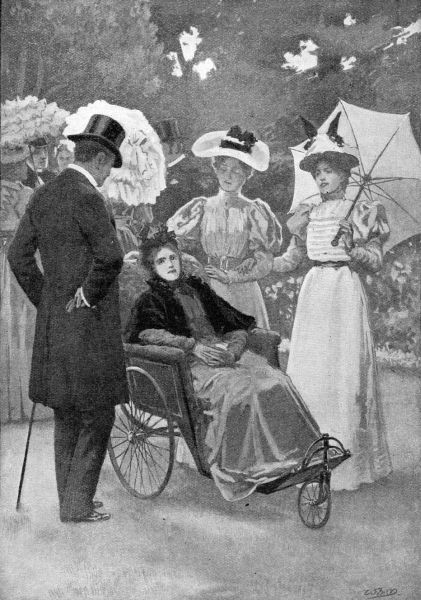
"You have been very good to my boys," Mrs. Bethune said.
"But do I look up to him? I think we—Charity and I—often laugh at him."
"But you can laugh, and yet look up, or life would be very dull. Who do you go to when you want to know anything that father can't teach you?"
"To Mr. Warde," acknowledged Marjorie.
"And when you want to go anywhere?"
"Yes; but only because he has a carriage—and we haven't."
"And when you want to see the picture galleries?"
"He can go; he always has time. But all that doesn't mean that I want to marry him," she added.
"But it is just that. You already look to him for most of your pleasures. That is a long way towards loving him. You would find him a very kind husband and friend."
"Oh! mother, what must I do?" entreated Marjorie, the tears coming into her eyes. "He has spoilt everything. It is Charity's garden-party this afternoon, and I shall be so uncomfortable. Couldn't you go, mother, in your chair?"
Mrs. Bethune's face changed.
"I could, dear. Yes, I will go; perhaps it will be difficult for you." She sighed softly; she was hardly as yet reconciled to her helplessness in public, in spite of the cheery spirit which enabled her to bear suffering with such courage.
Mrs. Bethune's spirit made her the idol and confidante of her boys. Her fun was unquenched, even when the fire of life would seem to have gone out for ever; after the terrible fall, when, to save the infant in her arms, she had laid herself upon her back for life. The baby—Orme—was found unhurt, folded round, so it seemed, by the broken body of his mother. Ross, the most thoughtful, she averred, of her six sons, once said to her:
"Mummie, you do laugh mor'n anybody. Is it 'cos you can't walk?"
"Yes, little son, perhaps it is; to make up, you know."
And Sandy, butting his bright head into her knees one day, inconsolable about something, was won to laughter by, "Sandy, laugh! Look at me!"—and he had looked. And the irresistible witchery of the beautiful dark eyes had cured his woe. She was always the sunshiny centre of the house, and only her husband, or Marjorie in rare moments, guessed how sometimes the bright spirit quailed.
The Dean was popular in the county. When Mr. Pelham came into the Deanery garden somewhat late, he found Mrs. Bethune's chair under the chestnut trees, a centre of laughter and conversation. Marjorie was standing by her mother, with a wistful look on her face, he thought at first sight, wondering at its expression. Love, when presented first to a girl brought up as Marjorie had been, comes as a great shock. That it should be Mr. Warde of all men who should cause her this disquiet filled Marjorie with a sense of the unsatisfactoriness of the world. It disturbed things that had seemed to her as settled as the hills round Norham that this old friend should want to be her lover.
Before going to the Deanery she had sent a little note in answer to his letter, in which she had said—
"There is nothing to forgive. But you must not think of me like this any more. You have always been so kind to all of us that it grieves me to say 'No' to anything you want. Still, it must be 'No.'"
She hoped he would not be present at the Deanery. It was his turn of duty at the cathedral. She would bring her mother away early, before he arrived. The afternoon was quite spoilt for her.
And then Mr. Pelham had come up, and she had introduced him to her mother with a tremulousness and agitation quite unlike her usual serenity.
"You have been very good to my boys," Mrs. Bethune said gratefully.
"Your boys have been very good to my little girl," he answered, admiring the delicate beauty of the face, scarcely looking older than the unquiet one of the tall daughter beside her.
"They're very enterprising," their mother said. "I hope she will not come to any harm with them. They're apt to give us surprises."
"I wonder if you will give me some advice about her," he went on, drawn by some magic in the dark eyes to appeal to their owner for sympathy, "if I may consult you. It is about clothes," he said, smiling. "My nurse is kind and careful, but surely a baby in the country does not really need expensive dresses from a Regent Street outfitter. I should be so grateful if you would tell me where you get those pretty things your little boys always look so nice in."
"Even when they are grubby?" laughed the mother. "I do not know where they could be bought. My nurse, and Marjorie, and I make them."
"Then, if you do, surely my nurse ought to have time. I do not like my baby's over-dressed look; at least, white satin seems to be out of keeping with mud-pies and digging. She is great on digging just now."
"Quite so," said Mrs. Bethune. "If you will send your nurse down to see me, I will have a talk with her."
The Duchess of Norham, a very great person indeed now came up to greet Mrs.[166] Bethune. She was not one who troubled about dress. To-day, in her grey silk, and round hat, she was the most plainly dressed woman on the Deanery lawn. Charity, by her side, was an effective contrast, in soft, shimmering pink.
"Glad to see you out again, my dear," she said to Mrs. Bethune. "And this is your girl come back to you—grown past all knowledge. I hear wonders about her music," kindly. "Charity, may I take her away for a few minutes, presently? I want to hear this music Mr. Warde extols so. Where is he?" looking round.
Marjorie's cheeks, in spite of her usual self-control, turned scarlet. But the Duchess's gaze was arrested by the look on Mr. Pelham's face. He, still standing with a hand on Mrs. Bethune's chair, was looking at Marjorie with a surprised appeal in his expression, as if he, too, was wondering at her sudden flush.
"Oh!" thought the Duchess, "I imagined it was Charity. Was I mistaken then? Not about the girl, if those rosy cheeks are to be trusted."
"Why isn't Mr. Warde here?" she asked of Marjorie, who, in obedience to her gesture, turned with her towards the house.
"He is at the cathedral. It is his week."
And the Duchess thought she guessed rightly the reason of the agitation she detected in Marjorie's voice.
"The Blackton man will be unsuccessful," she settled. "But Charity is pretty enough to console him, and it will be a good marriage for them both."
This great lady was never more happy than when arranging marriages amongst her friends.
Marjorie did not dream how her sudden flush had betrayed her, and forgot lovers and the difficulties they caused when she sat down to the piano. But perhaps it was the perplexity in her mind that conveyed itself to the listener, through the plaintive melody ending in a staccato phrase which fell from her fingers.
The Duchess sat at a little distance, viewing with approval the delicate face, framed in its bright hair.
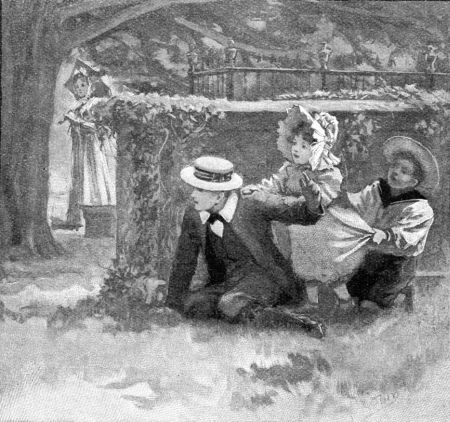
"Hush! Barbe, don't call!" entreated Sandy.—p. 168.
"Good, pure, true, and strong," she[167] settled; "and," as a sudden conviction struck her, "she is beautiful, like her mother was ten years ago. Dressed"—her thoughts following along the same way as Charity's—"well, she would be a success. She is wasted on Mr. Warde. Shall I interfere?"
She was so deep in thought, working out a sudden plan, that she did not notice when Marjorie ceased playing.
Marjorie, glancing at her, asked softly—
"Was that too sad? Shall I try something else?"
But in a moment the Duchess rose briskly, and put her hand kindly on Marjorie's shoulder.
"No, my dear. I shouldn't like that spoiled by anything else. Mr. Warde is right. You have a gift. But a girl like you should not be sad or—or perplexed. Forgive an old woman. Is something troubling you?"
Marjorie looked up into the keen eyes above her.
"Not troubling," she hesitated, "only things are sometimes perplexing."
As she spoke her eyes travelled to the window, through which came the sound of low-voiced chatter and delicate laughter. The older woman, looking at the girl, saw a sudden arrested look come into her eyes and, following their direction, was again puzzled. Charity, standing by Mrs. Bethune's chair, was smiling up into Mr. Pelham's face. She had the manner of one who is pleased, and who wishes to please, and her pretty daintiness of pose and dress was very attractive. Mr. Pelham's whole attention, as he conversed, was given to her. In his courteous attitude were expressed, in the eyes of the two lookers-on, both deference and admiration.
"That girl has grown very pretty," the Duchess said, "and Mr. Pelham seems to think so. He is quite an acquisition here, though I am amused to hear you sniffed at him at first."
"Yes," agreed Marjorie, a little pang at her heart.
The keen eyes travelled back again to Marjorie's face.
"But your mother was prettier than any of you. The sweetest, merriest creature ever seen, with you babies at her feet. I am glad to see her so much better, able to do even this little, poor soul, poor soul!"
The sudden tears welled up into Marjorie's eyes at the appreciation and tenderness of the tone.
"And, my dear—forgive an old woman again—but I think I have guessed Mr. Warde's hopes for a long time, and he is a good man. There, there"—as Marjorie's face grew agitated—"nothing could have happened better. Your mother will have you at hand, and though she is so unselfish and brave, she has missed you sadly; and there is plenty of money."
Marjorie listened in silence, with a feeling as though chains were being bound round her. As she walked back by the Duchess's side to her mother's chair she strove in vain to recall her courage. In the eyes of the man who watched her, as she came towards him, the shadow on her face had deepened with that little excursion into the house.
The boys had seized the opportunity of the attention of their elders being engaged elsewhere to get into mischief. Although they had made so much fuss about their right of way to school, it was not the only way they used. They had, in fact, several ways. One was by train to Baskerton, a village on the river five miles away, and thence, by lanes and the parks, home. This, however, required time and the absence of authorities. Another way was through Easton and the parks, up the course of the little stream, which at one point nearly touched the Court gardens. In this stream, its shallow waters splashing up against their ankles, the boys were walking, and the baby was prancing between them.
"Should we take Barbe with us?" David had asked, pausing on the Green.
"If we can get her," Sandy had replied.
The boys reconnoitred, and the piercing whistle, which set the baby all a-quiver with expectation, sounded through the garden.
"There then, go!" said nurse somewhat crossly, as Barbe began to stamp; and she went. Her education was proceeding apace. Her father sometimes listened aghast at the things which, in her baby prattle, she reported herself to have done.
"See, Barbe, there's a rat!" Sandy said eagerly, as a flop and a splash made them jump. "See, it's swimmin' away."
"'Wimmin' away," said the baby, stooping to look, her two hands on her two knees, and the front of her frock sailing on the water before her.
"Oh, Barbe, you're all wet!" David said, as they landed, and strolled up the field.
"Wet!" she echoed delightedly. "Foots—f'ock!"
"You'll have to be dried."
"I know," said Sandy cheerfully; "we'll dry you by the Bishop's fire—almost sure to be a fire."
But the study window, to which they crept warily by sheltered ways, was shut. The Bishop was absent.
"Now what's to be done?" said David.
"I know where there's a fire," Sandy said. "Was this morning, 'cos of that lead. Let's take her to the little room."
Again they slipped by leafy ways out of the Palace garden into the cathedral yard. The baby's wet skirts flopped round her, and David lifted her into his arms.
The approach of Mrs. Lytchett, returning from the Deanery in unwonted bravery of attire, prompted them to seek refuge behind a tomb. Here it took the boys' whole attention to prevent Barbe's chatter drawing unwished-for notice upon them.
"Hush! Barbe, don't call!" entreated Sandy.
"Barbedie good girl," announced the baby in a loud voice, lifting herself on tip-toe to see the passer-by.
Mrs. Lytchett's ears were good, and, besides, she felt certain at this point that her eyes had seen something fluttering. She stepped off the pathway, and examined a tomb near.
"Hush!—sh—sh!" cautioned David, holding up his finger to his mouth—a movement which so pleased Barbe that she proceeded to copy it.
Mrs. Lytchett passed on; the danger was over. David lifted up the baby and carried her into a little octagon room near by, built in the wall of the cathedral, and used frequently as a workroom or office.
Here the boys were at home. It was the head-quarters of their greatest friends—the masons engaged on the renovations always in progress at the cathedral.
In the grate were the slowly dying embers of a fire, and the room was empty.
"Mr. Galton ain't locked up yet, knowed he wouldn't," said Sandy. "He likes his tea punctual—'spects it's time. Now, Barbe, come an' get done."
Whilst David was holding the baby to the fire, Sandy disappeared, presently returning with an excited face.
"They've nearly done," he said. "It's prime up there. Seems to me, we'd best settle as soon as possible."
"This baby won't get dry," said David, gloomily. "Just look at her!"
"I know," said Sandy, regarding the bedraggled Barbe. "We'll take it off an' leave it here. An' I'll fetch her somefink. Sure to be somefink stored in Margie's basket—know Orme made holes in himself last week."
So it happened that it was a little blue girl—clad in one of Orme's shabbiest overalls—who met Mrs. Bethune's returning chair, and was lifted to her knee for a "yide."
"But what has happened? where are her own clothes?" Mrs. Bethune asked, recognising the substitute.
"We thought they were just a little damp," said Sandy in explanation, climbing up the back of the chair to kiss his mother.
"Good boy, Sandy!" said his mother, "to take care of her."
"But how did they get damp?" asked Marjorie suspiciously.
"Just a little water p'raps got on them," he replied, feeling the tone unkind after his mother's praise.
"Then you have been in mischief?" asked Marjorie.
"Barbedie walked in er water," the baby replied, as if she had been doing a good work.
"You shouldn't have let her," Mrs. Bethune said caressingly.
"Barbe don't want lettin'," answered Sandy philosophically. "She does wivout."
The sweets of mischief whetted the boys' appetites for more. They applied themselves with zeal to a work they had in hand, and for the next few days little was seen of them.
One evening they were standing in a disused corner of the Palace grounds, under the ruined window of the old banqueting hall, which formed part of the wall enclosing the gardens of the modern wing of the house. The corner where they stood was immediately adjoining the wall of their own garden, and was part of an overgrown shrubbery between the ruins and the parks.
Both boys were exceedingly dirty. Faces, capless heads, fingers, clothes, all bore traces of the underground work from which they had just emerged. They had burrowed from their cave, and were mightily pleased at their point of exit. No place could be more secluded, nor less likely to be discovered. And from the ruined wall close by, under the shelter of a spreading elder, they were able to drop easily either into the cathedral yard or the Bishop's garden.
"Now the game begins. We've got a base of operations," said David grandly.
"How much?" asked Sandy.
"What you work from, and what you fall back upon, if you get besieged. And it's a good base too," he added, looking round. "We've got to make this passage hard and firm, and then hide it from that prying gardener."
"An' we can pay back Mrs. Lytchett," said Sandy with joy.
"How?"
"Oh, I know! She just hates us going to the Bishop's window. He told me he'd just got a new tin of gingerbread, an' now we can get in wivout goin' through the gate. She's made that gate so it clicks."
"But you mustn't let her see."
"Not me! If she comes, we'll just run round the house, and she'll fink we've come back way. And then she'll run round to catch us, an' we shan't be there."
Sandy spoke with the certainty of much experience, as, indeed, he had a right to do.
"Our character is all gone," David said thoughtfully, "so it don't much matter how bad we are."
"No, s'long as it ain't wicked bad. We'll be highwaymen, but we won't be thieves and robbers."
"We can get into the cathedral, too," suggested David.
And then, with minds full of revolution and anarchy, the boys bent earnestly to the preliminary work of making their passage secure.
"Ross and Orme, you're never to go along there without us," David said to his young brothers, when he had wriggled back to the cave whence his passage started. Now their services were no longer needed, they were felt to be rather nuisances.
"If you do, you'll get smacked right hard," said Sandy.
Both children fixed round eyes on their elders, unable to understand this sudden change. They were dismayed at its injustice. For some days they had been treated with indulgent kindness, all their faults overlooked, so long as they did diligent work. They were cleaned when possible, and consoled when their dirty appearance awoke wrath in the powers responsible for them. Now, it seemed, all was changed. There was no mistaking Sandy's attitude, as he stood ready to administer the smacks alluded to. Nor were David's frowning brows more encouraging.
Ross tried argument. "We'se scooped, too," he said. "We'se got dirty, ever so," he added.
"Ever so," echoed Orme.
"No matter! You kids must do as you're bid, and if ever you go a step along there you'll catch it. See?" said David. And the infants, with moody brows, averred that they saw.
By this time the hole which formed the entrance to the cave was much improved. The wooden steps had been replaced by a flight of mud steps, the making of which had been a joy, not only to the boys, but to the baby. They had required water as well as mud in their making—endless paddlings and pattings and treadings down of little feet before the staircase was complete. David had engineered the proceedings, and Mr. Warde, now and then hovering about the top, had conferred advice. He was not encouraged to descend. The boys wanted no prying grown-ups to mar their schemes. Marjorie, now and then, had suspicions that some extra mischief was afloat. Never before had she known them to stick to anything for so long. But she recollected the fascination of caves and holes, and was, besides, much engaged with her own concerns.
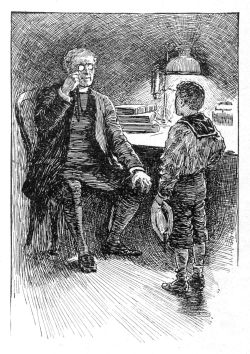
The Bishop and the boy.—p. 170.
One evening the Bishop, on leaving the drawing-room, had gone to his study. It had been a wet day, and the rain had finished in a thunderstorm an hour or so before, leaving the sky washed and pellucid under the summer moon.
The shutters had been closed and a little fire lighted; but presently, finding the room warm, the Bishop opened the window, and stood gazing over the wide lawn which occupied the space between the house and the ruins.
The delicate tracery of the ruined window of the banqueting hall, and the many unevennesses of the walls, stood out black against the sky. Every object on the lawn—every bush and tree and flower—was sharply distinct.
As he looked, his eye caught a movement among the distant shrubs. Some small object was advancing along the gravelled walk surrounding the lawn. Presently, as if attracted by the light, it turned off the pathway on to the lawn, in a bee-line for the window.
The Bishop stood watching, wondering a little, when the object resolved itself first into a small boy, and then into Sandy Bethune.
"Why, Sandy!" he exclaimed, "how did you get here?"
"Is it the middle of the night?" asked Sandy in his usual cheerful way.
"Nearly. It's half-past eleven. Good gracious! What have you been doing?"
For, on approaching the light, Sandy was seen to be covered with mud and otherwise much disarrayed.
Sandy considered. He was in a deep fix—so deep a one as to threaten the upheaval and overthrow of some well-laid plans, just on the point of being carried out. The Bishop was an understanding man. Sandy had confided in him before, and knew his worth. If only Mrs. Lytchett did not live at the Palace, and spoil everything, Sandy would have been quite willing to share that residence with the Bishop. He had once told the Bishop so, artlessly asking when Mrs. Lytchett was going away to live elsewhere. The Bishop, on his side, found the children of his friend very charming, specially so irrepressible Sandy; and was ready to be lenient when their peccadilloes were in question. He now invited Sandy in, despite the muddy covering which encased him from head to foot. Sitting down, he began to question him gravely.
"What is it, Sandy? Why are you in such a mess?"
Sandy sat down on a little stool, as if glad to present his small person to the fire, and said, "It's the bovering funderstorm. We'd never thought of that. An' we got caught, an' had to take shelter, an' when we got back our way was bunged up—all squashy with mud. An' we hadn't got no spades nor fings out with us. So at last I said I would go and scout—you know—an' then I saw you."
"Who's 'we'?" asked the Bishop.
"Me an' David."
"And how did you get into my garden?"
"Oh, over the wall. We're highwaymen, and we've got a way of our own."
"Indeed. And where's David now?"
"Oh, he's over there, all muddy, tryin' to clean himself. He's a deal worse than me," said Sandy cheerfully.
"He must indeed be bad, then. What do you propose to do?"
"That's it. We can't get back to the pantry window now our way's gone," said artless Sandy. "Not in at all, not wivout knockin' at the door. I did think p'raps"—persuasively—"you cud come and knock."
"I see. And then?"
"Then, when you was talkin' to father, we cud slip in. Don't fink father would see—not to notice."
"How long have you been highwaymen?" the Bishop asked.
"On'y about a week—and this is a sickener," said Sandy disgustedly. "We was ghosts for a bit at first—till a woman screeched so we nearly got caught, stupid fing!"
And the Bishop, remembering certain reports that had been made to him, was pleased with his acumen in refusing to call in the police.
"If I were you, I should try a better line of business," he said. "Ghosts frighten silly women, and highwaymen are not very creditable, on the whole."
"Yes," agreed Sandy. "We're goin' to. Next we're goin' to be pioneers and settlers."
"Ah, I see. And where are you going to settle?"
Sandy's bright eyes were turned suspiciously to the kind ones looking down upon him. He fidgeted uneasily, and a smile came across the Bishop's face.
"I see," he said. "Perhaps you have not yet made up your minds."
Sandy looked uncomfortable. "Not 'zactly," he confessed. "Truth is, it depends—I don't fink Dave would like me to tell. It's such a grand plan," he went on enthusiastically, "it 'ud be such a pity——"
"To have it spoilt. Well, don't get into more mischief than you can help," the Bishop cautioned, "and don't do anything to make your mother uneasy."
"Mother? Oh, mother'll laugh—she always does. You see, the bother is," confided Sandy, "there ain't no places to pioneer—every bit's taken. An' we've on'y just thought on it; an' it's splendid. We want a girl badly, though. Margie? No, Margie's no good. Settlers has wives an' squaws," went on Sandy pensively, "and we've on'y got Barbe lately, an' she's aw'fly little. 'Sides, you have to take such care on her—she's the on'y one Mr. Pelham's got. There's a lot of us, but mother says she cudn't spare not the littlest bit of one. So much less him his one, an' such a little one. It's a 'sponsibility," sighed Sandy, "when you want to do fings."
Through the open window came the musical sound of the chimes from the cathedral. The Bishop, with a quick sigh, rose.
"There is a quarter to twelve. Your father will be going to bed. Fetch David quickly."
"Should fink he's cleaned by now," said Sandy hopefully. "He was rubbin' himself wiv the leaves off the trees—drippin' wet."
Mr. Bethune opened his front door in response to a low knocking, which at first he did not hear. His eyes had the unseeing,[171] far-away look in them of a man disturbed in a possessing line of thought. The red light in the hall shone on the face of the Bishop, who entered and stood on the doormat for a minute, in such a position as to shield the entrance of the two muddy boys.
"Here is the Guardian for you," he said, "with a very appreciative notice of your paper." Then he went on, "And tell Marjorie to-morrow morning not to be too cross with the state of the boys' clothes. They've been in mischief, but it won't happen again—not the same sort."
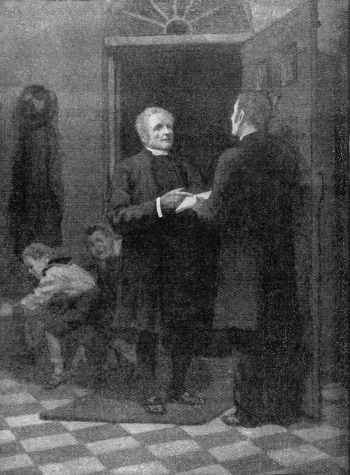
The father pretended not to hear the scuffling of small feet.
The two men looked at one another and laughed, and the father pretended not to hear the scuffling of small feet upon the stairs. The Bishop went home with no weight on his conscience—only a little pathetic envy of the man he had just left. Somehow those stifled scufflings up the stairs had gone straight to the depths of his very tender and lonely heart.
"The Bishop knows all 'bout it," excused Sandy sturdily, when confronted by Marjorie the next morning.
"The Bishop knows that all your clothes are in the bath, with both taps running!"
"Well, he does," Sandy repeated, "proberly. He said we were the out-an'-outest dirtiest little grubs he'd ever seen."
"That you are—no one will contradict him. But he couldn't know that your clothes were in the bath."
"Yes, he would. If they were so dirty, where else could they be? It's all that 'gustin' funderstorm."
"Thunderstorm!" echoed Marjorie suspiciously. "That was at ten o'clock. What has that got to do with your clothes and the Bishop?"
"Tell you it has. You'd best ask him, if you don't b'lieve me," said Sandy, hurt at her unbelief. "Anyhow, he does know that they was dirty. An' just cos we want to save trouble an' wash 'em ourselves, you're cross an' spiteful. Girls are no good—'cept little uns. What's there to put on? Best be somefink old, cos there's a deal of diggin' to be done."
"I shall stop that digging if you make such a mess of yourselves."
"You'd best not," said David meaningly, from his bed in the further corner. "If you do, you'll be sorry," he said darkly.
END OF CHAPTER SIX.
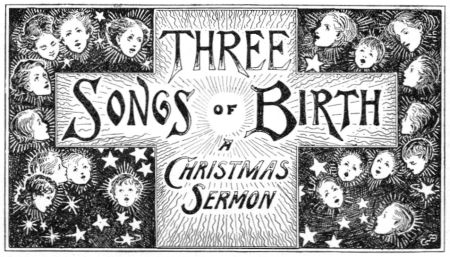
By the Rev. Hugh Miller, M.A.
"Suddenly there was with the angel a multitude of the heavenly host praising God, and saying, Glory to God in
the highest, and on earth peace, good will toward men."—St. Luke ii. 13, 14.

Three times are we told in Scripture that the angels sang. At the birth of the world, when the foundations of the earth were laid, the morning stars sang together and all the sons of God shouted for joy. When Jesus was born into the world a multitude of the heavenly host praised God and said, "Glory to God in the highest, and on earth peace, good will toward men." And when anyone is born again there is joy among the angels in heaven over the sinner that repenteth. The subject of the song in each case is the same: the leading motif of them all is man.
Man, to begin with, was God's chief end in creation, and the angels sang not so much because a new world had been made, but rather because a new being akin to themselves was put into it, to whom they might minister and with whom they might co-operate in the doing of God's most holy will; and this season comes to remind us of our inherent dignity in God's sight, of the noble ideal He has formed for us, of the value He sets on those whom He sent His Son to seek and to save. As God made us and as He intends us to be, we are not a little higher only than the animals, we are rather only "a little lower than the angels." He has crowned us with glory and honour and set us over the work of His hands. He has put all things under our feet. The material universe was made for man, to be his home, to develop his powers, to be a test and discipline of his moral character. I refuse to be reduced to the same rank, or to be placed in the same order, as the beasts that perish. Remembering the angels' first song, I assert my supremacy.
And man is most of all supreme because God has given him the freedom to choose the objects of his life, and the means by which he can secure them. Sun, moon and stars are bound by laws which they cannot transgress. The movements of the[173] animals are guided by impulses and instincts over which they have no moral control. To man alone belongs the power of refusing to bow before God's greatness and of disobeying God's commands. Man only has this sovereignty; but his sovereignty led to his servitude, and the chains that bound him were forged by an angel who fell before man's fall.
If, then, all the angels worshipped and adored when man was made with the great gift of free choice, how must the holy ones that remained after the first and great apostasy have grieved when the fallen angels took man along with them in their fall! For because of man's disobedience God's idea in making man seemed to be thwarted and the peace and good will to which he was called appeared no longer possible. Instead of being the master of creation, he was now to a large extent its unhappy victim.
We know from hints thrown out here and there in Scripture with what absorbing interest the angels followed the plans of God to bring order once more out of the chaos caused by sin, and the effort He put forth to create a new heaven and a new earth, wherein dwelleth righteousness. No wonder, then, that when the fulness of the time was come, and God sent His Son, made of a woman, made under the law to redeem man, the angels should have sung a second time, and anticipated for man at last a happy time of peace and good will.
The angels had a clear perception of the purpose of Christ's coming. One of the chief of them said to Joseph, "Thou shalt call His name Jesus: for He shall save His people from their sins." And they all sang when He came, because they knew that God was now dealing in a special and most effective way with that dark thing which cast its shadow on heaven as well as on earth. And it becomes us to remember that it is the sin of man which in the mind of God and His holy angels is associated with the coming of Jesus Christ. To this end was He born, and for this cause came He into the world.
The sin of our first parents had passed on from generation to generation, and each one of the millions of mankind had to say, "Behold, I was shapen in iniquity; and in sin did my mother conceive me"; and each fulfilled in his own life all too truly the sad promise of his birth. How was the tradition to be broken, and yet broken by one who really belonged to the race? The instincts of man himself foreshadowed the truth. Stories of a virgin birth here and there discernible in paganism show the deep intuition which was realised in Jesus Christ. He came into the world to fight with sin, to redeem a race steeped in a terrible heritage of evil, and that He might redeem it He Himself was born, and yet was free from evil.
He fought sin and He conquered it. Why, then, has the angels' song not been fulfilled? Why does sin still cast its shadow on earth and heaven alike? Why does God's loving purpose in sending His Son seem still to suffer so wide defeat? Because in his recovery as in his fall, man's will must play its part. I can only be saved from sin when I will to be saved; I only become a partaker of the benefits which Christ brought from heaven to earth when, yielding to the inspiration of the Holy Spirit, I turn with full accord to Jesus Christ as my Saviour. Marvel not, therefore, that we say to you with peculiar emphasis on the day in which Christ was born, "Ye must be born again." Otherwise, His birth is of no avail to you and me. We are not honouring Him, we are putting Him rather to an open shame, if we keep out of our thoughts at this time the supreme purpose of His coming, if we are not personally dealing with Him even now as to the burden and guilt of our sin.
But we can set the angels a-singing in the sky, and the melody of their music can be felt in our own hearts, if we turn in lowly penitence to Him who came to save His people from their sins, and to quicken them to a new life of righteousness and peace and joy. Only when a man comes to himself in lowly penitence, and then goes to his Father with a lofty faith, does he enter into the full purpose of his manhood; and only then, also, is there not only joy among the angels in heaven over the sinner that thus repenteth, but there is music and dancing on the earth as well, and the old life ends in which sin reigned, and the new begins in which Christ reigns; and His reign means "Glory to God in the highest, and on earth peace, good will to men."
"There is no peace, saith my God, to the wicked."
Words by Arthur Bryant. Music by Charles Bassett.

By Lina Orman Cooper, Author of "The House Beautiful," Etc.
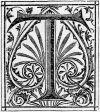
The House Beautiful must needs be also the House Comfortable, if we take true loveliness to consist of perfect fitness for service. Thoroughness is the keynote of each. In order to strike it we must have entered heart and soul into Ruskin's translation of St. Ursula's Room. Carpaccio himself painted the useful in the beautiful in this famous picture. From the princess's book, set up at a slope fittest for reading, to the shelf which runs under the window, providing a place to put things on—from a silver lamp on the white wall to the little blue slippers beside her bed, each detail ensures comfort of the first quality.
Comfort is a thing quite apart from fashion. So it is easier to indicate the road which leads to the House Comfortable than it was to point out details in the House Beautiful. We most of us agree about the essentials required for real comfort: chairs upon which you can sit fearlessly; beds which rest and do not bruise; arms that support without cramping; pokers that bend not; strong tables and sharp knives, these are a sample of the things I mean. But true comfort depends on more than surface surroundings. It is indissolubly linked with attention to detail. The houses to which guests return time after time is the one in which soap is never absent from its tray, and where pillows are not only covered with frilled slips, but also stuffed with down and interlined with soft covering in place of waxed ticking.
I would say, first of all, that the House Comfortable must stand in a sunny situation. This ensures warmth and light, without which our bodies are ill-nourished and miserable. "Where the sun never comes the doctor does" is a much-to-be-quoted proverb. We cannot all live exactly where we like. Circumstances of business, and means, generally determine locality. But common-sense must guide us in the selection of our houses. If we would be really comfortable, we must live in light, dry, airy, and clean homes. Never take a house on the sole recommendation of its pretty appearance. To have a really beautiful house we must first see that it is essentially built for comfort. The really useful and good is generally ornamental, for it possesses the realistic beauty of fitness. A north and south aspect for the chief sitting rooms, with east and west windows, secures both sunshine and shade. We want afternoon coolness as well as morning light. If our apartment looks towards the sun rising, heavy curtains should be ready to draw when east wind rages. A stick to effect this noiselessly is a small boon much appreciated. If our casement faces the golden gates of the west, no such protection is called for. But all windows should have double blinds—white outside, to absorb heat, and dark inside, to veil the sun when necessary. The comfort of lying in bed, facing a dark green blind can only be estimated by those who have reluctantly been disturbed by the too early shafts of the god Phœbus.
There should be a triple water supply in the House Comfortable; ewers always filled from the soft-water pump. Every well and tank should be tested ere we take up residence. Pure water, and plenty of it, is essential to the health (and therefore comfort) of every household. It should be perfectly clear and bright, and free from taste or smell. Yet impurity may lurk even in the most sparkling water. Therefore science must decide as to its desirability. If only iron or lime water is procurable, jars of lump ammonia, or a bottle of cloudy liquid ammonia, a bag of oatmeal or a bundle[176] of bran should lie on every washstand. The hot-water boiler not only supplies unlimited baths, but may be devised to heat the house. In every Canadian home a stove in the cellar warms the rooms above by means of drums and fans. We might do much the same in England with our hot-water pipes. These should certainly run through the linen-press and clothes cupboards, and terminate in bathroom spirals. On these, towels and rough sheets could be dried and aired. A face cloth always warm is one of the luxuries in our House Comfortable.
After sanitation, ventilation takes its place in the home. How to secure a constant supply of fresh air is a question which demands most serious consideration. In ages past, houses were unintentionally ventilated by the ill-fitting doors and window-frames, wide chimneys, and open fire-places. But in our modern buildings comfort is secured by almost air-tight doors and windows. Ventilators at the top of such are delightful and necessary for real comfort, or a Queen Anne casement may have a swing in its upper frame. It is not always easy, however, to secure exemption from draught in our modern mansions. When the brick-and-mortar fiend has placed door, window, and fireplace exactly opposite each other, screens must be judiciously used. A brass rod from which hangs a curtain, screwed into the door jamb and suspended by a tiny chain from the ceiling, is a good thing, or an ordinary portière may be allowed. The former plan, however, enables us to keep the door open without feeling a wind.
Padded stair-carpets secure noiseless ascent in the House Comfortable. Cork mats by the big bath are welcome to bare feet. Many cupboards are a necessity. A place for everything and everything in its place is one of the initial rules for everyone's comfort. It is also Divine law. Hanging presses, medicine cupboards, butler's pantry, housemaid's closets, keep dresses from dust, poisons from the unwary, silver and glass intact, and brushes unworn.
The House Comfortable must not be over-servanted. Neither must it be undermanned. Of the two evils, the latter is preferable, as the mistress herself then looks after the minutiæ of her house. With all deference to Matthew Prior, comfort does not flow on a line with ignorance. It requires a cultivated intelligence to provide such in our homes.
Education has done much for us on this point. How not to do it in the House Comfortable is exemplified by the abodes of our forefathers. Going over Beaumaris Castle the other day, I noted the small apertures for exit; the high caverns of chimneys; the windows of horn; the crooked stairs. Nowadays we find stoves and slow combustion grates quite a necessity for comfort—whilst lofty ceilings, broad staircases, and wide windows can be quite as picturesque, and are far more to be desired.
The dictionary definition of the word "comfort" implies enlivenment and capability for dispensing bodily ease. For this, moral qualities are as necessary as well-planned, well-equipped houses.
Punctuality, for instance, is an ingredient required to secure a comfortable home.
When breakfast and dinner are movable feasts, served up at the whim of a lie-a-bed or a gad-about, they can only be make-believes, after all. Cold coffee is unpalatable even when partaken of in a sunny room. Whitey-brown sausages are unappetising unless piping from the pot. Yet this—like all other virtues—may be strained too far. Nothing is more uncomfortable than to feel no latitude is allowed to a weary guest, or to find one's host at marmalade three minutes after the time appointed for the disappearance of a savoury. Courtesy in this must be our rule. Neatness is another necessity. No house can be really comfortable that is littered with papers, or in which boots lie in the drawing-room—yet finickiness in arrangement makes the home unbearable. The most uncomfortable visit I ever paid was to the most scientifically correct house. Chairs were not allowed to touch the wall-paper; footstools never shifted. A towel for wiping down the varnish of the bath was provided, and—I was made miserable! By all means keep paint and paper in as much primitive purity as possible, but let unobtrusive service guard these points.
Much more could I discourse of the House Comfortable, but space forbids. Let me only remind you that the veriest cottage—plenished with wisdom and lovingly provided—may fulfil all its conditions just as well as the most luxurious castle.
Told in Sunshine Room.]
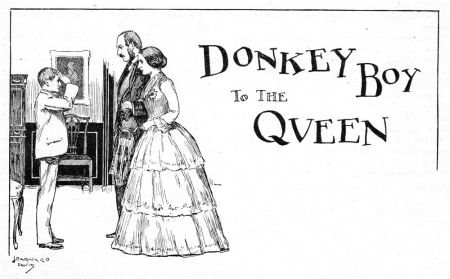
By Alfred T. Story

A week passed before anything further was heard. Then a summons came for Tam to appear before her Majesty on the following afternoon. He was duly in attendance, and had not long to wait before a man in Highland costume came into the room where he was seated and said—
"Noo, my braw laddie, her Most Gracious Majesty and his Royal Highness the Prince Consort will come in through that door in twa seconds. When they enter all you hae to dy is ta stan' up an' mak' yer obeisance. An' when they ax ye a question jist ye say yes or nae, your Majesty, or your Royal Highness, as the case may be. An' if they ax ye naething—weel, jist ye say naething in return."
With these words the wise servitor withdrew. Barely had he gone out of one door ere the other opened, and the same lady he had seen before, leaning on the arm of the gentleman he likewise remembered, appeared before friend Tam. They were both dressed much more richly than when he had previously seen them, the lady having a brilliant star on her breast, and the gentleman wearing a silken sash over his shoulder.
For a moment the boy was confused, but he recovered himself sufficiently to recollect that he had to make an "obeisance." He had omitted to ask the Highland gentleman what that was, but he thought it must be something like the soldier's salute, and so he stood perfectly upright and saluted.
"So you have come, my lad, to see her Majesty about the position of donkey-boy?" said the gentleman.
"Yes, sir—your Royal Highness," replied Tam. Only when he had got out the word "sir" did it flash upon him that he was standing before the Queen and her Royal Consort.
"Well, her Majesty has caused inquiries to be made about you, and she finds that, although you are a little wayward and sometimes disobedient to your grandparents, you are not on the whole a bad boy."
"No, your Royal Highness," said Tam.
"Does that mean that you are not a bad boy, or that you do not sometimes disobey your grandparents?"
This question, though backed by a genial smile, somewhat disconcerted the would-be donkey-boy. He was silent for a moment, then he answered, looking first at one and then at the other, with that straight glance of his, "I hae sometimes been disobedient to my[178] grandparents, but I think I have learned better now."
"I am glad to hear that," said the Prince.
Then, speaking for the first time, the Queen said, "Well, Tam, if I make you my donkey-boy, will you promise to be obedient to all my slightest wishes and commands? Do not answer lightly. I am a severe mistress in that I expect the strictest obedience and attention to duty. But I, in return, am strict in doing my duty to those I employ."
"And if you prove a worthy and trustworthy servant," added the Prince, "your position is secure for life."
"Not, however, as a mere donkey-boy all your days," put in the Queen with a smile.
Said Tam with a faltering tongue: "If ye'll try me, your Majesty, I'll do my best, and," he added, as though struck with a sudden thought, "I'll no need to lick the donkeys, 'cos I ken hoo ta mek 'em run 'thout the stick."
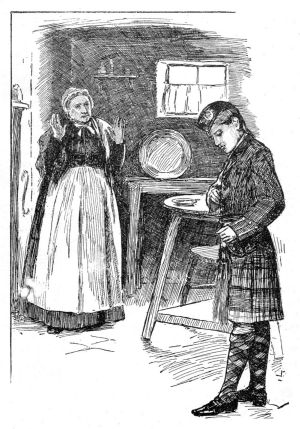
Yetta threw up her hands in amaze.
"And how do you do that?" asked the Prince with a smile.
"I meks 'em carry a bunch o' thistles afore 'em."
"Well, we will see," replied her Majesty, smiling. "Now you may run home and tell your grandparents you are to be ready to begin duty this day week. But before you go you will see the gentleman who spoke to you a minute or two ago."
With these words and a kindly smile the Sovereign and her Royal Consort withdrew.
The one door closed, the other immediately opened, and again entered the Highland gentleman. "Sae ye hae been engagit ta look after ta cuddies, eh?" he questioned.
Tam said he had.
"Aweel, it's a verra guid step in life for a young callant to begin wi', an' if ye tek heed there's nae telling whereto it may lead—ablins even to the primiership, if ye ken what that is. For ye mun know, the gift o' the heaven-made Prime Minister is just to ken hoo ta manage a' th' human cuddies that are sent to Parliament to bother 'em. But mebbe a' that's a wee bit abune yer understanding as yet, and sae we'll just leave it an' speer aboot yer claes."
Needless to say how surprised Donal and Yetta were to hear Tam's story, how thankful to reflect that their boy was to have such a start in life. He reported to them what had been said, and the promise he had given, and they believed that, like the Jamison he was, he would be true to his word. All the same, they did not omit to pray for that guidance and support for him without which his own efforts would be vain.
The evening before Tam's week was up a parcel was delivered at Jamison's door, addressed to his grandson. It contained a complete new suit, as the Highland gentleman had said, "from the skin outwards." Never was seen such a brave outfit, to Tam's thinking. He turned it over and admired it, article by article, for at least a couple of hours, but would not try it on, or any part of it, until he had had a good wash. The tub was never a thing he was shy of, but on this occasion[179] it was used as though he intended to wash out his every fault, as well as all the merely superficial smuts and stains that had accumulated, so as to appear before his Queen a spotlessly clean cuddy-tender.
When the operation was completed, Tam indued himself in his new garments and went on parade, so to speak, before his grandmother. Yetta was busy stirring the matutinal porridge when he walked into the ben and said:
"How do I look, granny?"
Yetta, turning round, threw up her hands in amaze. She hardly knew him, so great was the transformation effected by the new clothes and the scrubbing he had given himself. Donal was no less surprised when he came in from his morning milking. Tam looked two inches taller and a lot sprucer.
"Ye mind me of yer puir father," said the old man as he sat down to breakfast.
That was a note of sad recollection which brought tears to Yetta's eyes; but a smile was soon gleaming through them when Tam, getting sight of Meg, who was eyeing him as it were askance, said drily, "Meg looks as if she hardly kenned what ta mek of her handiwark; for the beginning o't was a' her doing."
Just then the noise of wheels was heard on the road, and as the messenger who brought the clothes left word that one of the Queen's carriages would pick him up on the morrow, Tam thought surely this was the one. But it was not. Indeed, he ran to the door at least twenty times ere, towards eleven o'clock, his vehicle arrived. It was a quaint affair, half carriage, half wash-basket, drawn by two asses, creatures as beautiful of their kind as could be found. It was driven by her whom he knew, and by her side were several bright little faces, while the Highland gentleman, riding behind on one pony, as sturdy and Hielan' as himself, led another by the bridle.
Donal and Yetta came out and with bowed heads thanked the august though simple-hearted lady for the great kindness she had shown to their boy. She replied with a kindly smile:
"There appears to be the making of a good man in him, and, with God's help, we will do our best to make him one."
Little more was said, and, mounting the led pony, Tam rode off by the side of the faithful retainer, who never got further away from the carriage than the dust raised by its wheels.
Thus commenced Tam's career in life. Though he served the noblest lady in the land, he did not find his way one altogether of buttered parsnips and cream. The one thing abhorrent to his royal mistress was idleness and indifference. The motto of her establishment—of all her establishments—was "The diligent eye." In this principle she found not only the best interests of her own house, but the best interests also of those who served her.
Tam could not be called idle, nor could he be called exactly indifferent; but during the years of his tending of cattle and sheep on the brae-side he had got into the habit of liking to loll about, to saunter and dream, and then to make up, or try to make up, the leeway of work or duty by a spurt of energy. Another fault he had was to leave things about—for others to "side" or put in order. This arose, no doubt, from the narrow dimensions of his home, where there was hardly room for everything to have its particular place. It was, however, neither a very grievous nor a deeply rooted fault; and a little sharp drilling, not unfrequently at the hands of the Highland gentleman—a sort of major of the household, who possessed "the diligent eye" par excellence—soon corrected Tam's delinquency in this regard.
But the other fault was more deeply rooted and cost the young donkey-boy many a bad quarter of an hour. Indeed, on one occasion it nearly cost him his place. He had been given a task to do, and in place of doing it with all diligence he had been found with his feet growing to the ground, as it were. The consequence was an interview with the Highland gentleman, who told him, "Tam, ye have either ta pe punisht or to leave her Majesty's service: which shall it pe?"
"I'll tek the punishment, sir, if you please," he answered.
"Tam, ye are a wise poy, an' we'll mebby mek a man o' ye yet," said the major-domo.
Tam took his punishment, and was the better for it; but he still failed to come up to his royal mistress's ideal of a servant. Like his fellow-servitors, he had plenty of time for rest and recreation: hours of labour were by no means long.[180] So much time had he, indeed, for himself, that the Highland gentleman put suitable books before him, and counselled him to improve his mind by reading and study. He failed, however, to profit by the advice, and was presently made aware of his error by a violent thunder-clap.
He was in attendance on his royal mistress one day, when she and the children were out for a drive. A poor body was met, in apparent distress, by the wayside. Inquiry was made as to her condition, present help was extended, and a promise of future beneficence given if further investigation should warrant its bestowal. Hence the necessity arose for an address to be written down, and Tam, who was that day the only person in attendance, was requested to do it.
When Tam entered the royal service he could read a bit and write very imperfectly; but there had been time, had he followed the counsel given him, to have greatly improved himself in both those accomplishments. Not having done so, he fumbled egregiously over the task set him, and, in short, made such a hash of it that an eye of wrath was turned upon him.
Tam had seen that eye in all its moods—of laughter and smiles, of grief, of earnestness, of affection, even of solemnity and awe, but he had never as yet beheld it flash in indignant wrath. He felt as though the muscles of his knees had been cut away and the ground was sinking from under his feet. What would he not have given to be miles away! But he had to face the storm, and it came in this way:
"Were not books and paper and ink put before you? And were you not advised to improve your reading and writing?"
Tam falteringly admitted that such was the case.
"Why did you not attend to the advice?"
"I—I——" stammered the ease-loving Tam.
"Had you not the time?"
"Yes."
"Then why did you not do as you were wished?"
Tam hung his head in shame.
"Tam Jamison, listen to me. I will have those in my employ attend to my wishes, and attend to them with all their might. Do you wish to be ignorant all your life, when the time and the means for improvement are placed at your command? In three months' time I shall expect you to read and write in such a way that you will be able to fulfil in a creditable manner a simple duty like that you have to-day so grievously failed in. Now we'll go on."
Tam Jamison wanted no more speaking to. He was now thoroughly awake: and he went to work with all his might to do the behest of his mistress and Sovereign, and, in truth, he made prodigious progress; so that when it happened one day—he being then in attendance on her Majesty in another part of the country—that she required the names of several rare plants to be written down for her future use, he did it so cleverly that he was rewarded with a pleased smile.
Tam felt that he had acquired wings that afternoon, and the strangest part of the affair was, that when he came to reckon up precisely, he discovered that it was three months to a day since his "royal earwigging," as the Highland gentleman called it.
To that worthy man Jamison communicated his delight. "Ah," said he, "ye thocht, like many anither, that ye were doing a great service to her gracious Majesty by your few hours of daily labour; but, guid faith, she does a mighty deal mair for ye than ye, or ony the likes o' ye, can do for her. Serve 'maist onybody else in the kintra, an' they'll take yer service an' gie ye yer wage, an' there's an end. But when her Majesty teks ye intil her household she teks ye to mek a man o' ye—if it's in ye, ye ken. An' weel she knows hoo ta do it—nane better. Sae ye just go on as ye've begun, Tam Jamison, an' ye'll mebbe no bide a feckless cuddy-callant till ye're auld an' blind."
Jamison did not need to be taught his lesson a second time. He made diligent use of his opportunities, and improved so much and so visibly that when he was fifteen he was raised to the position of page. A greater mark of appreciation could hardly be given to one in the royal employ; for her Majesty's pages are amongst the most trusted of her servants.
At first the humbler duties of a page fell to his lot; but as he improved in thoughtfulness and intelligence, and in[181] his knowledge of the manifold and delicate duties which fell to his care—in which he had the aid and instruction of one of her Majesty's oldest and most experienced pages, a man who had been in her service ever since she ascended the throne—he rose higher and higher in the royal service and the royal consideration, until at last his services were rarely required except on State and exceptional occasions only.
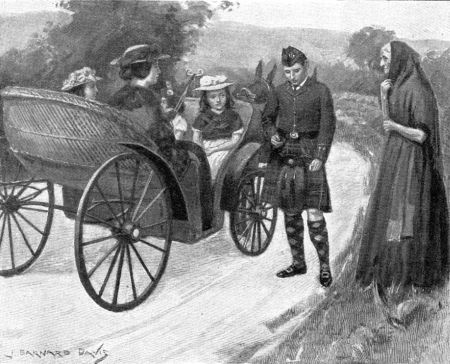
Tam hung his head in shame.
Scarcely a week passed that he did not recall the words of him we have called the Highland gentleman, when he said that the Queen did more for those in her service than they could ever do for her, in that she not only made men and women of them, but treated them more as gentlemen and ladies than as mere domestics. There were no servants in her employ, no matter how humble their sphere, but she knew them by name and had their welfare at heart; and if they served her well, she never lost sight of them, or forgot them—no, not even when the grave took them into its transitional embrace.
Jamison had had abundant opportunities to note and set these things down in his heart, but he was never so much impressed by her Majesty's deep regard for those who served her faithfully and well as when, one dripping autumn day, he was required to accompany her to the churchyard of a rural village, halfway betwixt London and Windsor—in which, a day or two before, the aged servant above referred to had been buried—in order that she might lay a wreath upon his grave. It bore the words, "In grateful remembrance of a devoted and faithful servant, V.R.," and as she bent down to place it with her own hand upon the grave a tear fell upon the flowers that outshone the brightest jewel of her crown.
By a Leading Temperance Advocate.
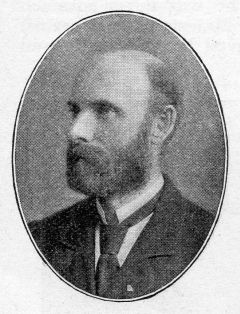
DR. J. J. RIDGE.
(Photo: J. Bacon, Newcastle-on-Tyne.)
The story of the Temperance Hospital in Hampstead Road forms one of the most interesting chapters in temperance history. When the experiment of treating accidents and disease without the administration of alcohol was first mooted, the idea was assailed with a storm of criticism in which the medical profession found a most active ally in the public Press. A quarter of a century has now elapsed since the first patient was received in the temporary premises in Gower Street, and although the medical staff have full permission, under certain regulations, to administer alcohol if deemed expedient, the last Report states that out of a total of 13,984 in-patients, alcohol has only been resorted to in twenty-five cases. The percentage of recoveries compares most favourably with the ordinary hospitals, and the cases include every variety of disease and accident. The present head of the medical staff is Dr. J. J. Ridge, who has been connected with the institution from the first. For many years it has been the custom of the United Kingdom Band of Hope Union to organise a Christmas collection in aid of the Temperance Hospital. The amount thus realised has reached many thousand pounds, and it is hoped that this year's collection will prove the best of the series. The body of evidence in favour of total abstinence which the Temperance Hospital has accumulated certainly entitles the institution to the cordial support of the temperance public.
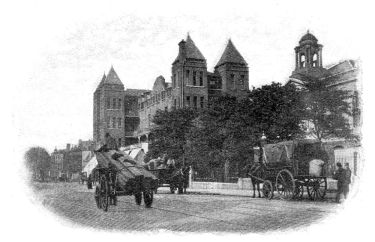
THE TEMPERANCE HOSPITAL, HAMPSTEAD ROAD, LONDON.
(Photo supplied by the Press Studio.)
Among the fixtures worth noting may be named the New Year's Meeting of the United Kingdom Band of Hope Union on Saturday, January 7th; the Annual Meeting of the London United Temperance Council, to be addressed by the Archbishop of Canterbury, on February 13th, in the Queen's Hall; a great Industrial Exhibition, promoted by the Hackney and East Middlesex Band of Hope Union, on April 10-13; Temperance Sunday for London Diocese April 23rd (St. George's Day, a grand opportunity for the clergy to strike a national note); and, as it is well to look ahead, a World's Temperance Convention to be held under the auspices of the National Temperance League in 1900.
It may be news to some of our readers that Dr. James A. H. Murray, the editor-in-chief of the monumental literary work which has been in progress for so many years, is an earnest total abstainer and a Vice-President of the National Temperance League. Dictionary-making[183] and total abstinence seem to run together. In William Ball's "Slight Memorials of Hannah More" is this remark: "I dined last week at the Bishop of Chester's. Dr. Johnson was there. In the middle of dinner I urged Dr. Johnson to take a little wine. He replied: 'I can't drink a little, child, therefore I never touch it. Abstinence is as easy to me as temperance would be difficult.'" It is rather curious to note that it is only within recent years that our dictionaries have taken any cognisance of the meaning which temperance people give to the word "pledge." More than this, in the early dictionaries the word was almost exclusively given up to the other side of the drink question. For instance, in Bailey's Dictionary (1736) we have the following definition of the word "pledged":—"Having drank by the recommendation of another."... "The custom of pledging in drinking was occasioned by the Danes, who, while they had the superiority in England, used to stab the English or cut their throats while they were drinking; and thereupon they requested of some sitter-by to be their pledge and security while they drank; so that 'I will pledge you' signifies 'I will be your security that you shall drink in safety.'"
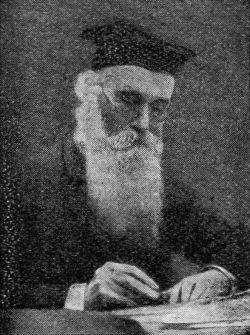
"DICTIONARY" MURRAY.
Contrast this with the definition given in the last edition of Webster's Dictionary:—
"A promise or agreement by which one binds one's self to do, or to refrain from doing something; especially a solemn promise in writing to refrain from using intoxicating liquors or other liquor; as to sign the pledge."
No doubt, when Dr. Murray reaches the letter "P," we shall have a definition even still more illuminating. The New English Dictionary viewed from a temperance standpoint would make a delightful study. Take, for instance, volume one, in which "Alcohol" has more than a column to itself, while "Ale" has two columns, "Beer" two and a half columns, and "Abstain," "Abstainer," and "Abstaining" are treated with a wealth of illustration and meaning derived from such authorities as Wyclif in 1382 down to J. W. Bardsley (the present Bishop of Carlisle) in 1867, who is pressed into the service in this form:—
"Abstaining.—Practising abstinence (from alcoholic beverages) 1867. J. W. Bardsley in 'Clerical Testimony to Total Abstinence' 30: 'The bride was the daughter of an abstaining clergyman.'"
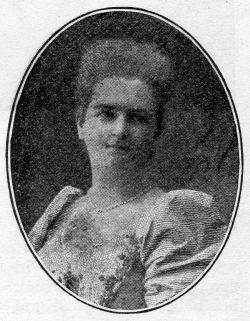
MADAME ANTOINETTE STERLING.
(Photo: Walery, Ltd., Regent Street, W.)
Now we will leave it to our fair readers to puzzle over until next month as to who the blushing bride was who is thus assured of immortality in the greatest Dictionary the world has ever seen.
"Example is better than precept," says the old adage, and there can be no doubt that the example of Madame Antoinette Sterling and Mrs. Mary Davies in the matter of total abstinence has been of the utmost value. It was at a reception given by Mr. and Mrs. Frederick Sherlock at Hackney, in 1892, to the Archbishop of Canterbury (then Bishop of London), that Madame Sterling, to the surprise of a delighted audience, volunteered "a few words." The gifted singer remarked that "she had been nearly all her life a total abstainer. When on long tours with members of her profession, it had been rather an aggravation to them to see, when they were pretty well prostrated, that she was almost or quite as fresh at the end of the journey as at the beginning. They also complained of the quality of the wine furnished to them, as well as of water. She took milk and cocoa, and also water, of which she did not complain, and scarcely missed one engagement in the seventeen years during which she had been before the public. She had never had a day's bad health, and had not suffered from those[184] aches and pains of which she had heard other people complaining continually." Like Madame Sterling, Mrs. Mary Davies has upon many occasions shown a deep and practical interest in philanthropic work.
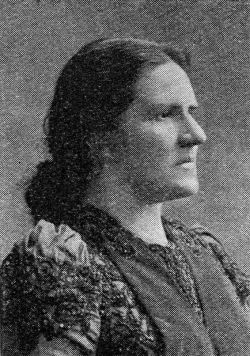
MRS. MARY DAVIES.
(Photo: H. S. Mendelssohn, Pembridge Crescent, W.)
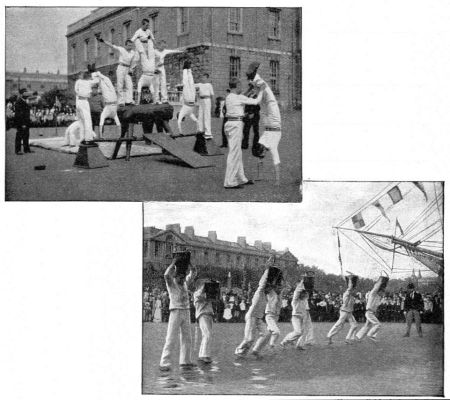
(Photo supplied by the Press Studio.)
MUSCULAR TRAINING AT THE NAVAL SCHOOL, GREENWICH.
(Photo supplied by the Press Studio.)
BUCKET-OF-WATER RACE AT THE NAVAL SCHOOL.
Possibly the most unique Band of Hope in the world is that which is held in the Royal Naval School, Greenwich. It was founded so far back as 1871, by Samuel Sims, an honoured agent of the National Temperance League, and upon his death, in 1892, was taken over by Mr. W. S. Campbell, as the League's representative. No pressure at all is put upon the lads to induce them to join the Band of Hope, but, as a matter of fact, most of the lads in the school readily do so, and the present membership is fully a thousand strong. Regular weekly meetings are held, and the annual gathering, which is held in the great gymnasium, is a most inspiriting spectacle. A visit to the Royal Naval School, if it should happen to be in recreation time, cannot fail to afford considerable satisfaction to those who like to see Young England at play. Every type of healthy pastime is encouraged in its turn, and these young abstainers have frequently shown that they are well able to hold their own. It is encouraging to know that the principles of total abstinence are not discarded when the lads pass out into the Royal Navy or Mercantile Marine, for every year large numbers of them are drafted into Miss Weston's well-known temperance society.
The appointment of a special Sunday for the preaching of sermons on temperance originated with the Church of England Temperance Society many years ago. Owing to various circumstances, it is not possible for the Church of England clergy to take one Sunday simultaneously for the whole country, but each diocesan Bishop makes choice of a day and issues a pastoral letter to his clergy, so that at one period of the year or another the whole country is covered, so far as the Church of England is concerned. The Nonconformist bodies have, however, for some years past, fixed upon the last Sunday in November for Temperance Sunday, and as we go to press we learn that this year special reference will be made to the importance of Sunday Closing.
December 18th.—The Captivity of Judah.
To read—Jer. lii. 1-11. Golden Text—Jer. xxix. 13.
This chapter describes the fate of Judah. Later kings were all wicked. Warnings of Jeremiah and other prophets all been in vain. Time has come for judgment. Captivity in Babylon, long foretold, now about to commence. Came about in reign of Zedekiah. The eleven verses of this lesson almost identical with Jer. xxxix. 1-10.
I. The King (1-3). His name. Originally Mattaniah, was son of good King Josiah and uncle of late King Jehoiachin. Jeremiah had prophesied of a future king (Jer. xxiii. 5-7) as the "Lord our righteousness." The king assumed that name, and was called Zedekiah.
His acts. "Did evil," but had not always been altogether evil. Had made covenant with nobles and priests to abolish slavery (xxxiv. 8-10). But his great wrong was breaking his solemn oath of allegiance to king of Babylon (2 Chron. xxxvi. 13). This looked upon as his crowning vice (Ezek. xvii. 8), for which God's anger was upon him (ver. 3).
Lesson. When thou vowest a vow defer not to pay it.
II. The Siege (4-7). City besieged for last time. Jews never forgot day it began. Was January—tenth day of their tenth month. Great mounds or (earth-works) outside walls to shoot burning arrows, etc.; houses outside thrown down (Jer. xxxiii. 4). Famine and pestilence soon ravaged crowded population inside.
The assault. City, after eighteen months, taken by assault at northern gate (B.C. 587). King and his family and royal guard escaped by passage between two walls (Jer. xxxix. 4), by royal gardens, down steep descent towards Jericho. There he was overtaken and made prisoner. His broken oath caused his destruction (Ezek. xvii. 20).
Lesson. Evil shall hunt the wicked to overtake him.
III. Babylon. He was taken to Babylon. His sons killed in his sight, then his eyes put out, bound with chains, kept in prison till death. Feeble in will, faithless in promise, judgment came upon him.
Lesson. 1. The word of the Lord standeth sure.
He who buys the truth makes a good bargain. Zedekiah dealt in falsehood and lost his throne. Esau sold his birthright for a basin of soup. Judas made a bad bargain when he sold his Lord for the price of a slave. Take heed to the thing that is right, for that alone shall bring peace at the last.
December 25th.—A Christmas Lesson.
To read—Hebrews i. 1-9. Golden Text—St. Luke ii. 11.
This letter written to the Hebrews, i.e. Christians of Jewish birth who clung to the priesthood and services of the Temple as well as to Christianity. St. Paul shows how far the Christian system was superior to and superseded the Jewish. The types and ceremonies of the Law fulfilled in Christ, whose birthday is kept at Christmas.
I. God's Revelation (1-2). Past. God revealed or unveiled Himself of old. This revelation inferior in three ways, viz. (1) It was given gradually, in portions, a part at a time. (2) Given in divers manners, under many figures and types. (3) Given by prophets, only human.
Present. Final revelation of God's truth—once for all given to the saints (Jude 3). Given by His Son—the Word of God (St. John i. 1, 2); heir of all things—God's agent in creation of the universe.
II. God's Son (3-9). Great in Himself. Has Divine glory—the outshining of the Father's glory. He is God's image, the counterpart of the Father. To see Christ is to see God (St. John xiv. 9).
Great in His work. (1) Upholder of the universe as well as its Creator. (2) Saviour. Came not only as prophet to reveal God's will, but to purge man's sin. This He did by Himself with His own blood (ix. 12, 14).
Greater than angels. In His person, His work. His exaltation to glory; testified by Scripture, e.g. Psalm ii. 3 tells of Christ's eternal Sonship—also referred to by St. Paul as fulfilled in His resurrection (Acts xiii. 33).
King over all. Christ also a King. Rules in righteousness (Psalm xlv. 6, 7); received throne as victor over His enemies—sin, death, and the devil (xii. 2). Raised high above all.
Lesson. Christ is King—honour Him; He is Saviour—love Him; He is God—fear Him. Kiss the Son, lest He be angry, and so ye perish. Blessed are all they that put their trust in Him.
A weaver, who had made an elaborate piece of tapestry, hung it upon the tenterhooks in his yard. That night it was stolen. A piece of tapestry was found by the police, which seemed to answer the description; but, as the pattern was not unlike that of other pieces, they wanted more definite proof. It was brought to the weaver's yard, and there the perforations in the fabric were found to correspond exactly to the tenterhooks. This was proof positive. In like manner, if we place the life and character of Christ against all the prophecies of Him in Scripture, they will be found to correspond exactly.
January 1st.—Christ the True Light.
To read—St. John i. 1-14. Golden Text—Ver. 4.
New Year—new course of lessons. This Gospel records the deeper spiritual truths of Christ's teaching, especially about His own Nature and Person. It sets Christ forth as God. St. John tells his object in writing a fourth Gospel in chap. xx. 31, which the class should read.
I. The Nature of Christ (1-3). Eternal. In the beginning, not of the world, but before all creation, from everlasting. Divine Word. Christ is the expression of the mind of God. Came to reveal God to man (xv. 15). Living Person. The Word not a mere attribute or power of God but a distinct Person. "With God" from everlasting. Not inferior to the Father, but very God Himself. Creator. As well as Saviour and Governor of the world (read Col. i. 16, 17; Heb. i. 2).
II. The Office of Christ (4-13). Source of Life. As very God He had life in Himself, which He poured forth on His creation (vv. 25, 26; xvii. 2). Source of light. The life from Son of God is cause of man's inward spiritual light by which he is saved. Himself the light. World was in spiritual darkness at Christ's coming. Giver of light. No man has light in himself, however great his natural powers. All true light is from Christ.
Rejected. By His own. The world He made knew not its Creator (1 Cor. i. 21). The nation He chose to be His own special people (Deut. vii. 6) received Him not.
Received. By a few—both Jews and Gentiles; such as Nicodemus the ruler (iii. 1, 2), the disciples from Galilee (ii. 11), and others. How did they receive Him? By believing in Him. This faith, itself the gift of God, rewarded by further privilege of becoming God's sons—born into God's family by a new and spiritual birth (iii. 3).
III. The Glory of Christ (14). Word was made flesh by taking to Himself man's human nature. He dwelt (literally "pitched His tent") with men, full of mercy to heal bodies and souls, full of God's truth to teach.
Lessons. 1. Hold fast the Christian faith. Jesus Christ one for ever with the Father. God—eternal, glorious, Creator, Giver of light and life to the soul—yet Man, like one of us.
2. Live the Christian life. Jesus is our example, that we should follow His steps.
A little girl in a London slum won a prize at a flower-show. Her flower was grown in a broken teapot in a back attic. When asked how she managed to grow the beautiful flower, she said her success came from always keeping the plant in the only corner of the room ever favoured by a sunbeam. Only by walking in the light and sight of God can Christians truly grow and bear fruit.
January 8th.—Christ's first Disciples.
To read—St. John i. 35-46. Golden Text—Ver. 36.
Christ now thirty years old; has been baptised and received special outpouring of Holy Ghost (ver. 33), and also been tempted in the wilderness (St. Matt. iv. 1). Is now ready for His public work and ministry. Now begins to win disciples.
I. The first two Disciples (35-40). Heard of Him. Picture Christ walking near the Jordan. St. John, who had baptised Him, points Him out to his followers. Describes Him: this the Lamb of God to Whom all the sacrifices pointed; the innocent lamb slain told of the death of the spotless Son of God for man's sin. His words went home.
Followed Him. Who were they? Andrew, Simon Peter's brother, and probably St. John, writer of the Gospel, brother of James. Why did they follow? To learn more of Him. Had been baptised with baptism of repentance. Sense of sin led them to seek the Saviour. Christ knew their thoughts, encouraged them to learn more of Him (St. Matt. xi. 28, 29).
II. The third Disciple (41, 42). The two friends separate the next day, each in search of his brother. Andrew soon finds his—eagerly tells the news. They have found the long-expected Messiah, the Anointed of God. Brings Simon to Christ. No greater proof possible of having really found Christ than bringing another to Him. Christ looks with eager and searching eye at Simon—reads his very heart, sees his longing after truth; gives him a new name, Cephas (Hebrew) or Peter (Greek), meaning "a rock" or "stone." What did this signify? His bold and determined character, strong in the faith (St. Matt. xvi. 16), eager in defence of Christ (xviii. 10), and, after his fall and forgiveness, strong in love (xxi. 15).
III. The fourth Disciple (43, 44). Philip of Bethsaida. Must have heard his friends talking of Christ. Probably stirred in his heart. Christ found him, as He afterwards found Zacchæus St. (Luke xix. 5). His mission to seek as well as to save. Happy they who obey Christ's call and follow Him.
IV. The fifth Disciple (45, 46). Philip soon shows marks of discipleship. He finds Nathanael. Tells him how Christ fulfilled prophecies, such as of a "prophet" like unto Moses, a "king" whose name should be "the Lord our righteousness" (Jer. xxiii. 5, 6). Nathanael asks in honest doubt if it can be possible for the Messiah to come from despised Nazareth. Philip did not argue, but bade him "Come and see"—the best cure for all doubts.
Lessons. From the Baptist: The dying Saviour the greatest magnet for drawing souls.
From Andrew: Show religion first at home.
From Simon: Taste and see how gracious the Lord is.
From Philip: Faith cometh by hearing, and hearing by the Word of God.
From Nathanael: Hearken unto me, and I will teach you the fear of the Lord.
A traveller lost in the snow on the Alps was rescued by one of the famous dogs of St. Bernard. When restored to consciousness his first words were, "There's another." The monks to whom the dogs belonged continued their search, and "the other" was found and saved. "Are you saved?" Is there not another whom you can rescue from sin and bring to the life of God?


Last month we published full particulars of our scheme to provide Christmas Stockings for the many poor and friendless little ones who are not on Santa Claus's visiting list, and we appeal to our readers for their hearty practical co-operation in this work. Each stocking will contain wholesome goodies, in the shape of cake and sweets, in addition to an unbreakable toy and a Christmas card. The Proprietors of The Quiver have headed the subscription list with a donation of £25, which is sufficient to provide the contents of
FIVE HUNDRED CHRISTMAS STOCKINGS FOR
POOR AND FRIENDLESS CHILDREN,
a sum of one shilling being sufficient to furnish a stocking and pay the postage. But, as we can profitably distribute thousands of such presents, we confidently look to all lovers of the children to lend their generous aid, in order that as many as possible of the destitute little mites may have their Christmas brightened by such a welcome gift. We shall also be glad to receive recommendations from our readers of suitable cases for the receipt of the stockings, and for this purpose the special application form to be found in our Extra Christmas Number ("Christmas Arrows") should be used. As the time is short, contributions for the Christmas Stocking Fund should be sent at once to the Editor of The Quiver, La Belle Sauvage, London, E.C., and all amounts of one shilling and upwards will be thankfully acknowledged in our pages.
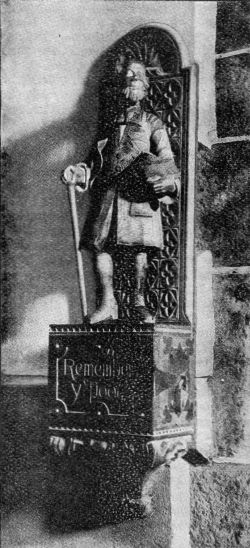
CURIOUS ALMS-BOX IN PINHOE CHURCH.
In the interesting parish church of Pinhoe, near Exeter, appears a very curious alms-box surmounted by the figure of a man who seems, from his costume and general character, to date from the period of James I. He holds two books in his hand—representing most probably Bible and Prayer Book—one of which bears the inscription, "Ye Poor Man of Pinhoo, 1700," but from information with which the vicar of the parish, the Rev. Frederick W. Pulling, has kindly supplied us, it appears that the books were added in 1879-80, when the church was restored. Previously the figure held a small flimsy box in front of him. He was, however, placed on the present handsome oak box bearing the inscription, "Remember[188] ye Poor," and the old flimsy box was removed. The present box was constructed from some very ancient timber from the roof of Salisbury Cathedral, when under repair. What the figure was originally intended to represent—whether a beadle, the dispenser of charities, or a relieving officer—is not known. Curiously enough, the parish records are quite silent as to the figure, and when, some time since, it was repaired it was sent to the eminent antiquary and ecclesiologist, the Rev. Mackenzie Walcott, who said he had seen only two such figures before. The wooden backing is of Jacobean style, and was designed by the architect in 1879 to strengthen the whole structure.
After the marvellous achievements in his two Chinese campaigns, which were sufficient to have made the reputations of a dozen ordinary colonels, Gordon came back to England in 1865 as poor as when he left home. During the next six years, which he spent in Gravesend as an engineer, the future keeper of Khartoum devoted a large portion of his leisure to visiting the sick and to teaching and training many of the ragged and neglected boys of the rough neighbourhood. So truly did these poor lads love their colonel that it was not uncommon to see chalked up on the walls the singular inscription, "God bless the Kernel." Their gratitude was apparently stronger than their orthography. When Englishmen reflect how Gordon placed his Divine Master first in every enterprise of his life, they must feel that no institution intended to honour the dead hero at Khartoum can be a worthy memorial which is not grounded on the rock of Christianity.
Christmas is pre-eminently the season of universal good-will, and the custom of conveying seasonable greetings by means of the attractive Christmas card is every year becoming more general. Amongst the publishers of these mementoes Messrs. Raphael Tuck and Sons take front rank, and the specimen box of cards, calendars, story-books, and illustrated texts, recently received from them, affords ample proof that the variety and artistic excellence which have always characterised their productions are well maintained this year. Some of the cards are veritable works of art, and deserve more than the temporary appreciation usually accorded to such; but the palm for novelty, both in design and treatment, must be accorded to the calendars, many of which are most original in conception, and all are daintily and tastefully produced.—For years past we have been accustomed to look for a Christmas book from Mr. Andrew Lang, and this season he has edited an edition of "The Arabian Nights Entertainments," which Messrs. Longmans have published in a charming cover, and with a number of clever illustrations by Mr. H. J. Ford.—Another suitable gift-book for children is "His Big Opportunity" (Hodder and Stoughton), a brightly written story by Amy Le Feuvre; whilst for young people what more inspiriting and interesting work could be presented to them than the life-story of the pioneer missionary, "Mackay of Uganda," of whose biography a new illustrated edition has just been issued by the same publishers.—We have also received the current yearly volumes of our contemporaries, Good Words and The Sunday Magazine (Isbister & Co.). These would both form valuable additions to any Sunday-school library, and are also admirably adapted for use as prizes or presents.
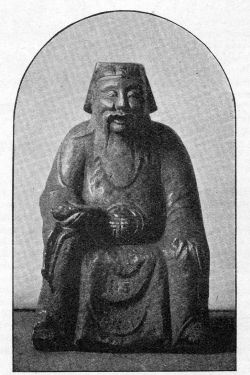
(From a Photograph.)
THE LAUGHING GOD OF CHINA.
An Irishman being bound over to keep the peace against all the Queen's subjects, said, "Then Heaven help the first foreigner I meet!" We are reminded of this when we see people civility itself to a good servant they are afraid of losing, or to the strongest-willed person in their home, and then relieving their pent-up feelings by being rude to the rest of the family.
"Have you any gods around here?" inquired an English traveller in rural China. "Oh, yes," replied a venerable Celestial; "the three Pure Ones, the God of the Fields, and the Goddess of Mercy." "My old friend, I am afraid your gods are not a few." "Foreign teacher," said the old man, "verily, verily, our gods are ten thousand and thousands of thousands." Some are of stone, others of wood,[189] clay, or bronze. One may be purchased for a farthing, another will cost £200. The Laughing God in our illustration is a representation in coarse pottery of Quantecong, supposed to be the first emperor. There are laughing Buddhas for sale, and some few images of beneficent mien; but the great horde are intended to inspire awe or terror. The second illustration is a well-executed terra-cotta figure of a deified warrior. The drawn sword and beard are similar to those of Kwante, the God of War, regarded as the head of the military department in China. In 1,600 state temples dedicated to him the mandarins worship once a month, and in thousands of smaller temples he is honoured with sacrifices of sheep and oxen. His worshippers believe that he was a general, who just about the time that the Prince of Peace came to this world in great humility made the enemies of China to tremble. The elevation or manufacture of gods is a simple affair. The keeper of an idol shop collects the heads, limbs, and trunk that he has moulded out of mud, unites them in one ill-proportioned figure, slips a frog, snake, lizard, or centipede into the hole in the back, and the idol is ready for dedication and worship! The calm, colossal Buddha at Peking is seventy feet high, but it can only witness to a blind feeling after God.
The romance of New Testament manuscripts is again enlarged; this time by the discovery of a papyrus fragment containing a part of the Gospel according to St. Matthew. The precious sheet was found in the Libyan desert, about one hundred and twenty miles south of Cairo, by Messrs. Grenfell and Hunt, the discoverers of the Logia. It is thought that this fragment may be older by a hundred years than any other manuscript of the New Testament hitherto available. Its value, had it been a whole book instead of two leaves, would have been priceless. Even so, it is of singular interest. Its actual history, of course, is beyond discovery, but its appearance amongst the world of scholars reminds us of the strangely varied channels through which Greek manuscripts of the New Testament have come down to us. There is the romantic story of the discovery, in a monastery on Mount Sinai, of the priceless manuscript known as the Codex Sinaiticus. There is the scarcely less valuable Codex Alexandrinus which the British Museum now guards; that came to England as a gift to King Charles I. from a Patriarch of Constantinople. There is the great manuscript which is one of the glories of the Vatican Library at Rome, where it is believed to have been ever since that library was founded. There is the Codex Ephraemi at Paris, its ancient writing partly legible beneath a much later work written over it—a manuscript which once belonged to Catherine de Medicis. There is another palimpsest brought to England from a convent in the Nubian desert. There is the manuscript presented by Laud to the Bodleian, and supposed to have been used by the Venerable Bede. In truth, the history of these treasures is full of romance, and it is but fitting that new discoveries should furnish other examples of the strange ways in which the text of the Holy Scriptures in various parts and forms has been preserved for us.
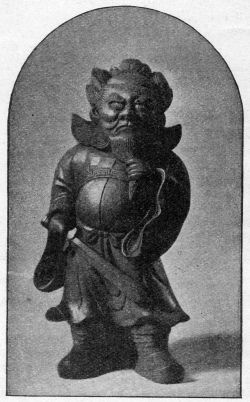
(From a Photograph.)
A GOD OF WAR.
While nothing can be so distressing to a clergyman, whose duty it is to solemnise marriages, as irreverence or flippancy, he can hardly fail to be amused, if many of his people are poor and his area is wide, at the occasional results of a genuine ignorance, or a legitimate nervousness. A well-known church in Central London can furnish several singular and recent experiences. It is not often that either of the contracting parties comes furnished with a prayer-book, but on a certain occasion the bride, a rather strong-minded-looking lady, did so, and insisted on holding it sternly and steadily under the nose of her future spouse. In repeating the passage in which "cherish" occurs, a bridegroom, in a faltering voice, expressed his willingness "to love and to 'perish.'" "Oh, sir, I do feel that nervous!" once pleaded another embarrassed swain in the middle of the service. A widower, who was extremely awkward and stupid in making the responses after the minister, apologised by saying, "Really, sir, it is so long since I was married last that I forget"! Another bridegroom, though middle-aged, seemed somewhat diffident with regard to his responsibilities, and answered to the inquiry,[190] "Wilt thou love, comfort, honour, etc.?" "To the best of my abilities I will." A year or two ago, the roof of the particular church of which we are thinking was being renovated, and the interior was a maze of ladders. Under these a superstitious bride earnestly begged not to be compelled to go, so she was considerately conducted to the chancel by a circuitous route. There was a wedding last year at which a tiny bridesmaid made her appearance. As he had married her parents about six summers previously, the clergyman thought he might venture to take her by the arm and to place her in her proper position behind the bride. Considerably to his surprise, the small damsel hit out at him in a most workmanlike manner straight from the shoulder, and the edifice resounded with a terrific yell of defiance, "Me won't! Me "WON'T!"
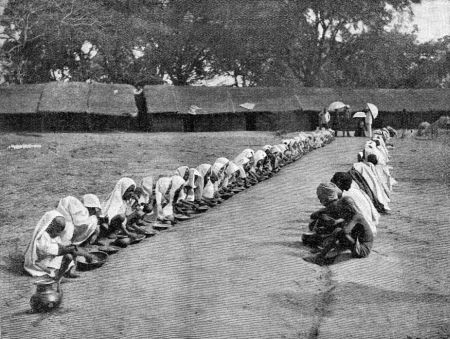
(Photo supplied by the Church Missionary Society.)
INDIAN ORPHANS AT A BREAKFAST SUPPLIED BY MISSIONARIES.
(A scene during the recent famine.)
One of the most interesting biographies of the season is that of Bishop Walsham How, which has just been issued by Messrs. Isbister, prefaced by an excellent portrait of the late prelate. The Bishop was principally known by his work in the East of London, where he was greatly loved by clergy and parishioners alike, and many excellent stories are related apropos of his cheeriness and tolerant good nature in dealing with the mixed elements of his crowded diocese. The memoir seems full and complete, as, indeed, it should be, the biographer being Mr. Frederick How (a son of the late Bishop), who had access to all the private memoranda of his father, and was naturally acquainted with every incident of interest concerning him. From the same publishers comes an excellent work by our contributor, Dean Farrar, on "Great Books," in which he critically reviews the life and works of Bunyan, Shakespeare, Dante, Milton, and other "master-spirits." Though admittedly written for young people, the volume contains much that is valuable and interesting to older readers. Messrs. Isbister have also recently issued a volume of sermons by the Rev. Stopford A. Brooke, under the title "The Gospel of Joy." Whilst we do not endorse all the views expressed by the author, yet at the same time we are bound to confess that Mr. Brooke's eloquent addresses teem with happy and suggestive thoughts.—A daintily produced volume reaches us from the Scientific Press in the form of Mr. J. T. Woolrych Perowne's account of his recent journey in Russian Central Asia, published under the comprehensive title "Russian Hosts and English Guests in Central[191] Asia." In many respects the journey described was quite unique, and the interest is considerably increased by the number and variety of the excellent illustrations which are scattered throughout the book.—"Table-talk with Young Men" (Hodder and Stoughton) is the title which the Rev. W. J. Dawson gives to his recently published series of "pen-conversations" with young men. Mr. Dawson's practical, straightforward and cultured "talk" on such diverse subjects as "The Art of Living," "Christianity and Progress," "Civic Responsibility," etc., is not only brilliant but highly instructive, and the book is one which should find a place on every young man's bookshelf, for it will richly repay careful and constant perusal.—We have also to acknowledge the receipt of "Comfort and Counsel" (Hodder and Stoughton), containing quotations from the writings of Elizabeth Rundle Charles for every day in the year; "The Children's Year-Book of Prayer and Praise" (Longmans), compiled by C. M. Whishaw; a useful and informing little volume on "Diet and Food" (J. and A. Churchill), by Dr. Alexander Haig; "A Cluster of Camphire" (Passmore and Alabaster), containing short, sympathetic addresses by Mrs. C. H. Spurgeon to those who are sick and sorrowful; and "The Daily Homily" (Morgan and Scott), a series of brief, pregnant discourses on the books of the Bible from 1 Samuel to Job, by the Rev. F. B. Meyer.
Samson's riddle is an everlasting proverb. Out of the devouring famine that last year devastated India blessings have already come to many provinces. A conquered race find it hard to love and trust their rulers, but in their trouble dwellers in the famine districts saw the practical side of Christianity. In the midst of universal rejoicing England was moved with compassion, and provided food for the starving. Government, in many instances, entrusted missionaries with the distribution of grain. The Indian people are slow to act and strong to endure. Thousands perished because they could not or would not realise that relief was within reach. Parents gave their last morsels to their children, and then lay down to die. Orphanages overflowed, and new ones had to be erected. Where an open shed and light meals of milk, rice, and curry meet the ideas of home and housekeeping, this is easier than it sounds. After a famine the number of Christian adherents to missions is always multiplied, and the supply of pupils creates new demand for teachers. It must be acknowledged that the taunt of being "rice-Christians" is sometimes justified, though there is little doubt that genuine gratitude to God, who moved His servants to help them, has caused numbers to turn to Him.
This piece of land is close to the Holy City, and now belongs to the Society for the Relief of Persecuted Jews. When the necessary excavation for building was begun, Abraham's Vineyard revealed signs of former glory and prosperity. Tesselated pavement, vats, baths, and a columbarium hewn out of the rock, showed that it had once belonged to a householder with taste for luxury as well as an eye for exquisite scenery. The baths and vats have been converted into cisterns for rain-water, and the place has become the scene of industry. The earth, in past years again and again reddened by battles, now yields peaceful harvests of grain. All the Jewish refugees are not, however, cultivators. Soap-making from olive oil and alkali grown on the Jordan Plain, glue-making, stone-dressing, quarrying, are industries which offer many of them an honest living. The idea of the founders of this society was "to give relief and employment to the Jews, especially in Jerusalem, until they are able to found colonies on their own account." The experiment of Abraham's Vineyard has succeeded, and the Jews have carried the work farther, as the trade in Jaffa oranges and olive-wood ware testify.
"Christmas Arrows" (the Extra Christmas Number of The Quiver) is published simultaneously with this part, and contains a complete one-volume story by M. H. Cornwall Legh, entitled "The Steep Ascent," copiously illustrated by Frank Craig. In addition will be found a seasonable article by the Rev. Dr. Preston, on "Christmas Chimes from Jerusalem" (illustrated by Mark Zangwill); a contribution by the Rev. Canon McCormick entitled "Christian Hospitality"; and a long fairy-parable by E. H. Strain which bears the title "The Star Ruby," and is illustrated by H. R. Millar. "Christmas Arrows" also contains full particulars and conditions of our scheme for providing Christmas Stockings for poor and friendless children, as well as the Voting Form which any reader is at liberty to use to recommend suitable cases for the receipt of our Christmas gift.
The Special Silver Medal and Presentation Bible offered for the longest known Sunday-school service in the county of Leicester (for which applications were invited up to October 31st) have been gained by
Miss Anne Harrison,
42, Humberstone Gate,
Leicester.
who has distinguished herself by fifty-eight years' service in Harvey Lane Baptist Chapel, Leicester.
As already announced, the next territorial county for which claims are invited for the Silver Medal is
and applications, on the special form, must be received on or before November 30th, 1898. We may add that Wiltshire is the following county selected, the date-limit for claims in that case being December 31st, 1898. This county, in its turn, will be followed by Durham, for which the date will be one month later—viz. January 31st, 1899.
The names of members recently enrolled will be found in our advertisement pages.
For many years past our readers have generously taken the responsibility of maintaining a waif at Dr. Barnardo's Homes, and another at Miss Sharman's Orphanage in Southwark; but, as the present waifs are now growing up, and will soon be out in the world, the time has come for another selection. For this purpose, we have obtained particulars of eligible cases, which we submit to our readers, and, as we look to them for a continuance of their kindly help in supporting The Quiver Waifs, we feel that they would prefer to choose the new little ones who are to be so known. We would, therefore, request our readers to send a post-card (addressed to The Editor of The Quiver, La Belle Sauvage, London, E.C.), stating for which waif in each of the two sets they desire to vote, and the children with the highest number of votes will be elected. The post-cards should reach the Editor not later than December 31st, 1898. It should be particularly understood that this course will imply no pecuniary obligation whatever on the part of the voters, as we shall rely solely upon the voluntary contributions of our readers to furnish the total requisite sum for the maintenance of the waifs, which amounts to £31 per year. All donations will be acknowledged in The Quiver month by month.
I. For Dr. Barnardo's Homes (one vote):—
Albert Le Vasseur.—Eight years of age—mother left a widow with ten children—totally unable to support them all—when discovered there was no food or money in the house.
Charles Salt.—Seven years of age—mother a "drunken and disreputable tramp"—father little better—parents without a home and constantly ill-treating the child.
John Harrison.—Seven years of age—found in streets begging in ragged condition—father dead—mother disreputable—John somewhat lame in walk, owing to injury to the right knee in infancy.
II. For Miss Sharman's Orphanage (one vote):—
Rose Heelis.—Aged two years—was born shortly after her father's death—mother has died of consumption—promises to grow into a very nice child, and is full of life and spirits.
Ethel Robinson.—Aged six years—father killed by an accident—mother in lunatic asylum—relatives too poor to help.
Lily Pavitt.—Aged ten years—mother dead—father deserted children—an aunt took the child, but was unable to support her.
The following is a list of contributions received from October 1st up to and including October 31st, 1898. Subscriptions received after this date will be acknowledged next month:—
For "The Quiver" Waifs' Fund: A Glasgow Mother (101st donation), 1s.; J. J. E. (131st donation), 5s.; R. S., Crouch End (7th donation), 5s.; E. M. B., Jedburgh, 3s.; R. Dendy, Eastbourne, 3s.; Anon., Alford, 1s.
For "The Quiver" Christmas Stocking Fund: Jessie, Agnes, and Cyril, 2s. 6d.; M. T., 5s.
For The Ragged School Union: R. H. B., 2s. 6d.
For The Indian Leper Mission Fund: A Thank-Offering, 1s.
For Dr. Barnardo's Homes: An Irish Girl, 13s. Also 7s. 6d. from Diomedes sent direct.
For St. Giles Christian Mission: Thank-Offering, 1s.
(BASED ON THE INTERNATIONAL SCRIPTURE LESSONS.)
13. What was the great sin of which Zedekiah, king of Judah, was guilty and for which he was punished?
14. In what way was Zedekiah punished?
15. What prophecy was thereby fulfilled?
16. In what way does the writer of the Epistle to the Hebrews contrast the revelation of God to mankind under the old dispensation with that of the new?
17. Quote a text which shows the relationship of the angels to the human race.
18. What is the special characteristic of the Gospel of St. John?
19. Quote text in which St. John asserts the truth of the Incarnation of our Lord Jesus Christ.
20. What reference to St. John the Baptist was made by the last of the Old Testament prophets?
21. It is said of our Lord, "He came unto His own, and His own received Him not." Quote passage from the Old Testament which shows that this passage refers to the Jewish people.
22. From what circumstance should we gather that Nathanael was a diligent student of the Old Testament?
23. In what words did our Lord show forth His divinity in speaking to Nathanael?
24. In what way did St. John the Baptist point out to his disciples that Jesus was the Messiah?
1. Manasseh defiled the Temple at Jerusalem by setting up an idol therein (2 Chron. xxxiii. 7).
2. 2 Chron. xxxiii. 14.
3. Manasseh, having been reinstated in his kingdom by the Assyrians, gave up his idolatry and did all he could to restore the worship of God in the land (2 Chron. xxxiii. 14-17).
4. Prov. iv. 14, 17.
5. Prov. iv. 18.
6. In the reign of Josiah the king sent to Huldah the prophetess to inquire as to God's will concerning the people (2 Kings xxii. 14-20).
7. The copy of the Law which Moses had written was found (2 Kings xxii. 8; 2 Chron. xxxiv. 14).
8. In the reign of Amon, king of Judah, we are told the people worshipped the "sun, moon, and stars, and all the host of heaven" (2 Kings xxiii. 5).
9. In the reign of Josiah, who burnt men's bones on the altar at Bethel (2 Kings xxiii. 15, 16; 1 Kings xiii. 2).
10. Jehoiakim threw on the fire the roll on which Jeremiah had written at God's command a warning to the king and his people (Jer. xxxvi. 23).
11. Jer. xxii. 13, 14; 2 Kings xxiv. 4.
12. Jehoiakim was bound in fetters to carry him to Babylon, but was slain at Jerusalem and his dead body cast outside the city (2 Chron. xxxvi. 6; Jer. xxii. 19).
Minor typographical errors have been corrected without note. Irregularities and inconsistencies in the text have been retained as printed.
Missing page numbers are page numbers that were not shown in the original text.
The illustrations have been moved so that they do not break up paragraphs.
Mismatched quotes are not fixed if it's not sufficiently clear where the missing quote should be placed.
The cover for the eBook version of this book was created by the transcriber and is placed in the public domain.